Implications of Quality Assurance in Higher Education
VerifiedAdded on 2020/10/17
|35
|10698
|4493
Assignment
AI Summary
The provided document is a compilation of research papers and articles on quality assurance in higher education. It discusses the implications of quality assurance on curriculum design, student learning, and evaluation methods. The assignment also touches upon the use of technology in quality assurance, self-assessment, and outcome-based approaches. Additionally, it includes references to relevant studies and publications on the topic.
Contribute Materials
Your contribution can guide someone’s learning journey. Share your
documents today.
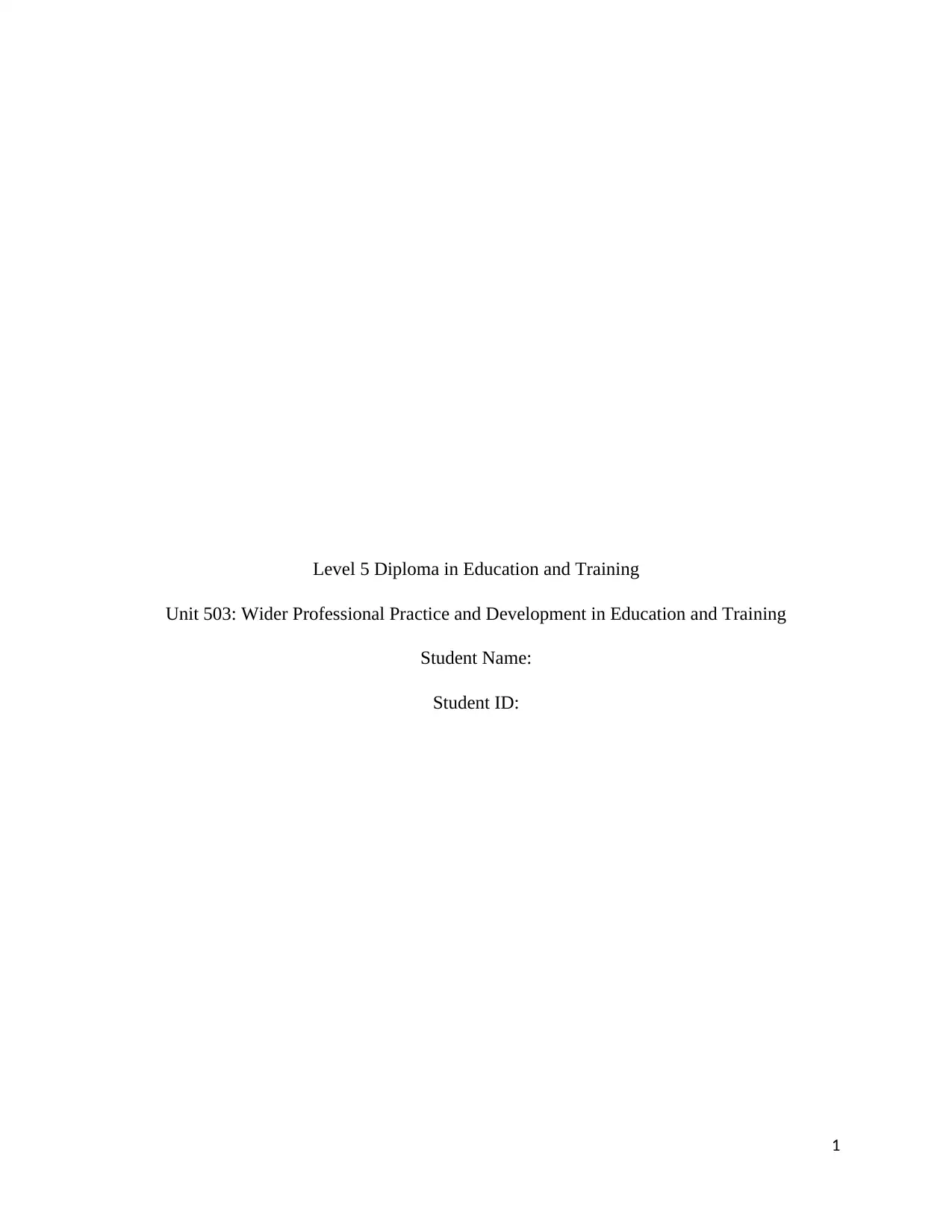
Level 5 Diploma in Education and Training
Unit 503: Wider Professional Practice and Development in Education and Training
Student Name:
Student ID:
1
Unit 503: Wider Professional Practice and Development in Education and Training
Student Name:
Student ID:
1
Secure Best Marks with AI Grader
Need help grading? Try our AI Grader for instant feedback on your assignments.
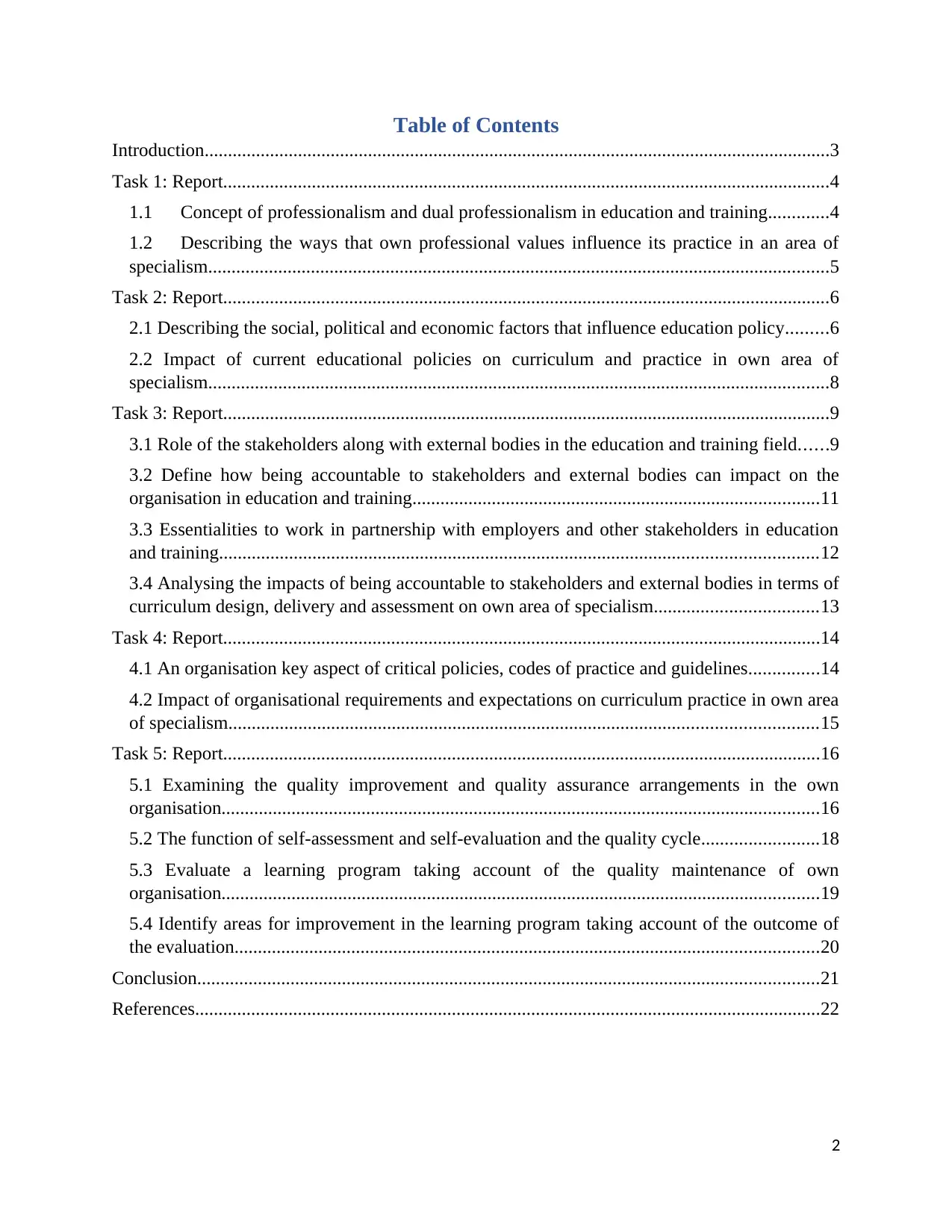
Table of Contents
Introduction......................................................................................................................................3
Task 1: Report..................................................................................................................................4
1.1 Concept of professionalism and dual professionalism in education and training.............4
1.2 Describing the ways that own professional values influence its practice in an area of
specialism.....................................................................................................................................5
Task 2: Report..................................................................................................................................6
2.1 Describing the social, political and economic factors that influence education policy.........6
2.2 Impact of current educational policies on curriculum and practice in own area of
specialism.....................................................................................................................................8
Task 3: Report..................................................................................................................................9
3.1 Role of the stakeholders along with external bodies in the education and training field......9
3.2 Define how being accountable to stakeholders and external bodies can impact on the
organisation in education and training.......................................................................................11
3.3 Essentialities to work in partnership with employers and other stakeholders in education
and training................................................................................................................................12
3.4 Analysing the impacts of being accountable to stakeholders and external bodies in terms of
curriculum design, delivery and assessment on own area of specialism...................................13
Task 4: Report................................................................................................................................14
4.1 An organisation key aspect of critical policies, codes of practice and guidelines...............14
4.2 Impact of organisational requirements and expectations on curriculum practice in own area
of specialism..............................................................................................................................15
Task 5: Report................................................................................................................................16
5.1 Examining the quality improvement and quality assurance arrangements in the own
organisation................................................................................................................................16
5.2 The function of self-assessment and self-evaluation and the quality cycle.........................18
5.3 Evaluate a learning program taking account of the quality maintenance of own
organisation................................................................................................................................19
5.4 Identify areas for improvement in the learning program taking account of the outcome of
the evaluation.............................................................................................................................20
Conclusion.....................................................................................................................................21
References......................................................................................................................................22
2
Introduction......................................................................................................................................3
Task 1: Report..................................................................................................................................4
1.1 Concept of professionalism and dual professionalism in education and training.............4
1.2 Describing the ways that own professional values influence its practice in an area of
specialism.....................................................................................................................................5
Task 2: Report..................................................................................................................................6
2.1 Describing the social, political and economic factors that influence education policy.........6
2.2 Impact of current educational policies on curriculum and practice in own area of
specialism.....................................................................................................................................8
Task 3: Report..................................................................................................................................9
3.1 Role of the stakeholders along with external bodies in the education and training field......9
3.2 Define how being accountable to stakeholders and external bodies can impact on the
organisation in education and training.......................................................................................11
3.3 Essentialities to work in partnership with employers and other stakeholders in education
and training................................................................................................................................12
3.4 Analysing the impacts of being accountable to stakeholders and external bodies in terms of
curriculum design, delivery and assessment on own area of specialism...................................13
Task 4: Report................................................................................................................................14
4.1 An organisation key aspect of critical policies, codes of practice and guidelines...............14
4.2 Impact of organisational requirements and expectations on curriculum practice in own area
of specialism..............................................................................................................................15
Task 5: Report................................................................................................................................16
5.1 Examining the quality improvement and quality assurance arrangements in the own
organisation................................................................................................................................16
5.2 The function of self-assessment and self-evaluation and the quality cycle.........................18
5.3 Evaluate a learning program taking account of the quality maintenance of own
organisation................................................................................................................................19
5.4 Identify areas for improvement in the learning program taking account of the outcome of
the evaluation.............................................................................................................................20
Conclusion.....................................................................................................................................21
References......................................................................................................................................22
2
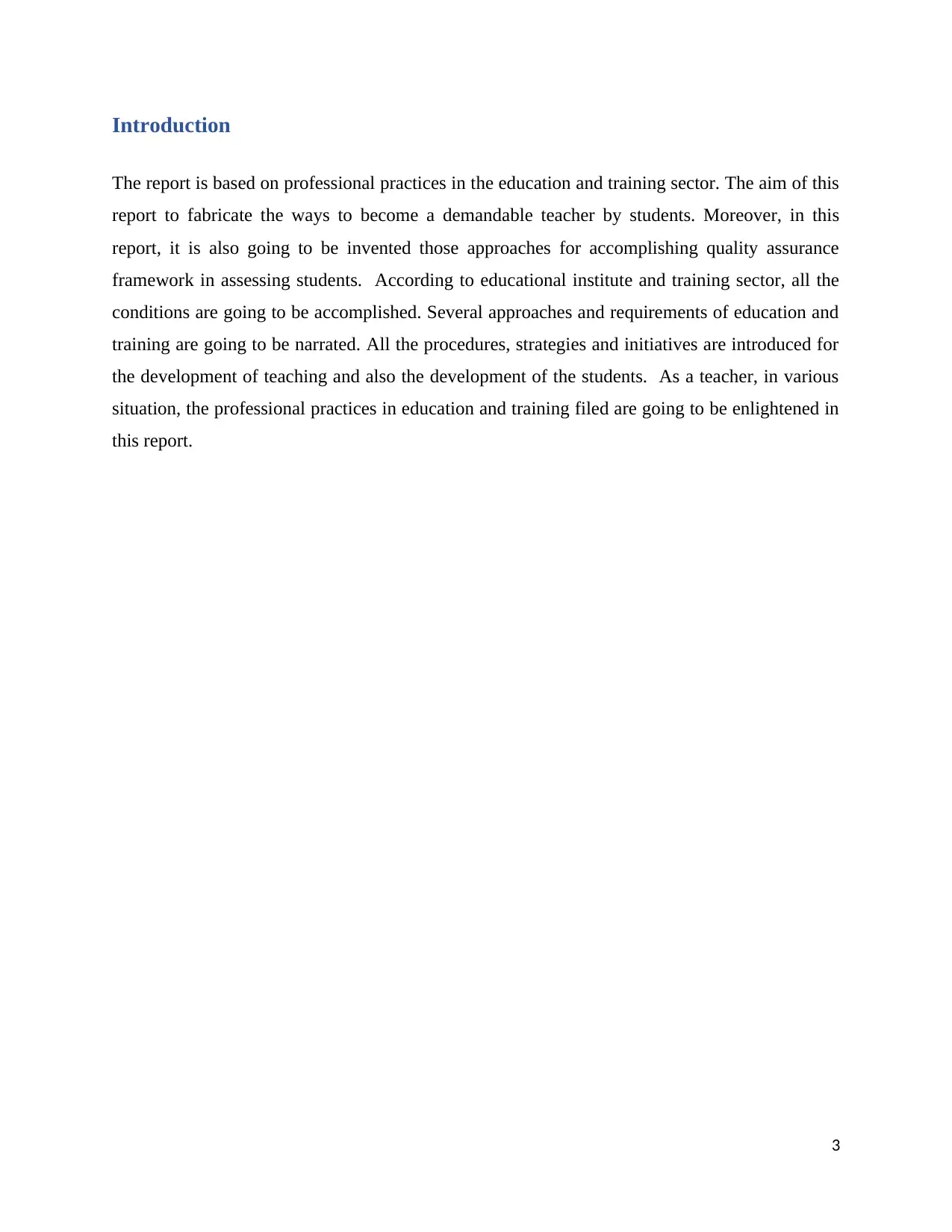
Introduction
The report is based on professional practices in the education and training sector. The aim of this
report to fabricate the ways to become a demandable teacher by students. Moreover, in this
report, it is also going to be invented those approaches for accomplishing quality assurance
framework in assessing students. According to educational institute and training sector, all the
conditions are going to be accomplished. Several approaches and requirements of education and
training are going to be narrated. All the procedures, strategies and initiatives are introduced for
the development of teaching and also the development of the students. As a teacher, in various
situation, the professional practices in education and training filed are going to be enlightened in
this report.
3
The report is based on professional practices in the education and training sector. The aim of this
report to fabricate the ways to become a demandable teacher by students. Moreover, in this
report, it is also going to be invented those approaches for accomplishing quality assurance
framework in assessing students. According to educational institute and training sector, all the
conditions are going to be accomplished. Several approaches and requirements of education and
training are going to be narrated. All the procedures, strategies and initiatives are introduced for
the development of teaching and also the development of the students. As a teacher, in various
situation, the professional practices in education and training filed are going to be enlightened in
this report.
3
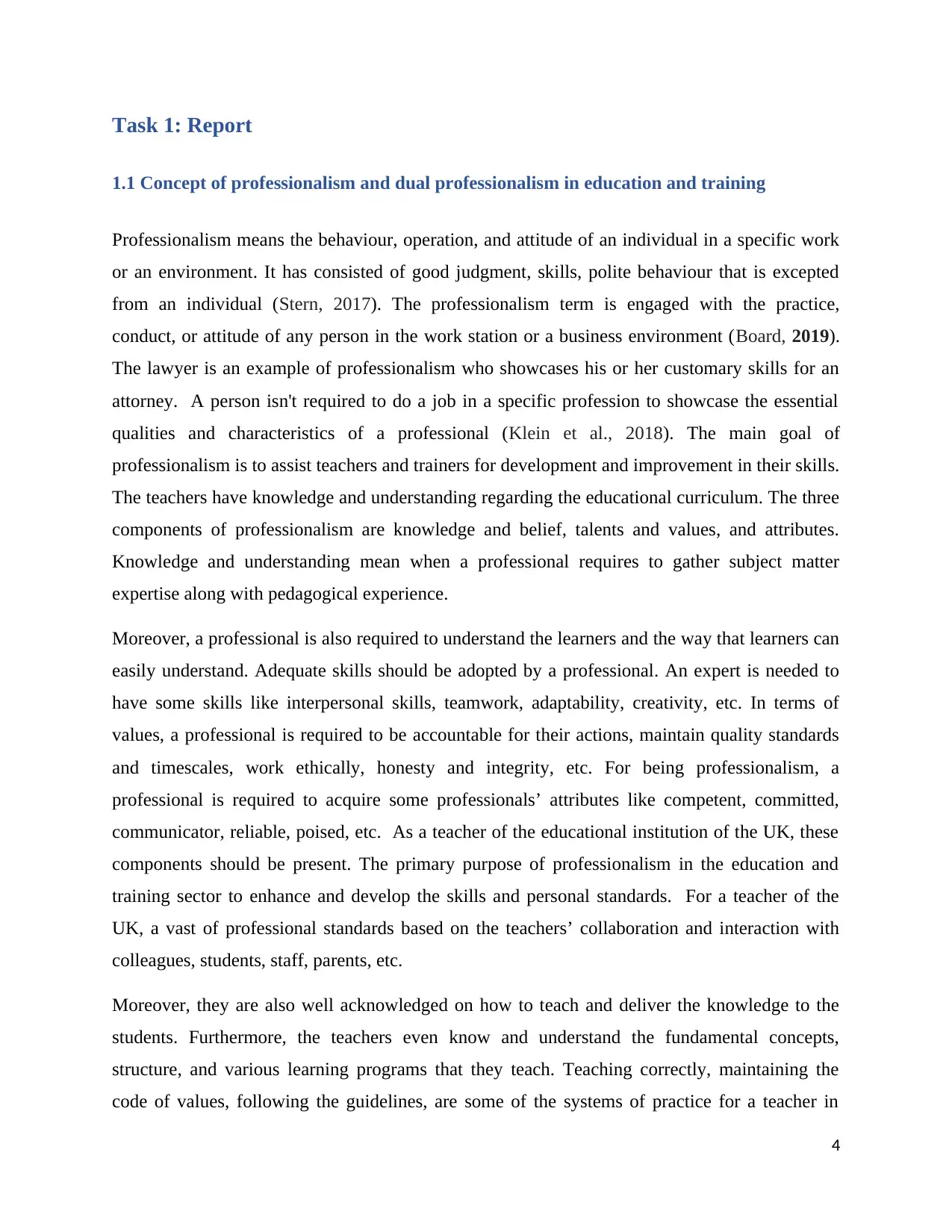
Task 1: Report
1.1 Concept of professionalism and dual professionalism in education and training
Professionalism means the behaviour, operation, and attitude of an individual in a specific work
or an environment. It has consisted of good judgment, skills, polite behaviour that is excepted
from an individual (Stern, 2017). The professionalism term is engaged with the practice,
conduct, or attitude of any person in the work station or a business environment (Board, 2019).
The lawyer is an example of professionalism who showcases his or her customary skills for an
attorney. A person isn't required to do a job in a specific profession to showcase the essential
qualities and characteristics of a professional (Klein et al., 2018). The main goal of
professionalism is to assist teachers and trainers for development and improvement in their skills.
The teachers have knowledge and understanding regarding the educational curriculum. The three
components of professionalism are knowledge and belief, talents and values, and attributes.
Knowledge and understanding mean when a professional requires to gather subject matter
expertise along with pedagogical experience.
Moreover, a professional is also required to understand the learners and the way that learners can
easily understand. Adequate skills should be adopted by a professional. An expert is needed to
have some skills like interpersonal skills, teamwork, adaptability, creativity, etc. In terms of
values, a professional is required to be accountable for their actions, maintain quality standards
and timescales, work ethically, honesty and integrity, etc. For being professionalism, a
professional is required to acquire some professionals’ attributes like competent, committed,
communicator, reliable, poised, etc. As a teacher of the educational institution of the UK, these
components should be present. The primary purpose of professionalism in the education and
training sector to enhance and develop the skills and personal standards. For a teacher of the
UK, a vast of professional standards based on the teachers’ collaboration and interaction with
colleagues, students, staff, parents, etc.
Moreover, they are also well acknowledged on how to teach and deliver the knowledge to the
students. Furthermore, the teachers even know and understand the fundamental concepts,
structure, and various learning programs that they teach. Teaching correctly, maintaining the
code of values, following the guidelines, are some of the systems of practice for a teacher in
4
1.1 Concept of professionalism and dual professionalism in education and training
Professionalism means the behaviour, operation, and attitude of an individual in a specific work
or an environment. It has consisted of good judgment, skills, polite behaviour that is excepted
from an individual (Stern, 2017). The professionalism term is engaged with the practice,
conduct, or attitude of any person in the work station or a business environment (Board, 2019).
The lawyer is an example of professionalism who showcases his or her customary skills for an
attorney. A person isn't required to do a job in a specific profession to showcase the essential
qualities and characteristics of a professional (Klein et al., 2018). The main goal of
professionalism is to assist teachers and trainers for development and improvement in their skills.
The teachers have knowledge and understanding regarding the educational curriculum. The three
components of professionalism are knowledge and belief, talents and values, and attributes.
Knowledge and understanding mean when a professional requires to gather subject matter
expertise along with pedagogical experience.
Moreover, a professional is also required to understand the learners and the way that learners can
easily understand. Adequate skills should be adopted by a professional. An expert is needed to
have some skills like interpersonal skills, teamwork, adaptability, creativity, etc. In terms of
values, a professional is required to be accountable for their actions, maintain quality standards
and timescales, work ethically, honesty and integrity, etc. For being professionalism, a
professional is required to acquire some professionals’ attributes like competent, committed,
communicator, reliable, poised, etc. As a teacher of the educational institution of the UK, these
components should be present. The primary purpose of professionalism in the education and
training sector to enhance and develop the skills and personal standards. For a teacher of the
UK, a vast of professional standards based on the teachers’ collaboration and interaction with
colleagues, students, staff, parents, etc.
Moreover, they are also well acknowledged on how to teach and deliver the knowledge to the
students. Furthermore, the teachers even know and understand the fundamental concepts,
structure, and various learning programs that they teach. Teaching correctly, maintaining the
code of values, following the guidelines, are some of the systems of practice for a teacher in
4
Secure Best Marks with AI Grader
Need help grading? Try our AI Grader for instant feedback on your assignments.
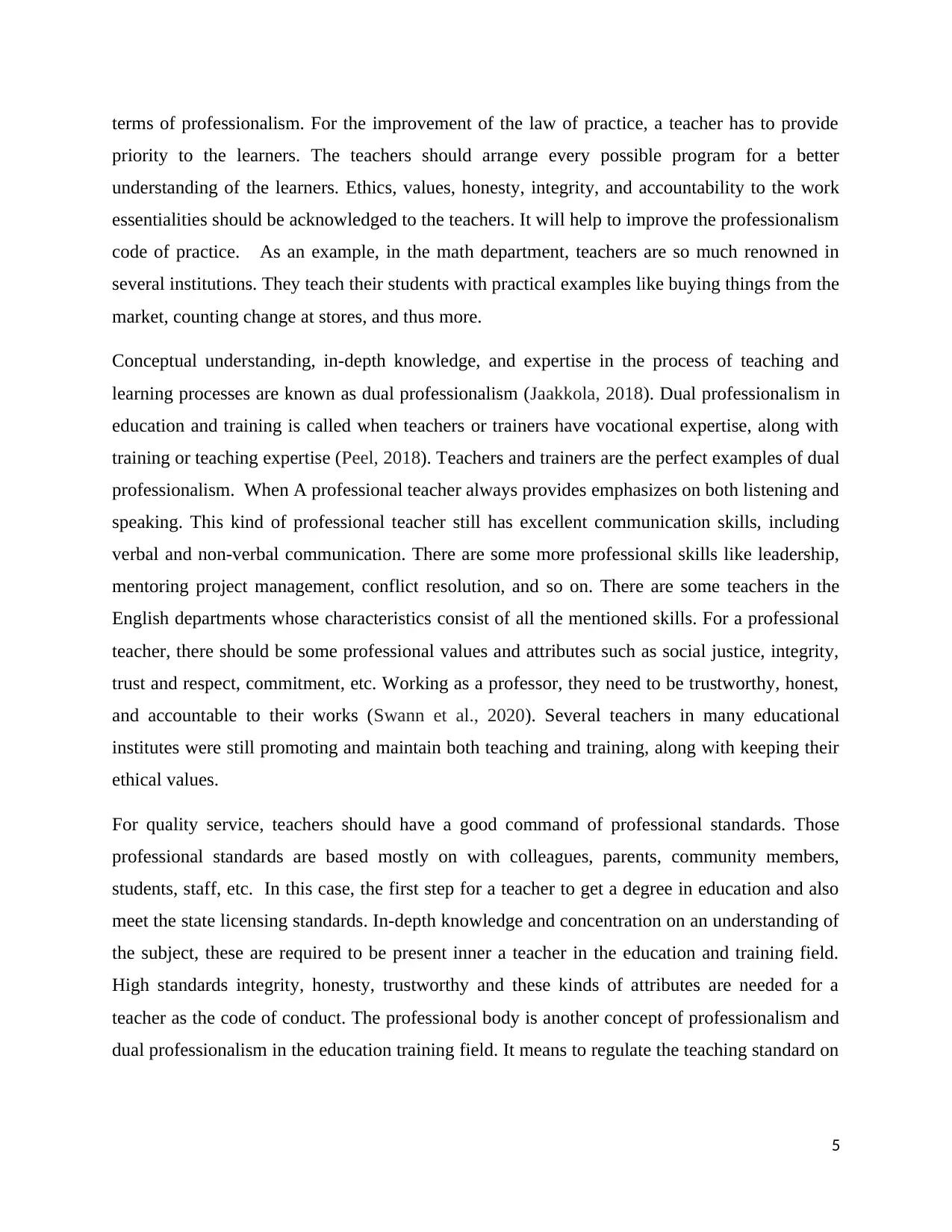
terms of professionalism. For the improvement of the law of practice, a teacher has to provide
priority to the learners. The teachers should arrange every possible program for a better
understanding of the learners. Ethics, values, honesty, integrity, and accountability to the work
essentialities should be acknowledged to the teachers. It will help to improve the professionalism
code of practice. As an example, in the math department, teachers are so much renowned in
several institutions. They teach their students with practical examples like buying things from the
market, counting change at stores, and thus more.
Conceptual understanding, in-depth knowledge, and expertise in the process of teaching and
learning processes are known as dual professionalism (Jaakkola, 2018). Dual professionalism in
education and training is called when teachers or trainers have vocational expertise, along with
training or teaching expertise (Peel, 2018). Teachers and trainers are the perfect examples of dual
professionalism. When A professional teacher always provides emphasizes on both listening and
speaking. This kind of professional teacher still has excellent communication skills, including
verbal and non-verbal communication. There are some more professional skills like leadership,
mentoring project management, conflict resolution, and so on. There are some teachers in the
English departments whose characteristics consist of all the mentioned skills. For a professional
teacher, there should be some professional values and attributes such as social justice, integrity,
trust and respect, commitment, etc. Working as a professor, they need to be trustworthy, honest,
and accountable to their works (Swann et al., 2020). Several teachers in many educational
institutes were still promoting and maintain both teaching and training, along with keeping their
ethical values.
For quality service, teachers should have a good command of professional standards. Those
professional standards are based mostly on with colleagues, parents, community members,
students, staff, etc. In this case, the first step for a teacher to get a degree in education and also
meet the state licensing standards. In-depth knowledge and concentration on an understanding of
the subject, these are required to be present inner a teacher in the education and training field.
High standards integrity, honesty, trustworthy and these kinds of attributes are needed for a
teacher as the code of conduct. The professional body is another concept of professionalism and
dual professionalism in the education training field. It means to regulate the teaching standard on
5
priority to the learners. The teachers should arrange every possible program for a better
understanding of the learners. Ethics, values, honesty, integrity, and accountability to the work
essentialities should be acknowledged to the teachers. It will help to improve the professionalism
code of practice. As an example, in the math department, teachers are so much renowned in
several institutions. They teach their students with practical examples like buying things from the
market, counting change at stores, and thus more.
Conceptual understanding, in-depth knowledge, and expertise in the process of teaching and
learning processes are known as dual professionalism (Jaakkola, 2018). Dual professionalism in
education and training is called when teachers or trainers have vocational expertise, along with
training or teaching expertise (Peel, 2018). Teachers and trainers are the perfect examples of dual
professionalism. When A professional teacher always provides emphasizes on both listening and
speaking. This kind of professional teacher still has excellent communication skills, including
verbal and non-verbal communication. There are some more professional skills like leadership,
mentoring project management, conflict resolution, and so on. There are some teachers in the
English departments whose characteristics consist of all the mentioned skills. For a professional
teacher, there should be some professional values and attributes such as social justice, integrity,
trust and respect, commitment, etc. Working as a professor, they need to be trustworthy, honest,
and accountable to their works (Swann et al., 2020). Several teachers in many educational
institutes were still promoting and maintain both teaching and training, along with keeping their
ethical values.
For quality service, teachers should have a good command of professional standards. Those
professional standards are based mostly on with colleagues, parents, community members,
students, staff, etc. In this case, the first step for a teacher to get a degree in education and also
meet the state licensing standards. In-depth knowledge and concentration on an understanding of
the subject, these are required to be present inner a teacher in the education and training field.
High standards integrity, honesty, trustworthy and these kinds of attributes are needed for a
teacher as the code of conduct. The professional body is another concept of professionalism and
dual professionalism in the education training field. It means to regulate the teaching standard on
5
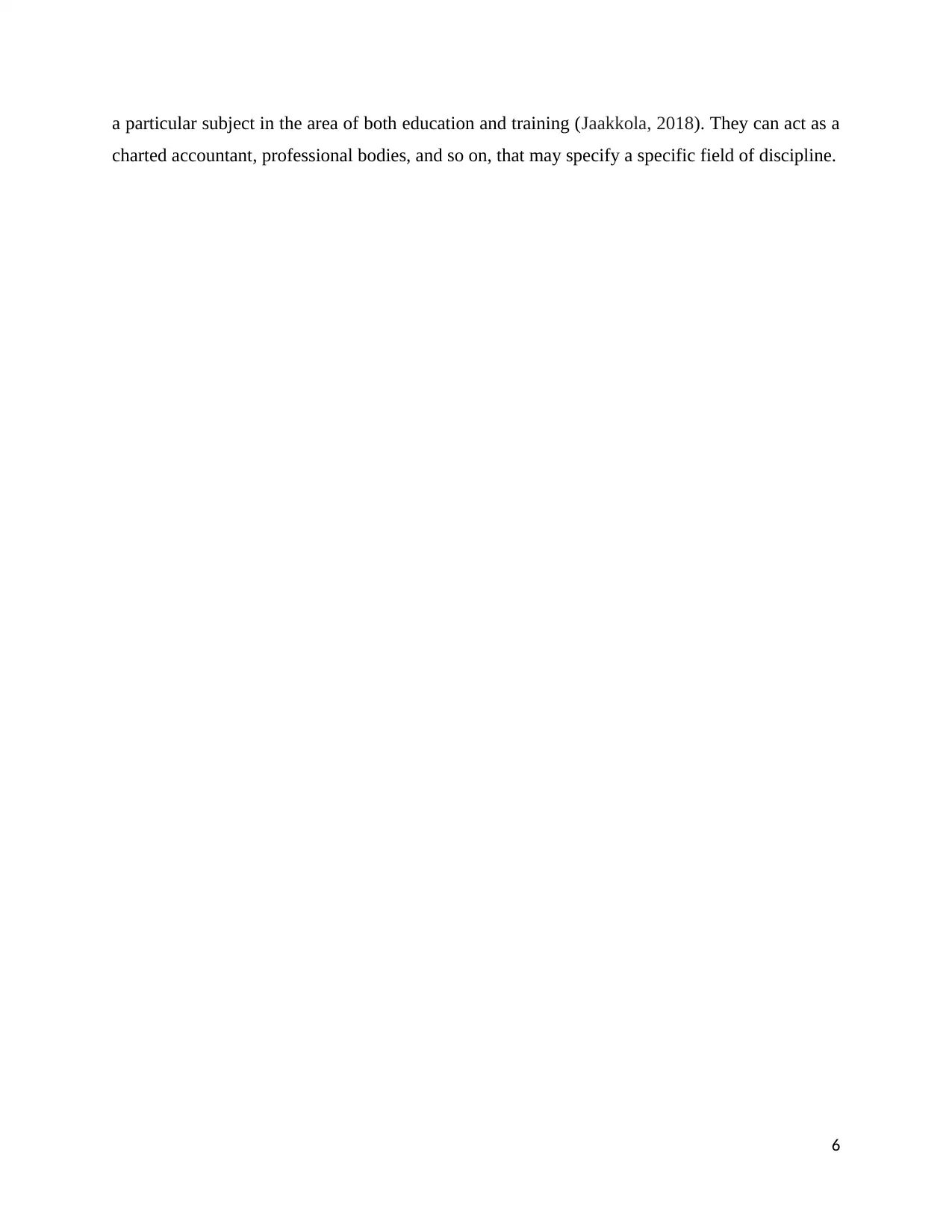
a particular subject in the area of both education and training (Jaakkola, 2018). They can act as a
charted accountant, professional bodies, and so on, that may specify a specific field of discipline.
6
charted accountant, professional bodies, and so on, that may specify a specific field of discipline.
6
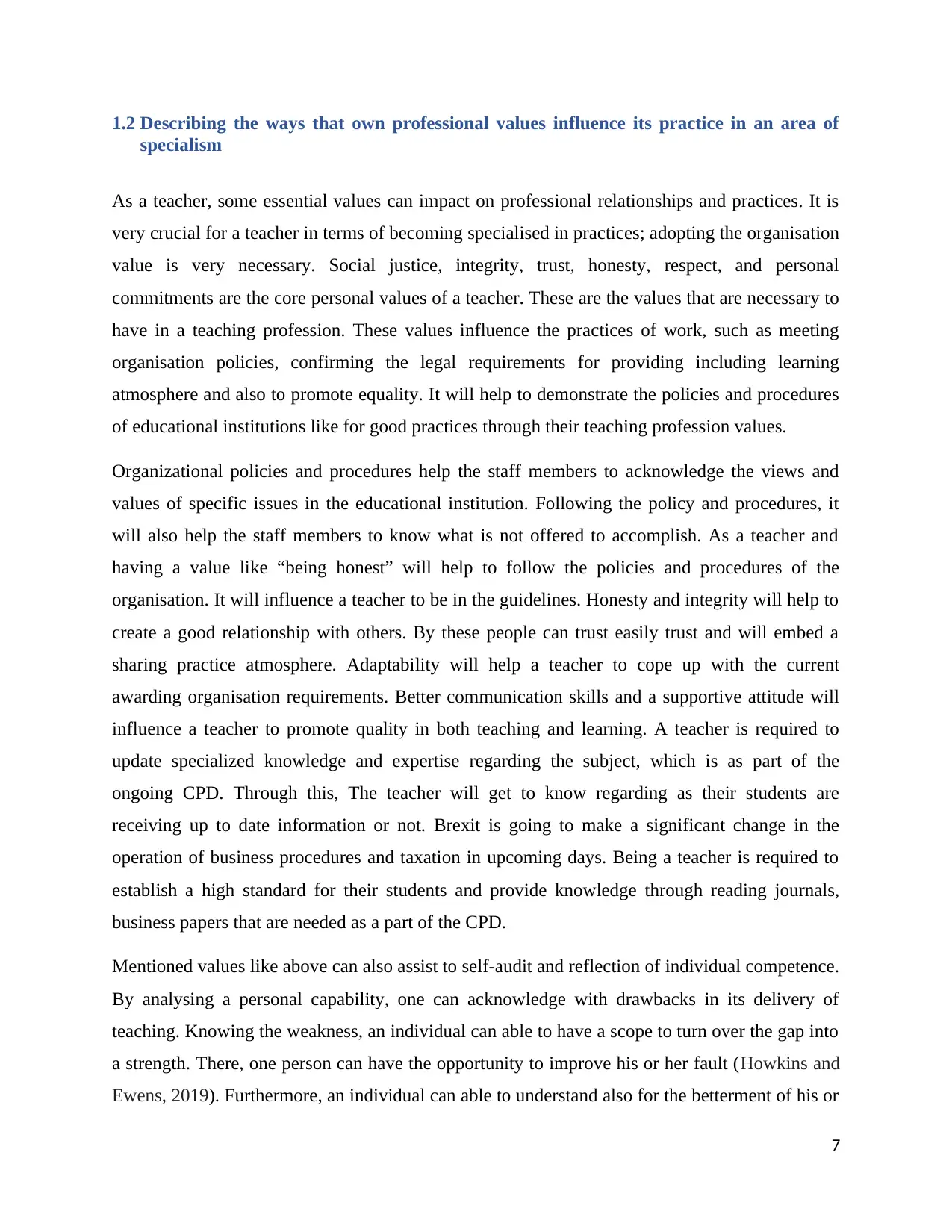
1.2 Describing the ways that own professional values influence its practice in an area of
specialism
As a teacher, some essential values can impact on professional relationships and practices. It is
very crucial for a teacher in terms of becoming specialised in practices; adopting the organisation
value is very necessary. Social justice, integrity, trust, honesty, respect, and personal
commitments are the core personal values of a teacher. These are the values that are necessary to
have in a teaching profession. These values influence the practices of work, such as meeting
organisation policies, confirming the legal requirements for providing including learning
atmosphere and also to promote equality. It will help to demonstrate the policies and procedures
of educational institutions like for good practices through their teaching profession values.
Organizational policies and procedures help the staff members to acknowledge the views and
values of specific issues in the educational institution. Following the policy and procedures, it
will also help the staff members to know what is not offered to accomplish. As a teacher and
having a value like “being honest” will help to follow the policies and procedures of the
organisation. It will influence a teacher to be in the guidelines. Honesty and integrity will help to
create a good relationship with others. By these people can trust easily trust and will embed a
sharing practice atmosphere. Adaptability will help a teacher to cope up with the current
awarding organisation requirements. Better communication skills and a supportive attitude will
influence a teacher to promote quality in both teaching and learning. A teacher is required to
update specialized knowledge and expertise regarding the subject, which is as part of the
ongoing CPD. Through this, The teacher will get to know regarding as their students are
receiving up to date information or not. Brexit is going to make a significant change in the
operation of business procedures and taxation in upcoming days. Being a teacher is required to
establish a high standard for their students and provide knowledge through reading journals,
business papers that are needed as a part of the CPD.
Mentioned values like above can also assist to self-audit and reflection of individual competence.
By analysing a personal capability, one can acknowledge with drawbacks in its delivery of
teaching. Knowing the weakness, an individual can able to have a scope to turn over the gap into
a strength. There, one person can have the opportunity to improve his or her fault (Howkins and
Ewens, 2019). Furthermore, an individual can able to understand also for the betterment of his or
7
specialism
As a teacher, some essential values can impact on professional relationships and practices. It is
very crucial for a teacher in terms of becoming specialised in practices; adopting the organisation
value is very necessary. Social justice, integrity, trust, honesty, respect, and personal
commitments are the core personal values of a teacher. These are the values that are necessary to
have in a teaching profession. These values influence the practices of work, such as meeting
organisation policies, confirming the legal requirements for providing including learning
atmosphere and also to promote equality. It will help to demonstrate the policies and procedures
of educational institutions like for good practices through their teaching profession values.
Organizational policies and procedures help the staff members to acknowledge the views and
values of specific issues in the educational institution. Following the policy and procedures, it
will also help the staff members to know what is not offered to accomplish. As a teacher and
having a value like “being honest” will help to follow the policies and procedures of the
organisation. It will influence a teacher to be in the guidelines. Honesty and integrity will help to
create a good relationship with others. By these people can trust easily trust and will embed a
sharing practice atmosphere. Adaptability will help a teacher to cope up with the current
awarding organisation requirements. Better communication skills and a supportive attitude will
influence a teacher to promote quality in both teaching and learning. A teacher is required to
update specialized knowledge and expertise regarding the subject, which is as part of the
ongoing CPD. Through this, The teacher will get to know regarding as their students are
receiving up to date information or not. Brexit is going to make a significant change in the
operation of business procedures and taxation in upcoming days. Being a teacher is required to
establish a high standard for their students and provide knowledge through reading journals,
business papers that are needed as a part of the CPD.
Mentioned values like above can also assist to self-audit and reflection of individual competence.
By analysing a personal capability, one can acknowledge with drawbacks in its delivery of
teaching. Knowing the weakness, an individual can able to have a scope to turn over the gap into
a strength. There, one person can have the opportunity to improve his or her fault (Howkins and
Ewens, 2019). Furthermore, an individual can able to understand also for the betterment of his or
7
Paraphrase This Document
Need a fresh take? Get an instant paraphrase of this document with our AI Paraphraser
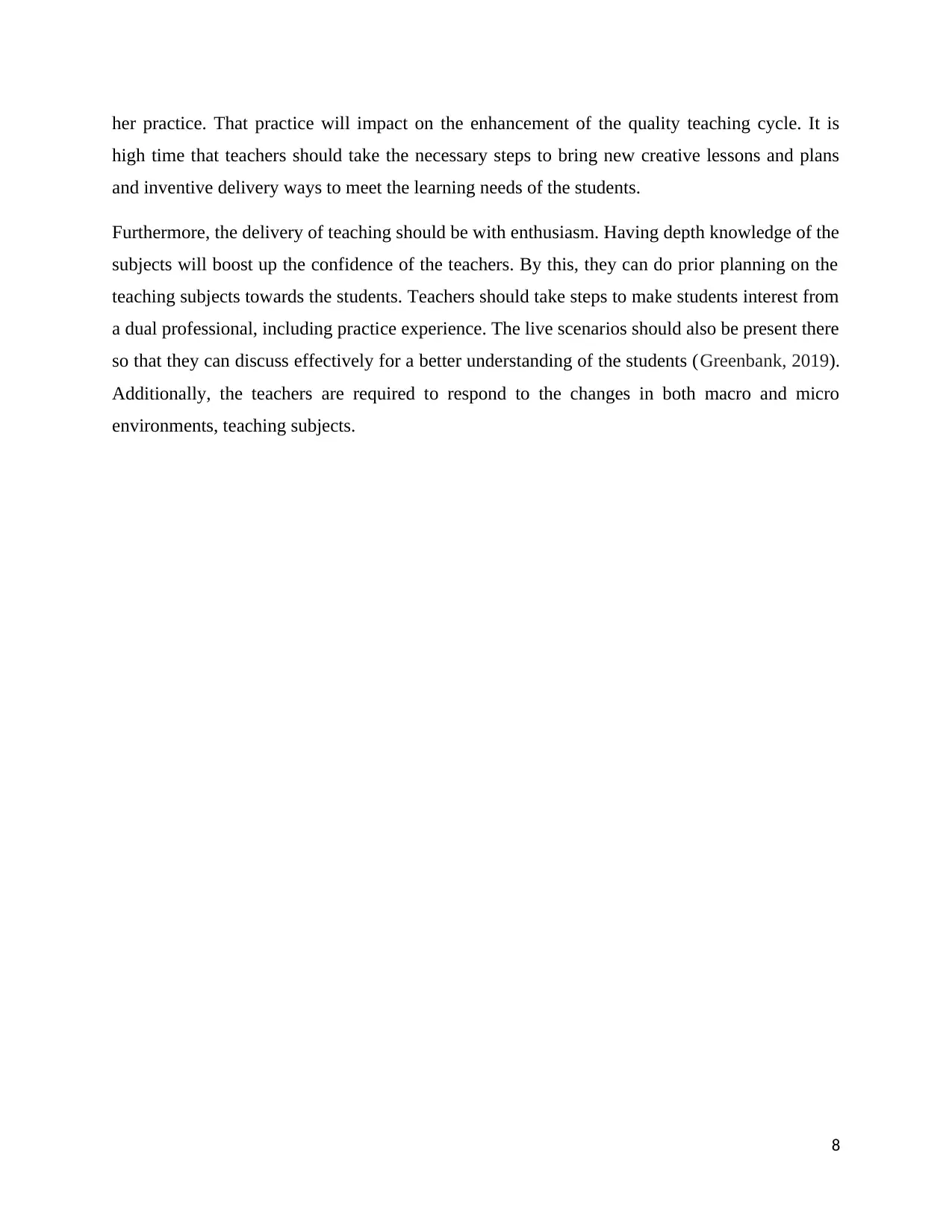
her practice. That practice will impact on the enhancement of the quality teaching cycle. It is
high time that teachers should take the necessary steps to bring new creative lessons and plans
and inventive delivery ways to meet the learning needs of the students.
Furthermore, the delivery of teaching should be with enthusiasm. Having depth knowledge of the
subjects will boost up the confidence of the teachers. By this, they can do prior planning on the
teaching subjects towards the students. Teachers should take steps to make students interest from
a dual professional, including practice experience. The live scenarios should also be present there
so that they can discuss effectively for a better understanding of the students (Greenbank, 2019).
Additionally, the teachers are required to respond to the changes in both macro and micro
environments, teaching subjects.
8
high time that teachers should take the necessary steps to bring new creative lessons and plans
and inventive delivery ways to meet the learning needs of the students.
Furthermore, the delivery of teaching should be with enthusiasm. Having depth knowledge of the
subjects will boost up the confidence of the teachers. By this, they can do prior planning on the
teaching subjects towards the students. Teachers should take steps to make students interest from
a dual professional, including practice experience. The live scenarios should also be present there
so that they can discuss effectively for a better understanding of the students (Greenbank, 2019).
Additionally, the teachers are required to respond to the changes in both macro and micro
environments, teaching subjects.
8
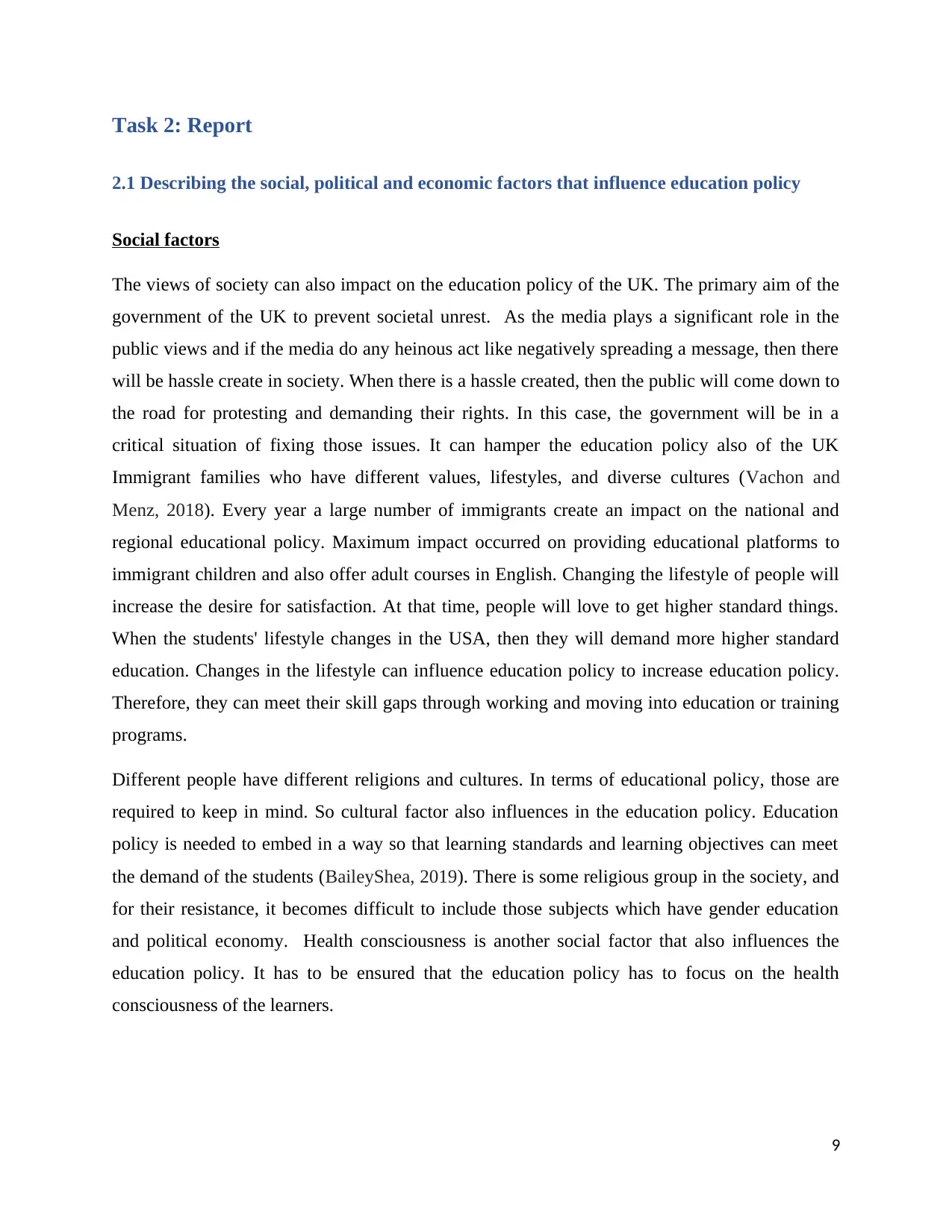
Task 2: Report
2.1 Describing the social, political and economic factors that influence education policy
Social factors
The views of society can also impact on the education policy of the UK. The primary aim of the
government of the UK to prevent societal unrest. As the media plays a significant role in the
public views and if the media do any heinous act like negatively spreading a message, then there
will be hassle create in society. When there is a hassle created, then the public will come down to
the road for protesting and demanding their rights. In this case, the government will be in a
critical situation of fixing those issues. It can hamper the education policy also of the UK
Immigrant families who have different values, lifestyles, and diverse cultures (Vachon and
Menz, 2018). Every year a large number of immigrants create an impact on the national and
regional educational policy. Maximum impact occurred on providing educational platforms to
immigrant children and also offer adult courses in English. Changing the lifestyle of people will
increase the desire for satisfaction. At that time, people will love to get higher standard things.
When the students' lifestyle changes in the USA, then they will demand more higher standard
education. Changes in the lifestyle can influence education policy to increase education policy.
Therefore, they can meet their skill gaps through working and moving into education or training
programs.
Different people have different religions and cultures. In terms of educational policy, those are
required to keep in mind. So cultural factor also influences in the education policy. Education
policy is needed to embed in a way so that learning standards and learning objectives can meet
the demand of the students (BaileyShea, 2019). There is some religious group in the society, and
for their resistance, it becomes difficult to include those subjects which have gender education
and political economy. Health consciousness is another social factor that also influences the
education policy. It has to be ensured that the education policy has to focus on the health
consciousness of the learners.
9
2.1 Describing the social, political and economic factors that influence education policy
Social factors
The views of society can also impact on the education policy of the UK. The primary aim of the
government of the UK to prevent societal unrest. As the media plays a significant role in the
public views and if the media do any heinous act like negatively spreading a message, then there
will be hassle create in society. When there is a hassle created, then the public will come down to
the road for protesting and demanding their rights. In this case, the government will be in a
critical situation of fixing those issues. It can hamper the education policy also of the UK
Immigrant families who have different values, lifestyles, and diverse cultures (Vachon and
Menz, 2018). Every year a large number of immigrants create an impact on the national and
regional educational policy. Maximum impact occurred on providing educational platforms to
immigrant children and also offer adult courses in English. Changing the lifestyle of people will
increase the desire for satisfaction. At that time, people will love to get higher standard things.
When the students' lifestyle changes in the USA, then they will demand more higher standard
education. Changes in the lifestyle can influence education policy to increase education policy.
Therefore, they can meet their skill gaps through working and moving into education or training
programs.
Different people have different religions and cultures. In terms of educational policy, those are
required to keep in mind. So cultural factor also influences in the education policy. Education
policy is needed to embed in a way so that learning standards and learning objectives can meet
the demand of the students (BaileyShea, 2019). There is some religious group in the society, and
for their resistance, it becomes difficult to include those subjects which have gender education
and political economy. Health consciousness is another social factor that also influences the
education policy. It has to be ensured that the education policy has to focus on the health
consciousness of the learners.
9
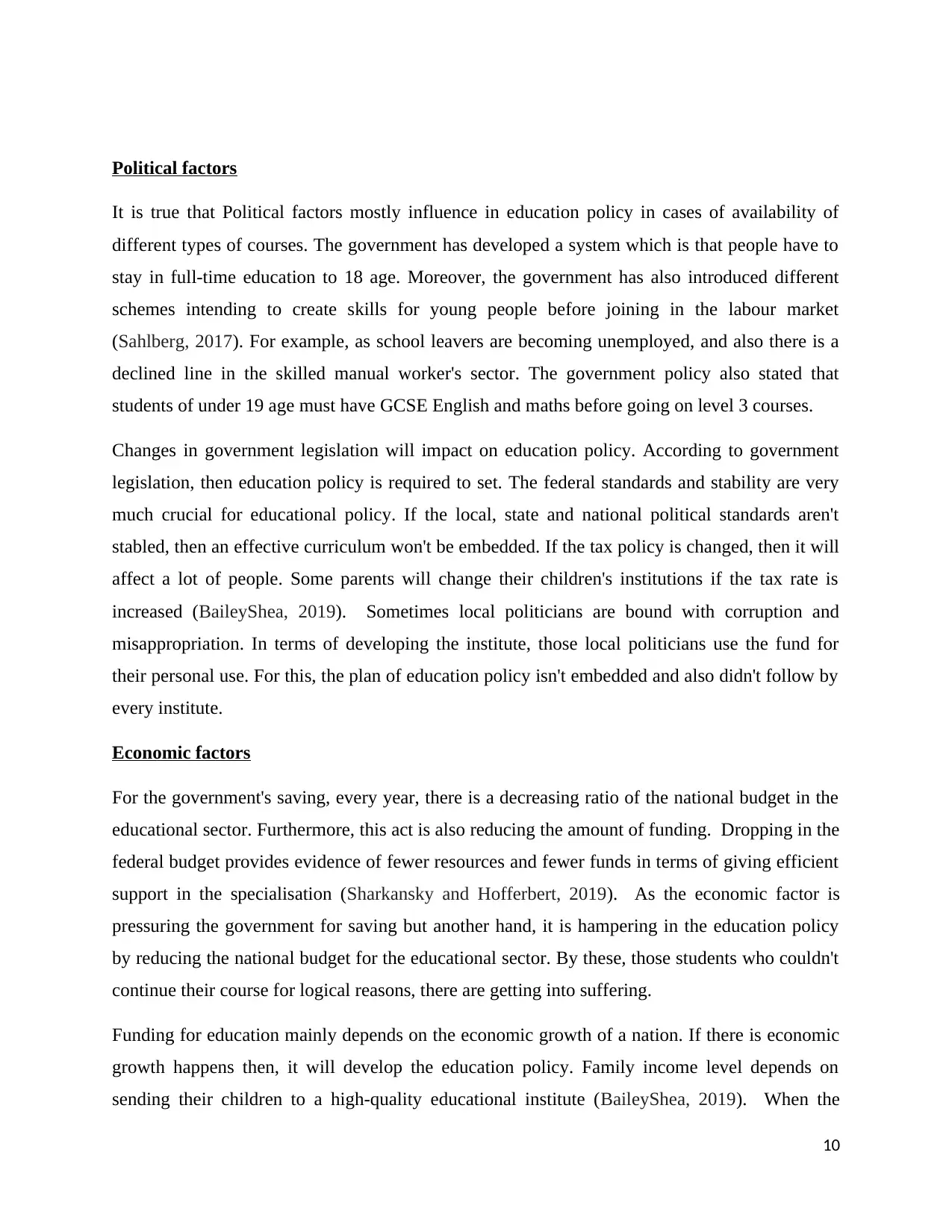
Political factors
It is true that Political factors mostly influence in education policy in cases of availability of
different types of courses. The government has developed a system which is that people have to
stay in full-time education to 18 age. Moreover, the government has also introduced different
schemes intending to create skills for young people before joining in the labour market
(Sahlberg, 2017). For example, as school leavers are becoming unemployed, and also there is a
declined line in the skilled manual worker's sector. The government policy also stated that
students of under 19 age must have GCSE English and maths before going on level 3 courses.
Changes in government legislation will impact on education policy. According to government
legislation, then education policy is required to set. The federal standards and stability are very
much crucial for educational policy. If the local, state and national political standards aren't
stabled, then an effective curriculum won't be embedded. If the tax policy is changed, then it will
affect a lot of people. Some parents will change their children's institutions if the tax rate is
increased (BaileyShea, 2019). Sometimes local politicians are bound with corruption and
misappropriation. In terms of developing the institute, those local politicians use the fund for
their personal use. For this, the plan of education policy isn't embedded and also didn't follow by
every institute.
Economic factors
For the government's saving, every year, there is a decreasing ratio of the national budget in the
educational sector. Furthermore, this act is also reducing the amount of funding. Dropping in the
federal budget provides evidence of fewer resources and fewer funds in terms of giving efficient
support in the specialisation (Sharkansky and Hofferbert, 2019). As the economic factor is
pressuring the government for saving but another hand, it is hampering in the education policy
by reducing the national budget for the educational sector. By these, those students who couldn't
continue their course for logical reasons, there are getting into suffering.
Funding for education mainly depends on the economic growth of a nation. If there is economic
growth happens then, it will develop the education policy. Family income level depends on
sending their children to a high-quality educational institute (BaileyShea, 2019). When the
10
It is true that Political factors mostly influence in education policy in cases of availability of
different types of courses. The government has developed a system which is that people have to
stay in full-time education to 18 age. Moreover, the government has also introduced different
schemes intending to create skills for young people before joining in the labour market
(Sahlberg, 2017). For example, as school leavers are becoming unemployed, and also there is a
declined line in the skilled manual worker's sector. The government policy also stated that
students of under 19 age must have GCSE English and maths before going on level 3 courses.
Changes in government legislation will impact on education policy. According to government
legislation, then education policy is required to set. The federal standards and stability are very
much crucial for educational policy. If the local, state and national political standards aren't
stabled, then an effective curriculum won't be embedded. If the tax policy is changed, then it will
affect a lot of people. Some parents will change their children's institutions if the tax rate is
increased (BaileyShea, 2019). Sometimes local politicians are bound with corruption and
misappropriation. In terms of developing the institute, those local politicians use the fund for
their personal use. For this, the plan of education policy isn't embedded and also didn't follow by
every institute.
Economic factors
For the government's saving, every year, there is a decreasing ratio of the national budget in the
educational sector. Furthermore, this act is also reducing the amount of funding. Dropping in the
federal budget provides evidence of fewer resources and fewer funds in terms of giving efficient
support in the specialisation (Sharkansky and Hofferbert, 2019). As the economic factor is
pressuring the government for saving but another hand, it is hampering in the education policy
by reducing the national budget for the educational sector. By these, those students who couldn't
continue their course for logical reasons, there are getting into suffering.
Funding for education mainly depends on the economic growth of a nation. If there is economic
growth happens then, it will develop the education policy. Family income level depends on
sending their children to a high-quality educational institute (BaileyShea, 2019). When the
10
Secure Best Marks with AI Grader
Need help grading? Try our AI Grader for instant feedback on your assignments.
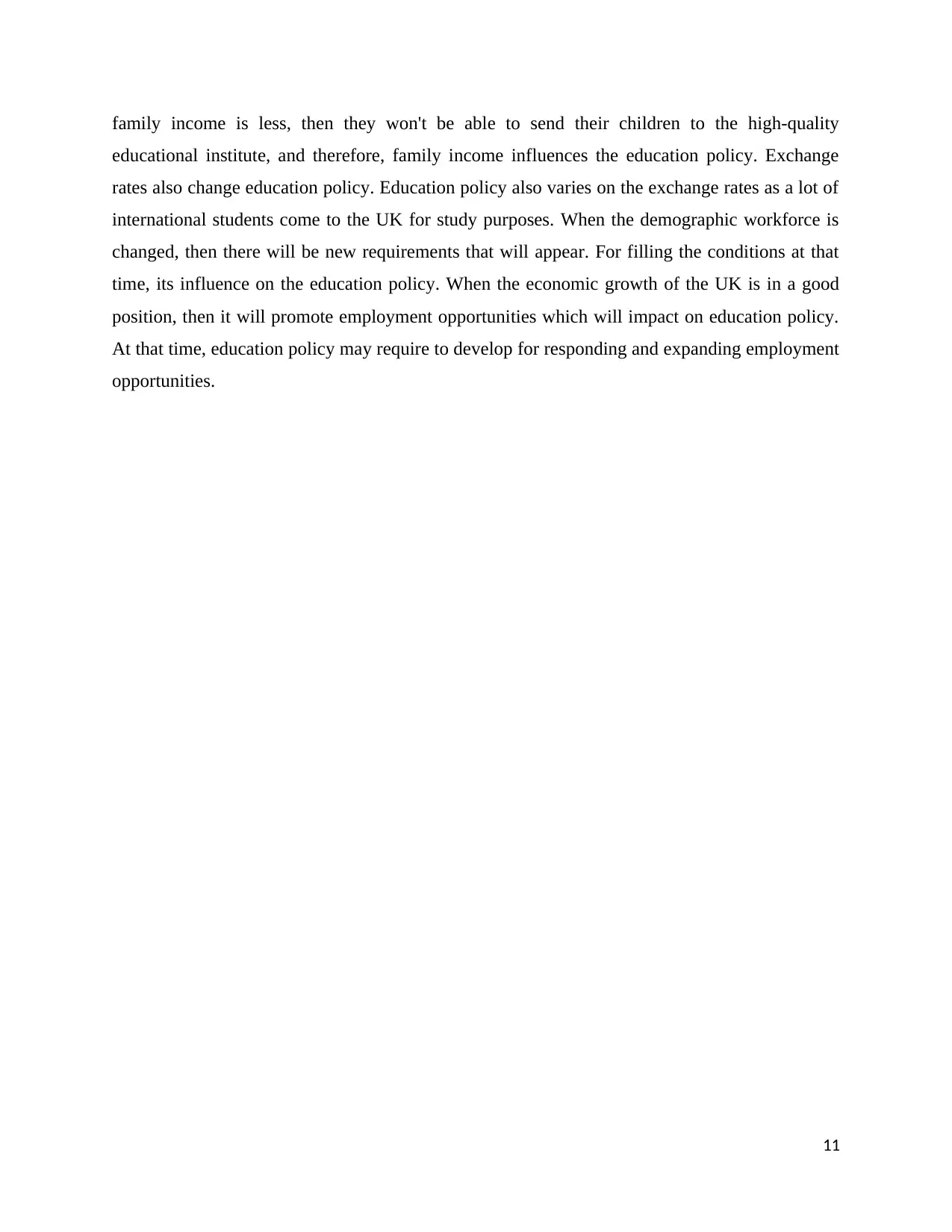
family income is less, then they won't be able to send their children to the high-quality
educational institute, and therefore, family income influences the education policy. Exchange
rates also change education policy. Education policy also varies on the exchange rates as a lot of
international students come to the UK for study purposes. When the demographic workforce is
changed, then there will be new requirements that will appear. For filling the conditions at that
time, its influence on the education policy. When the economic growth of the UK is in a good
position, then it will promote employment opportunities which will impact on education policy.
At that time, education policy may require to develop for responding and expanding employment
opportunities.
11
educational institute, and therefore, family income influences the education policy. Exchange
rates also change education policy. Education policy also varies on the exchange rates as a lot of
international students come to the UK for study purposes. When the demographic workforce is
changed, then there will be new requirements that will appear. For filling the conditions at that
time, its influence on the education policy. When the economic growth of the UK is in a good
position, then it will promote employment opportunities which will impact on education policy.
At that time, education policy may require to develop for responding and expanding employment
opportunities.
11
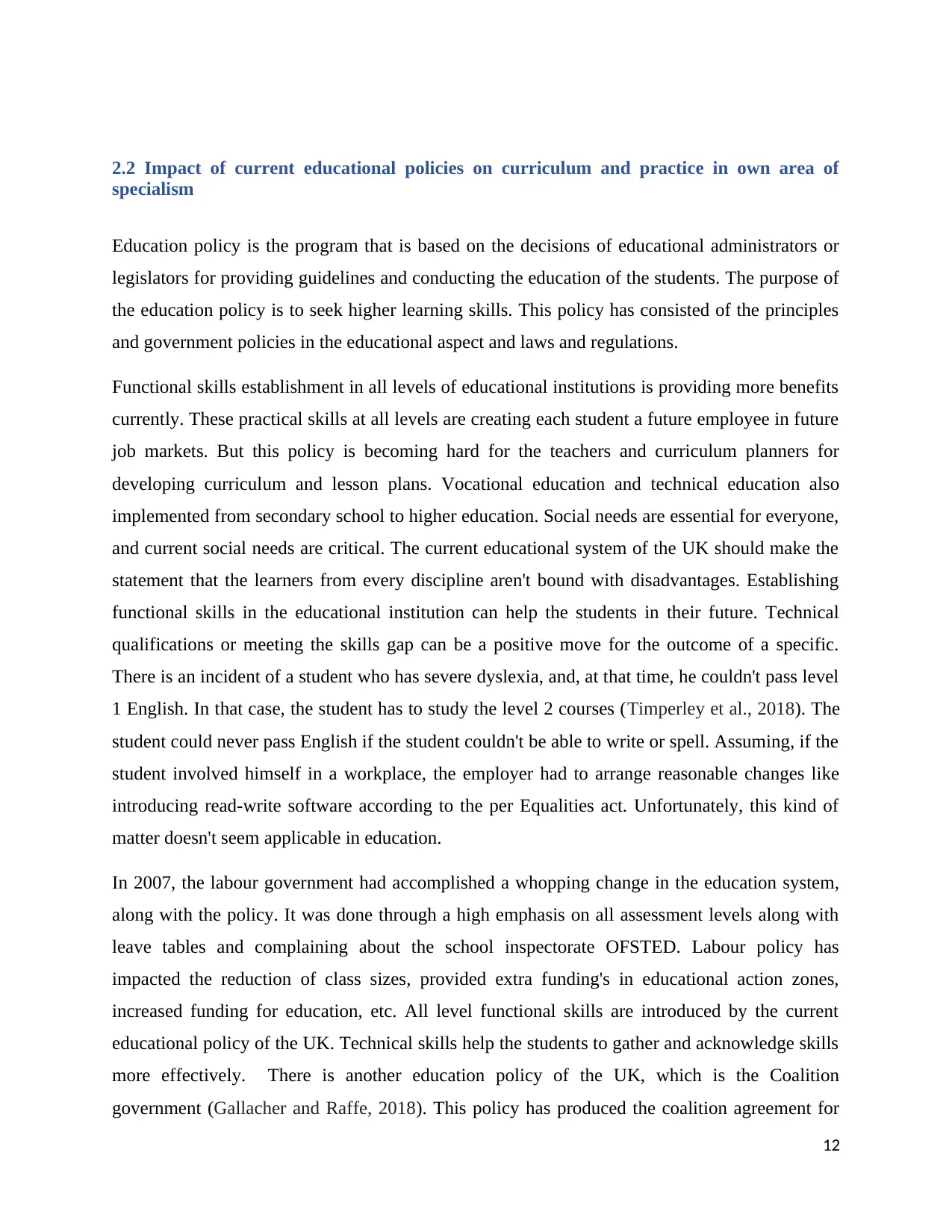
2.2 Impact of current educational policies on curriculum and practice in own area of
specialism
Education policy is the program that is based on the decisions of educational administrators or
legislators for providing guidelines and conducting the education of the students. The purpose of
the education policy is to seek higher learning skills. This policy has consisted of the principles
and government policies in the educational aspect and laws and regulations.
Functional skills establishment in all levels of educational institutions is providing more benefits
currently. These practical skills at all levels are creating each student a future employee in future
job markets. But this policy is becoming hard for the teachers and curriculum planners for
developing curriculum and lesson plans. Vocational education and technical education also
implemented from secondary school to higher education. Social needs are essential for everyone,
and current social needs are critical. The current educational system of the UK should make the
statement that the learners from every discipline aren't bound with disadvantages. Establishing
functional skills in the educational institution can help the students in their future. Technical
qualifications or meeting the skills gap can be a positive move for the outcome of a specific.
There is an incident of a student who has severe dyslexia, and, at that time, he couldn't pass level
1 English. In that case, the student has to study the level 2 courses (Timperley et al., 2018). The
student could never pass English if the student couldn't be able to write or spell. Assuming, if the
student involved himself in a workplace, the employer had to arrange reasonable changes like
introducing read-write software according to the per Equalities act. Unfortunately, this kind of
matter doesn't seem applicable in education.
In 2007, the labour government had accomplished a whopping change in the education system,
along with the policy. It was done through a high emphasis on all assessment levels along with
leave tables and complaining about the school inspectorate OFSTED. Labour policy has
impacted the reduction of class sizes, provided extra funding's in educational action zones,
increased funding for education, etc. All level functional skills are introduced by the current
educational policy of the UK. Technical skills help the students to gather and acknowledge skills
more effectively. There is another education policy of the UK, which is the Coalition
government (Gallacher and Raffe, 2018). This policy has produced the coalition agreement for
12
specialism
Education policy is the program that is based on the decisions of educational administrators or
legislators for providing guidelines and conducting the education of the students. The purpose of
the education policy is to seek higher learning skills. This policy has consisted of the principles
and government policies in the educational aspect and laws and regulations.
Functional skills establishment in all levels of educational institutions is providing more benefits
currently. These practical skills at all levels are creating each student a future employee in future
job markets. But this policy is becoming hard for the teachers and curriculum planners for
developing curriculum and lesson plans. Vocational education and technical education also
implemented from secondary school to higher education. Social needs are essential for everyone,
and current social needs are critical. The current educational system of the UK should make the
statement that the learners from every discipline aren't bound with disadvantages. Establishing
functional skills in the educational institution can help the students in their future. Technical
qualifications or meeting the skills gap can be a positive move for the outcome of a specific.
There is an incident of a student who has severe dyslexia, and, at that time, he couldn't pass level
1 English. In that case, the student has to study the level 2 courses (Timperley et al., 2018). The
student could never pass English if the student couldn't be able to write or spell. Assuming, if the
student involved himself in a workplace, the employer had to arrange reasonable changes like
introducing read-write software according to the per Equalities act. Unfortunately, this kind of
matter doesn't seem applicable in education.
In 2007, the labour government had accomplished a whopping change in the education system,
along with the policy. It was done through a high emphasis on all assessment levels along with
leave tables and complaining about the school inspectorate OFSTED. Labour policy has
impacted the reduction of class sizes, provided extra funding's in educational action zones,
increased funding for education, etc. All level functional skills are introduced by the current
educational policy of the UK. Technical skills help the students to gather and acknowledge skills
more effectively. There is another education policy of the UK, which is the Coalition
government (Gallacher and Raffe, 2018). This policy has produced the coalition agreement for
12
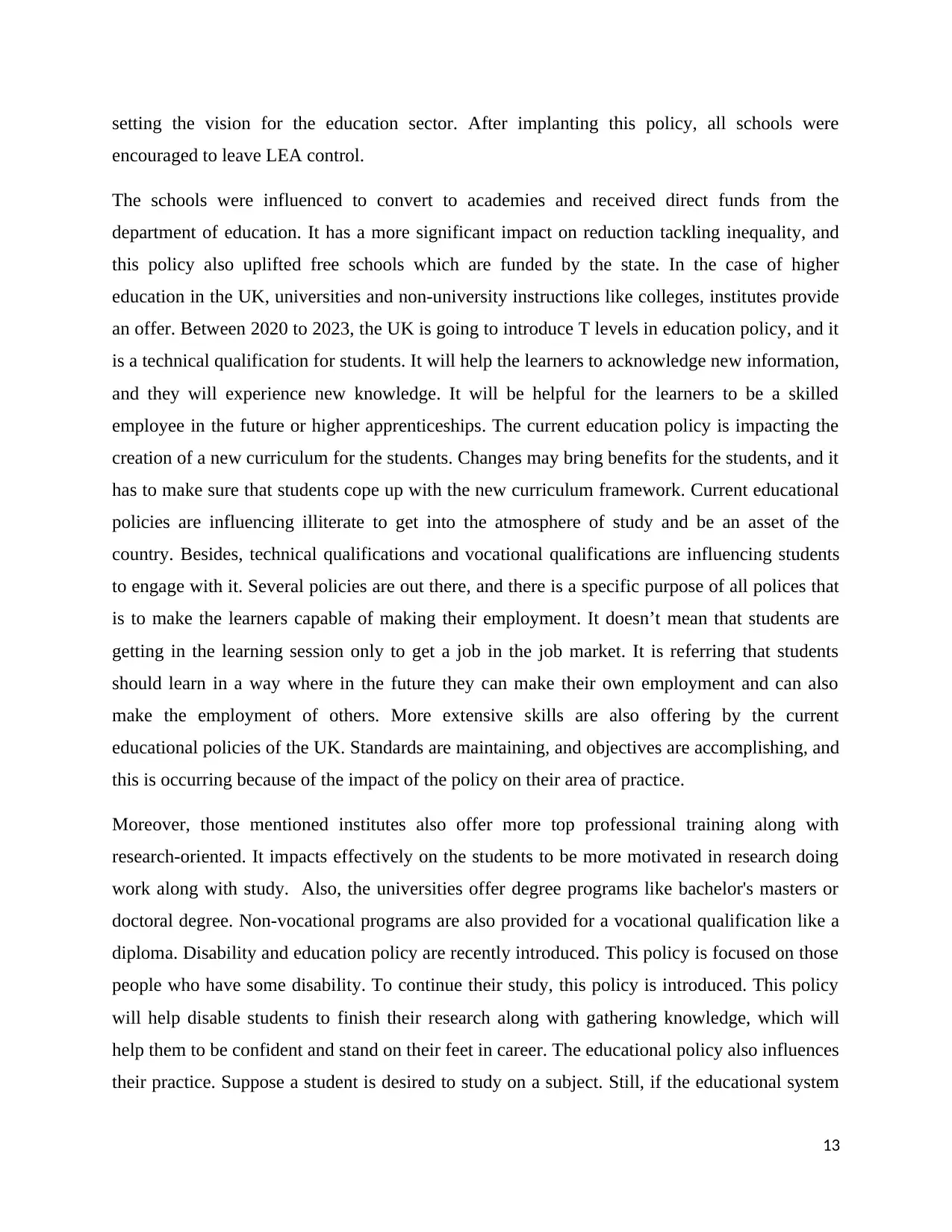
setting the vision for the education sector. After implanting this policy, all schools were
encouraged to leave LEA control.
The schools were influenced to convert to academies and received direct funds from the
department of education. It has a more significant impact on reduction tackling inequality, and
this policy also uplifted free schools which are funded by the state. In the case of higher
education in the UK, universities and non-university instructions like colleges, institutes provide
an offer. Between 2020 to 2023, the UK is going to introduce T levels in education policy, and it
is a technical qualification for students. It will help the learners to acknowledge new information,
and they will experience new knowledge. It will be helpful for the learners to be a skilled
employee in the future or higher apprenticeships. The current education policy is impacting the
creation of a new curriculum for the students. Changes may bring benefits for the students, and it
has to make sure that students cope up with the new curriculum framework. Current educational
policies are influencing illiterate to get into the atmosphere of study and be an asset of the
country. Besides, technical qualifications and vocational qualifications are influencing students
to engage with it. Several policies are out there, and there is a specific purpose of all polices that
is to make the learners capable of making their employment. It doesn’t mean that students are
getting in the learning session only to get a job in the job market. It is referring that students
should learn in a way where in the future they can make their own employment and can also
make the employment of others. More extensive skills are also offering by the current
educational policies of the UK. Standards are maintaining, and objectives are accomplishing, and
this is occurring because of the impact of the policy on their area of practice.
Moreover, those mentioned institutes also offer more top professional training along with
research-oriented. It impacts effectively on the students to be more motivated in research doing
work along with study. Also, the universities offer degree programs like bachelor's masters or
doctoral degree. Non-vocational programs are also provided for a vocational qualification like a
diploma. Disability and education policy are recently introduced. This policy is focused on those
people who have some disability. To continue their study, this policy is introduced. This policy
will help disable students to finish their research along with gathering knowledge, which will
help them to be confident and stand on their feet in career. The educational policy also influences
their practice. Suppose a student is desired to study on a subject. Still, if the educational system
13
encouraged to leave LEA control.
The schools were influenced to convert to academies and received direct funds from the
department of education. It has a more significant impact on reduction tackling inequality, and
this policy also uplifted free schools which are funded by the state. In the case of higher
education in the UK, universities and non-university instructions like colleges, institutes provide
an offer. Between 2020 to 2023, the UK is going to introduce T levels in education policy, and it
is a technical qualification for students. It will help the learners to acknowledge new information,
and they will experience new knowledge. It will be helpful for the learners to be a skilled
employee in the future or higher apprenticeships. The current education policy is impacting the
creation of a new curriculum for the students. Changes may bring benefits for the students, and it
has to make sure that students cope up with the new curriculum framework. Current educational
policies are influencing illiterate to get into the atmosphere of study and be an asset of the
country. Besides, technical qualifications and vocational qualifications are influencing students
to engage with it. Several policies are out there, and there is a specific purpose of all polices that
is to make the learners capable of making their employment. It doesn’t mean that students are
getting in the learning session only to get a job in the job market. It is referring that students
should learn in a way where in the future they can make their own employment and can also
make the employment of others. More extensive skills are also offering by the current
educational policies of the UK. Standards are maintaining, and objectives are accomplishing, and
this is occurring because of the impact of the policy on their area of practice.
Moreover, those mentioned institutes also offer more top professional training along with
research-oriented. It impacts effectively on the students to be more motivated in research doing
work along with study. Also, the universities offer degree programs like bachelor's masters or
doctoral degree. Non-vocational programs are also provided for a vocational qualification like a
diploma. Disability and education policy are recently introduced. This policy is focused on those
people who have some disability. To continue their study, this policy is introduced. This policy
will help disable students to finish their research along with gathering knowledge, which will
help them to be confident and stand on their feet in career. The educational policy also influences
their practice. Suppose a student is desired to study on a subject. Still, if the educational system
13
Paraphrase This Document
Need a fresh take? Get an instant paraphrase of this document with our AI Paraphraser
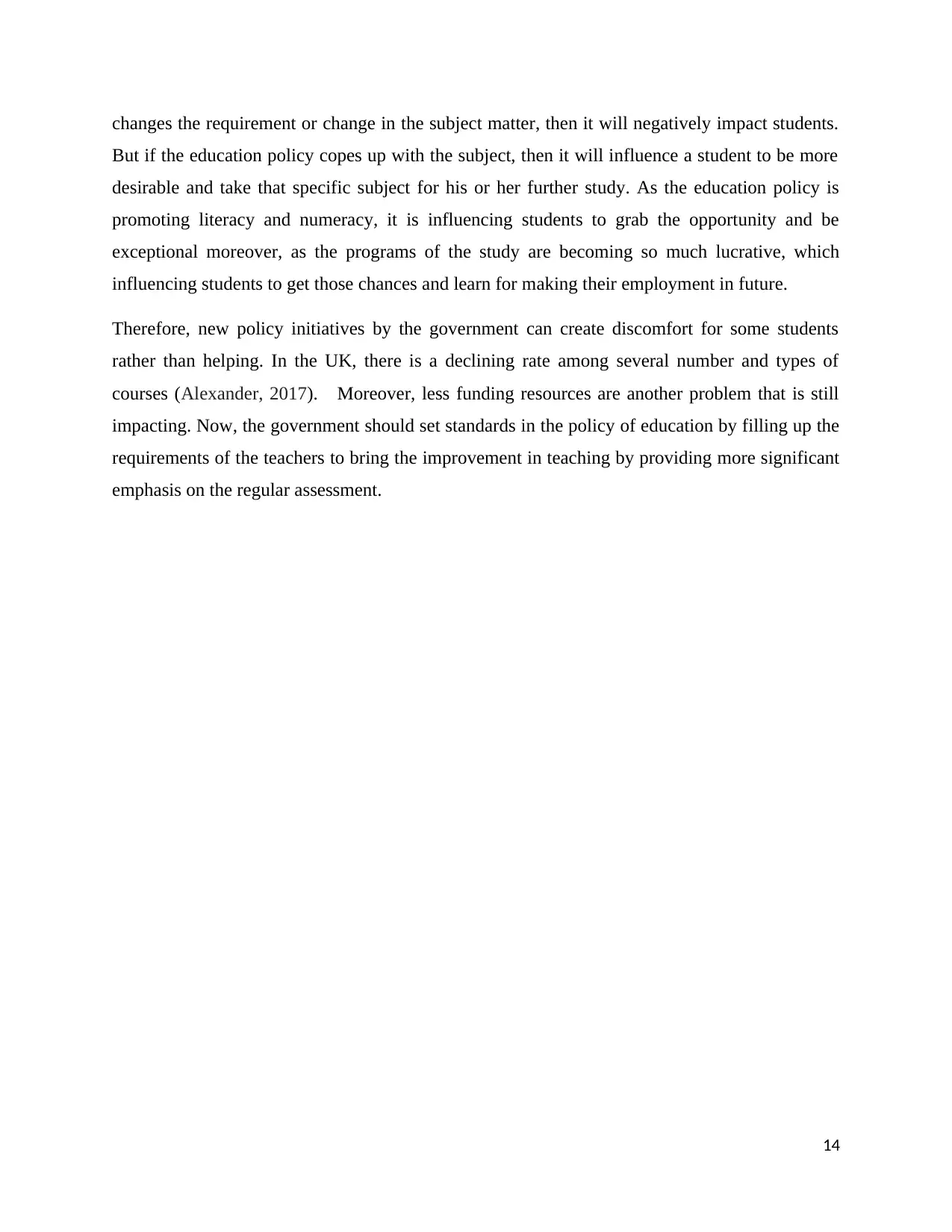
changes the requirement or change in the subject matter, then it will negatively impact students.
But if the education policy copes up with the subject, then it will influence a student to be more
desirable and take that specific subject for his or her further study. As the education policy is
promoting literacy and numeracy, it is influencing students to grab the opportunity and be
exceptional moreover, as the programs of the study are becoming so much lucrative, which
influencing students to get those chances and learn for making their employment in future.
Therefore, new policy initiatives by the government can create discomfort for some students
rather than helping. In the UK, there is a declining rate among several number and types of
courses (Alexander, 2017). Moreover, less funding resources are another problem that is still
impacting. Now, the government should set standards in the policy of education by filling up the
requirements of the teachers to bring the improvement in teaching by providing more significant
emphasis on the regular assessment.
14
But if the education policy copes up with the subject, then it will influence a student to be more
desirable and take that specific subject for his or her further study. As the education policy is
promoting literacy and numeracy, it is influencing students to grab the opportunity and be
exceptional moreover, as the programs of the study are becoming so much lucrative, which
influencing students to get those chances and learn for making their employment in future.
Therefore, new policy initiatives by the government can create discomfort for some students
rather than helping. In the UK, there is a declining rate among several number and types of
courses (Alexander, 2017). Moreover, less funding resources are another problem that is still
impacting. Now, the government should set standards in the policy of education by filling up the
requirements of the teachers to bring the improvement in teaching by providing more significant
emphasis on the regular assessment.
14
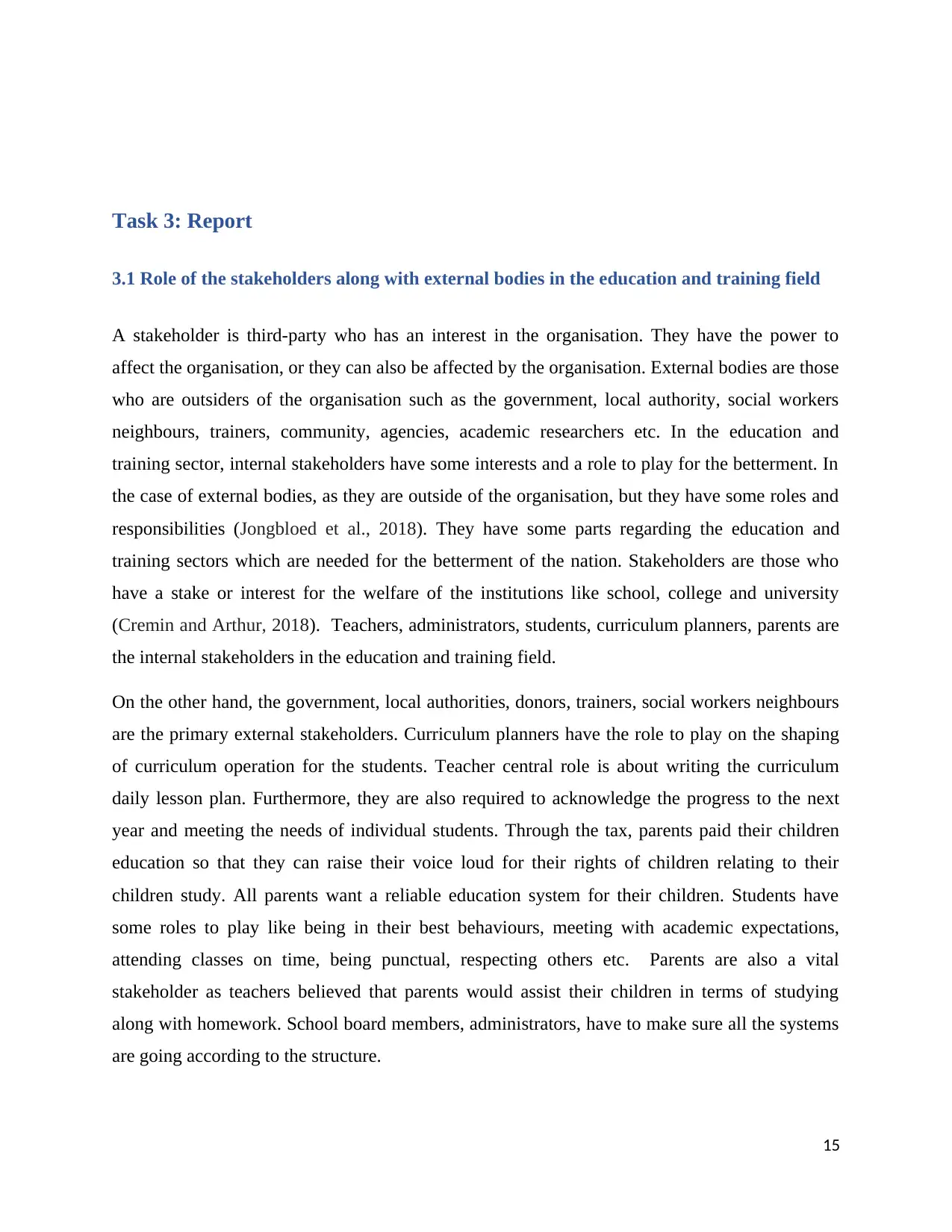
Task 3: Report
3.1 Role of the stakeholders along with external bodies in the education and training field
A stakeholder is third-party who has an interest in the organisation. They have the power to
affect the organisation, or they can also be affected by the organisation. External bodies are those
who are outsiders of the organisation such as the government, local authority, social workers
neighbours, trainers, community, agencies, academic researchers etc. In the education and
training sector, internal stakeholders have some interests and a role to play for the betterment. In
the case of external bodies, as they are outside of the organisation, but they have some roles and
responsibilities (Jongbloed et al., 2018). They have some parts regarding the education and
training sectors which are needed for the betterment of the nation. Stakeholders are those who
have a stake or interest for the welfare of the institutions like school, college and university
(Cremin and Arthur, 2018). Teachers, administrators, students, curriculum planners, parents are
the internal stakeholders in the education and training field.
On the other hand, the government, local authorities, donors, trainers, social workers neighbours
are the primary external stakeholders. Curriculum planners have the role to play on the shaping
of curriculum operation for the students. Teacher central role is about writing the curriculum
daily lesson plan. Furthermore, they are also required to acknowledge the progress to the next
year and meeting the needs of individual students. Through the tax, parents paid their children
education so that they can raise their voice loud for their rights of children relating to their
children study. All parents want a reliable education system for their children. Students have
some roles to play like being in their best behaviours, meeting with academic expectations,
attending classes on time, being punctual, respecting others etc. Parents are also a vital
stakeholder as teachers believed that parents would assist their children in terms of studying
along with homework. School board members, administrators, have to make sure all the systems
are going according to the structure.
15
3.1 Role of the stakeholders along with external bodies in the education and training field
A stakeholder is third-party who has an interest in the organisation. They have the power to
affect the organisation, or they can also be affected by the organisation. External bodies are those
who are outsiders of the organisation such as the government, local authority, social workers
neighbours, trainers, community, agencies, academic researchers etc. In the education and
training sector, internal stakeholders have some interests and a role to play for the betterment. In
the case of external bodies, as they are outside of the organisation, but they have some roles and
responsibilities (Jongbloed et al., 2018). They have some parts regarding the education and
training sectors which are needed for the betterment of the nation. Stakeholders are those who
have a stake or interest for the welfare of the institutions like school, college and university
(Cremin and Arthur, 2018). Teachers, administrators, students, curriculum planners, parents are
the internal stakeholders in the education and training field.
On the other hand, the government, local authorities, donors, trainers, social workers neighbours
are the primary external stakeholders. Curriculum planners have the role to play on the shaping
of curriculum operation for the students. Teacher central role is about writing the curriculum
daily lesson plan. Furthermore, they are also required to acknowledge the progress to the next
year and meeting the needs of individual students. Through the tax, parents paid their children
education so that they can raise their voice loud for their rights of children relating to their
children study. All parents want a reliable education system for their children. Students have
some roles to play like being in their best behaviours, meeting with academic expectations,
attending classes on time, being punctual, respecting others etc. Parents are also a vital
stakeholder as teachers believed that parents would assist their children in terms of studying
along with homework. School board members, administrators, have to make sure all the systems
are going according to the structure.
15
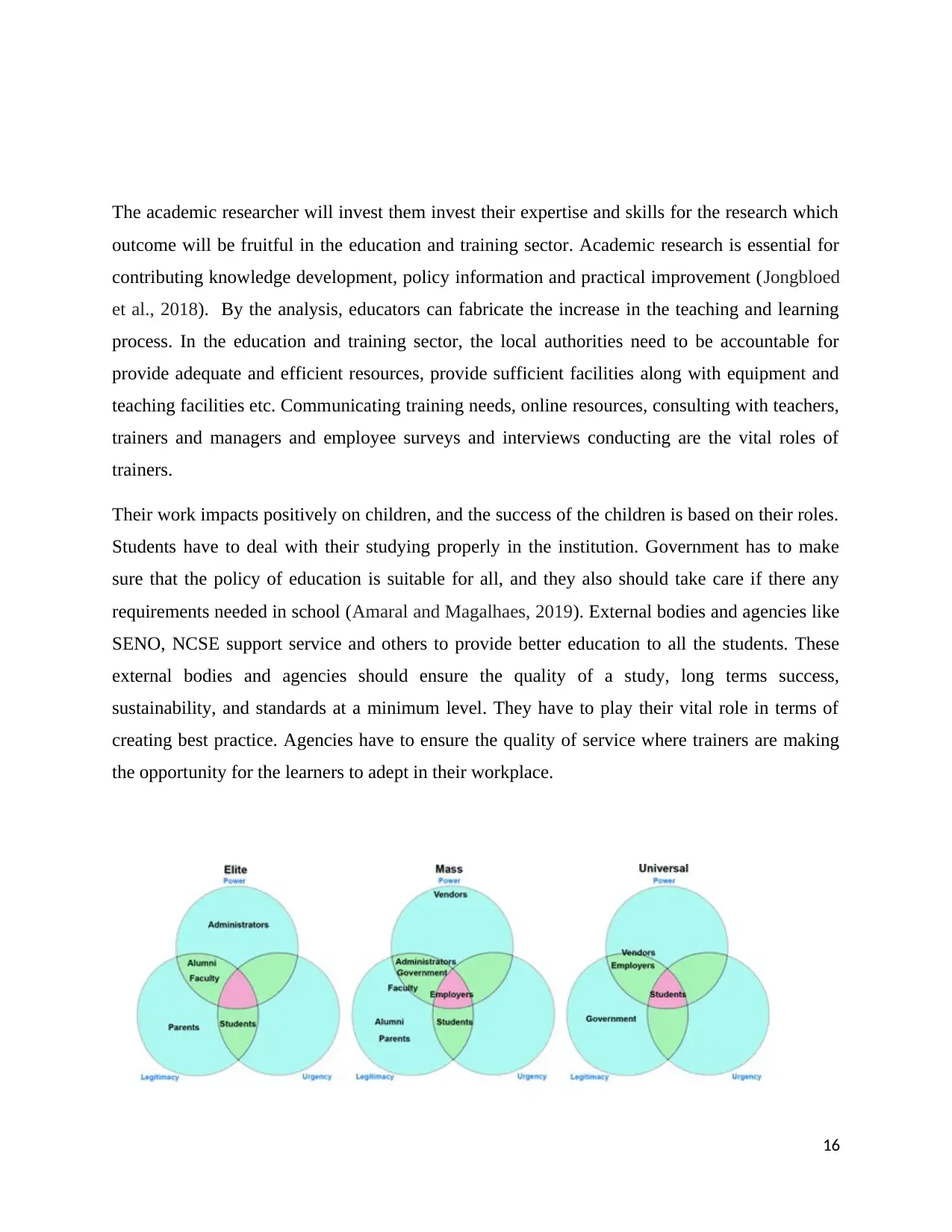
The academic researcher will invest them invest their expertise and skills for the research which
outcome will be fruitful in the education and training sector. Academic research is essential for
contributing knowledge development, policy information and practical improvement (Jongbloed
et al., 2018). By the analysis, educators can fabricate the increase in the teaching and learning
process. In the education and training sector, the local authorities need to be accountable for
provide adequate and efficient resources, provide sufficient facilities along with equipment and
teaching facilities etc. Communicating training needs, online resources, consulting with teachers,
trainers and managers and employee surveys and interviews conducting are the vital roles of
trainers.
Their work impacts positively on children, and the success of the children is based on their roles.
Students have to deal with their studying properly in the institution. Government has to make
sure that the policy of education is suitable for all, and they also should take care if there any
requirements needed in school (Amaral and Magalhaes, 2019). External bodies and agencies like
SENO, NCSE support service and others to provide better education to all the students. These
external bodies and agencies should ensure the quality of a study, long terms success,
sustainability, and standards at a minimum level. They have to play their vital role in terms of
creating best practice. Agencies have to ensure the quality of service where trainers are making
the opportunity for the learners to adept in their workplace.
16
outcome will be fruitful in the education and training sector. Academic research is essential for
contributing knowledge development, policy information and practical improvement (Jongbloed
et al., 2018). By the analysis, educators can fabricate the increase in the teaching and learning
process. In the education and training sector, the local authorities need to be accountable for
provide adequate and efficient resources, provide sufficient facilities along with equipment and
teaching facilities etc. Communicating training needs, online resources, consulting with teachers,
trainers and managers and employee surveys and interviews conducting are the vital roles of
trainers.
Their work impacts positively on children, and the success of the children is based on their roles.
Students have to deal with their studying properly in the institution. Government has to make
sure that the policy of education is suitable for all, and they also should take care if there any
requirements needed in school (Amaral and Magalhaes, 2019). External bodies and agencies like
SENO, NCSE support service and others to provide better education to all the students. These
external bodies and agencies should ensure the quality of a study, long terms success,
sustainability, and standards at a minimum level. They have to play their vital role in terms of
creating best practice. Agencies have to ensure the quality of service where trainers are making
the opportunity for the learners to adept in their workplace.
16
Secure Best Marks with AI Grader
Need help grading? Try our AI Grader for instant feedback on your assignments.
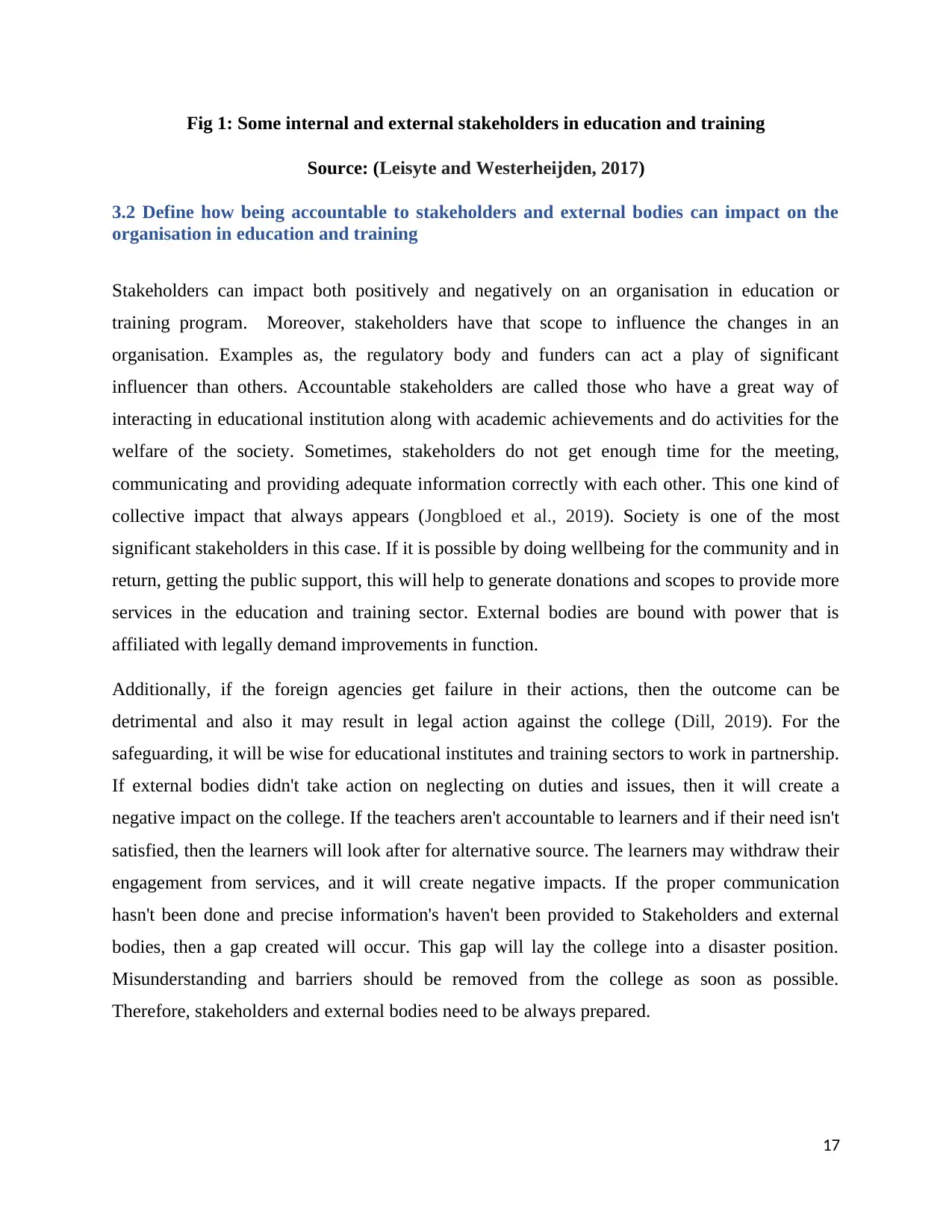
Fig 1: Some internal and external stakeholders in education and training
Source: (Leisyte and Westerheijden, 2017)
3.2 Define how being accountable to stakeholders and external bodies can impact on the
organisation in education and training
Stakeholders can impact both positively and negatively on an organisation in education or
training program. Moreover, stakeholders have that scope to influence the changes in an
organisation. Examples as, the regulatory body and funders can act a play of significant
influencer than others. Accountable stakeholders are called those who have a great way of
interacting in educational institution along with academic achievements and do activities for the
welfare of the society. Sometimes, stakeholders do not get enough time for the meeting,
communicating and providing adequate information correctly with each other. This one kind of
collective impact that always appears (Jongbloed et al., 2019). Society is one of the most
significant stakeholders in this case. If it is possible by doing wellbeing for the community and in
return, getting the public support, this will help to generate donations and scopes to provide more
services in the education and training sector. External bodies are bound with power that is
affiliated with legally demand improvements in function.
Additionally, if the foreign agencies get failure in their actions, then the outcome can be
detrimental and also it may result in legal action against the college (Dill, 2019). For the
safeguarding, it will be wise for educational institutes and training sectors to work in partnership.
If external bodies didn't take action on neglecting on duties and issues, then it will create a
negative impact on the college. If the teachers aren't accountable to learners and if their need isn't
satisfied, then the learners will look after for alternative source. The learners may withdraw their
engagement from services, and it will create negative impacts. If the proper communication
hasn't been done and precise information's haven't been provided to Stakeholders and external
bodies, then a gap created will occur. This gap will lay the college into a disaster position.
Misunderstanding and barriers should be removed from the college as soon as possible.
Therefore, stakeholders and external bodies need to be always prepared.
17
Source: (Leisyte and Westerheijden, 2017)
3.2 Define how being accountable to stakeholders and external bodies can impact on the
organisation in education and training
Stakeholders can impact both positively and negatively on an organisation in education or
training program. Moreover, stakeholders have that scope to influence the changes in an
organisation. Examples as, the regulatory body and funders can act a play of significant
influencer than others. Accountable stakeholders are called those who have a great way of
interacting in educational institution along with academic achievements and do activities for the
welfare of the society. Sometimes, stakeholders do not get enough time for the meeting,
communicating and providing adequate information correctly with each other. This one kind of
collective impact that always appears (Jongbloed et al., 2019). Society is one of the most
significant stakeholders in this case. If it is possible by doing wellbeing for the community and in
return, getting the public support, this will help to generate donations and scopes to provide more
services in the education and training sector. External bodies are bound with power that is
affiliated with legally demand improvements in function.
Additionally, if the foreign agencies get failure in their actions, then the outcome can be
detrimental and also it may result in legal action against the college (Dill, 2019). For the
safeguarding, it will be wise for educational institutes and training sectors to work in partnership.
If external bodies didn't take action on neglecting on duties and issues, then it will create a
negative impact on the college. If the teachers aren't accountable to learners and if their need isn't
satisfied, then the learners will look after for alternative source. The learners may withdraw their
engagement from services, and it will create negative impacts. If the proper communication
hasn't been done and precise information's haven't been provided to Stakeholders and external
bodies, then a gap created will occur. This gap will lay the college into a disaster position.
Misunderstanding and barriers should be removed from the college as soon as possible.
Therefore, stakeholders and external bodies need to be always prepared.
17
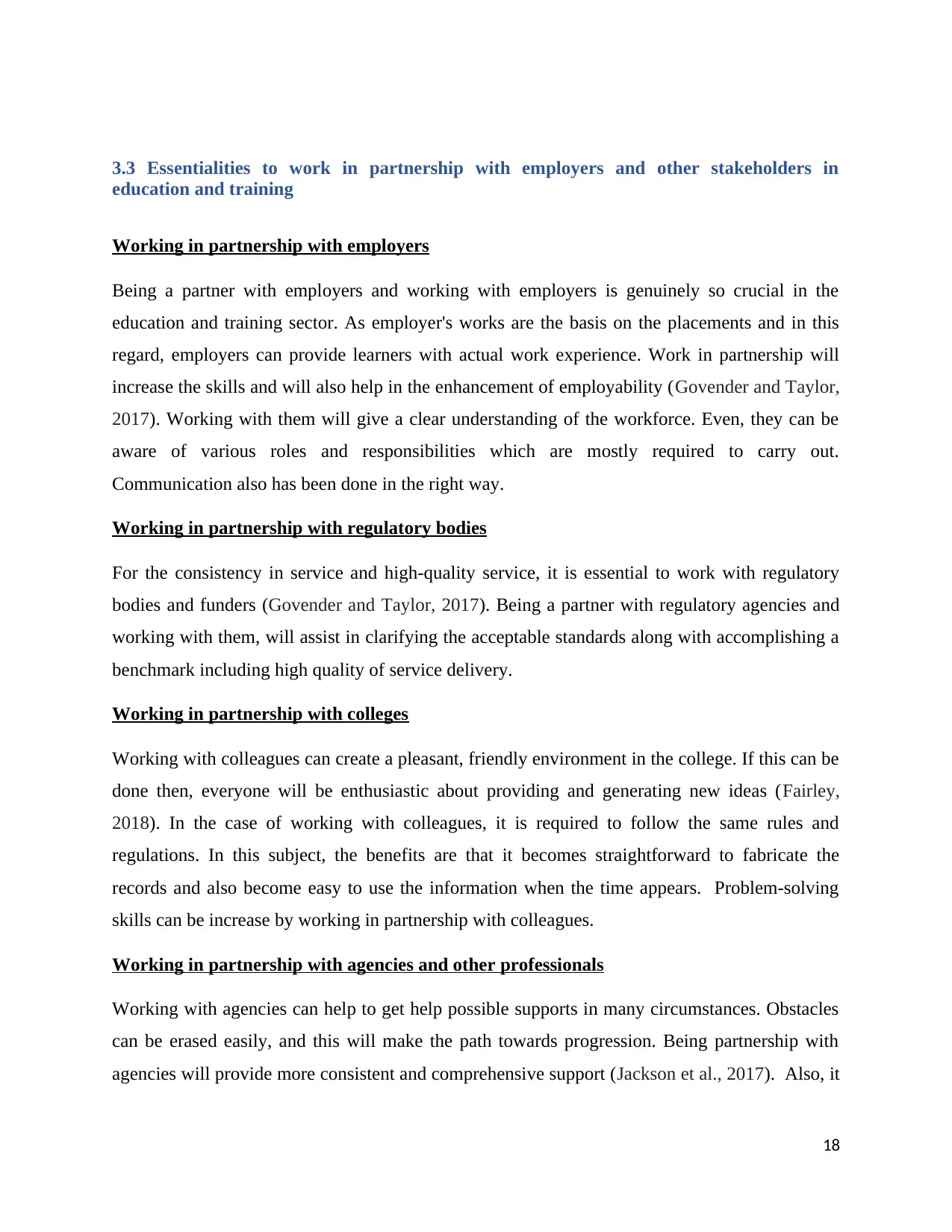
3.3 Essentialities to work in partnership with employers and other stakeholders in
education and training
Working in partnership with employers
Being a partner with employers and working with employers is genuinely so crucial in the
education and training sector. As employer's works are the basis on the placements and in this
regard, employers can provide learners with actual work experience. Work in partnership will
increase the skills and will also help in the enhancement of employability (Govender and Taylor,
2017). Working with them will give a clear understanding of the workforce. Even, they can be
aware of various roles and responsibilities which are mostly required to carry out.
Communication also has been done in the right way.
Working in partnership with regulatory bodies
For the consistency in service and high-quality service, it is essential to work with regulatory
bodies and funders (Govender and Taylor, 2017). Being a partner with regulatory agencies and
working with them, will assist in clarifying the acceptable standards along with accomplishing a
benchmark including high quality of service delivery.
Working in partnership with colleges
Working with colleagues can create a pleasant, friendly environment in the college. If this can be
done then, everyone will be enthusiastic about providing and generating new ideas (Fairley,
2018). In the case of working with colleagues, it is required to follow the same rules and
regulations. In this subject, the benefits are that it becomes straightforward to fabricate the
records and also become easy to use the information when the time appears. Problem-solving
skills can be increase by working in partnership with colleagues.
Working in partnership with agencies and other professionals
Working with agencies can help to get help possible supports in many circumstances. Obstacles
can be erased easily, and this will make the path towards progression. Being partnership with
agencies will provide more consistent and comprehensive support (Jackson et al., 2017). Also, it
18
education and training
Working in partnership with employers
Being a partner with employers and working with employers is genuinely so crucial in the
education and training sector. As employer's works are the basis on the placements and in this
regard, employers can provide learners with actual work experience. Work in partnership will
increase the skills and will also help in the enhancement of employability (Govender and Taylor,
2017). Working with them will give a clear understanding of the workforce. Even, they can be
aware of various roles and responsibilities which are mostly required to carry out.
Communication also has been done in the right way.
Working in partnership with regulatory bodies
For the consistency in service and high-quality service, it is essential to work with regulatory
bodies and funders (Govender and Taylor, 2017). Being a partner with regulatory agencies and
working with them, will assist in clarifying the acceptable standards along with accomplishing a
benchmark including high quality of service delivery.
Working in partnership with colleges
Working with colleagues can create a pleasant, friendly environment in the college. If this can be
done then, everyone will be enthusiastic about providing and generating new ideas (Fairley,
2018). In the case of working with colleagues, it is required to follow the same rules and
regulations. In this subject, the benefits are that it becomes straightforward to fabricate the
records and also become easy to use the information when the time appears. Problem-solving
skills can be increase by working in partnership with colleagues.
Working in partnership with agencies and other professionals
Working with agencies can help to get help possible supports in many circumstances. Obstacles
can be erased easily, and this will make the path towards progression. Being partnership with
agencies will provide more consistent and comprehensive support (Jackson et al., 2017). Also, it
18
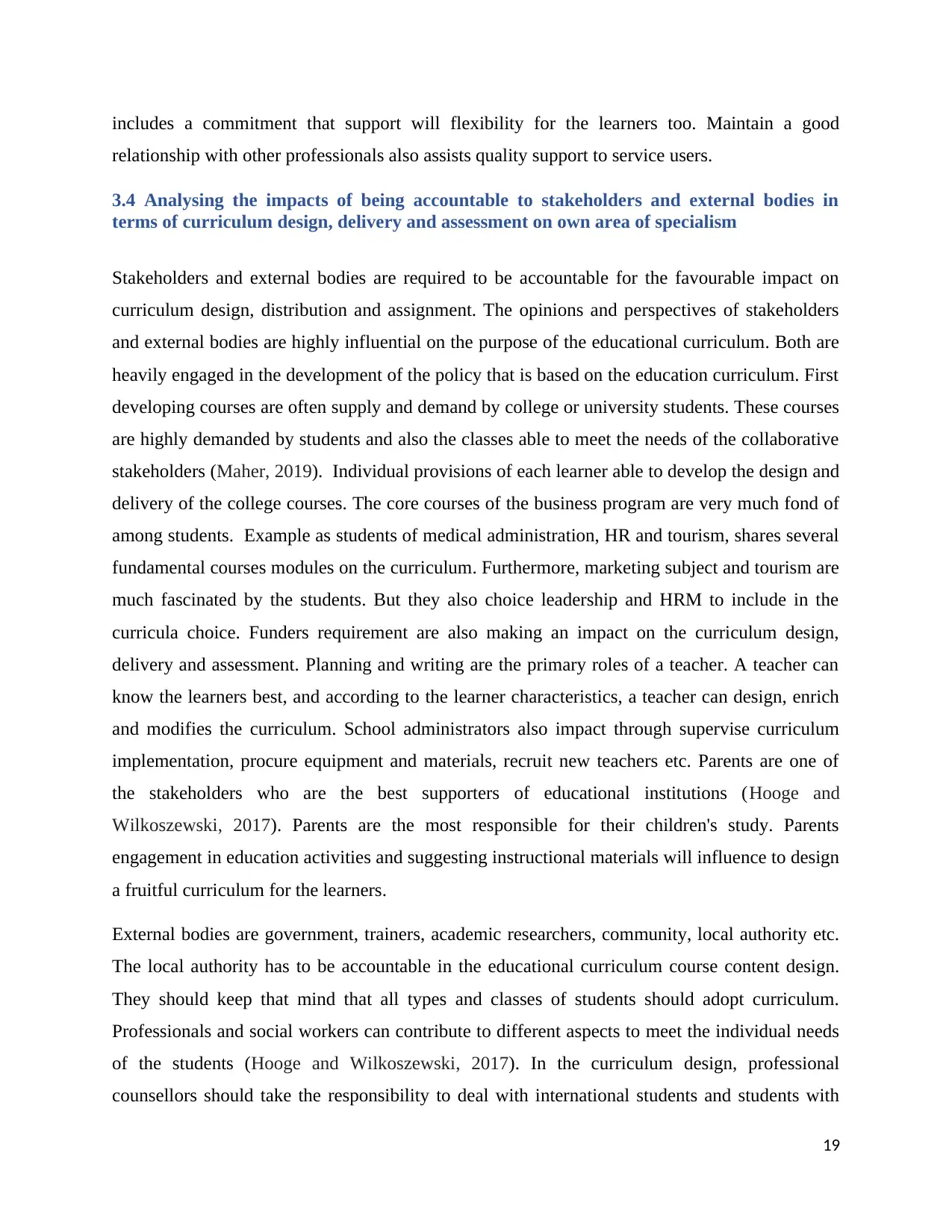
includes a commitment that support will flexibility for the learners too. Maintain a good
relationship with other professionals also assists quality support to service users.
3.4 Analysing the impacts of being accountable to stakeholders and external bodies in
terms of curriculum design, delivery and assessment on own area of specialism
Stakeholders and external bodies are required to be accountable for the favourable impact on
curriculum design, distribution and assignment. The opinions and perspectives of stakeholders
and external bodies are highly influential on the purpose of the educational curriculum. Both are
heavily engaged in the development of the policy that is based on the education curriculum. First
developing courses are often supply and demand by college or university students. These courses
are highly demanded by students and also the classes able to meet the needs of the collaborative
stakeholders (Maher, 2019). Individual provisions of each learner able to develop the design and
delivery of the college courses. The core courses of the business program are very much fond of
among students. Example as students of medical administration, HR and tourism, shares several
fundamental courses modules on the curriculum. Furthermore, marketing subject and tourism are
much fascinated by the students. But they also choice leadership and HRM to include in the
curricula choice. Funders requirement are also making an impact on the curriculum design,
delivery and assessment. Planning and writing are the primary roles of a teacher. A teacher can
know the learners best, and according to the learner characteristics, a teacher can design, enrich
and modifies the curriculum. School administrators also impact through supervise curriculum
implementation, procure equipment and materials, recruit new teachers etc. Parents are one of
the stakeholders who are the best supporters of educational institutions (Hooge and
Wilkoszewski, 2017). Parents are the most responsible for their children's study. Parents
engagement in education activities and suggesting instructional materials will influence to design
a fruitful curriculum for the learners.
External bodies are government, trainers, academic researchers, community, local authority etc.
The local authority has to be accountable in the educational curriculum course content design.
They should keep that mind that all types and classes of students should adopt curriculum.
Professionals and social workers can contribute to different aspects to meet the individual needs
of the students (Hooge and Wilkoszewski, 2017). In the curriculum design, professional
counsellors should take the responsibility to deal with international students and students with
19
relationship with other professionals also assists quality support to service users.
3.4 Analysing the impacts of being accountable to stakeholders and external bodies in
terms of curriculum design, delivery and assessment on own area of specialism
Stakeholders and external bodies are required to be accountable for the favourable impact on
curriculum design, distribution and assignment. The opinions and perspectives of stakeholders
and external bodies are highly influential on the purpose of the educational curriculum. Both are
heavily engaged in the development of the policy that is based on the education curriculum. First
developing courses are often supply and demand by college or university students. These courses
are highly demanded by students and also the classes able to meet the needs of the collaborative
stakeholders (Maher, 2019). Individual provisions of each learner able to develop the design and
delivery of the college courses. The core courses of the business program are very much fond of
among students. Example as students of medical administration, HR and tourism, shares several
fundamental courses modules on the curriculum. Furthermore, marketing subject and tourism are
much fascinated by the students. But they also choice leadership and HRM to include in the
curricula choice. Funders requirement are also making an impact on the curriculum design,
delivery and assessment. Planning and writing are the primary roles of a teacher. A teacher can
know the learners best, and according to the learner characteristics, a teacher can design, enrich
and modifies the curriculum. School administrators also impact through supervise curriculum
implementation, procure equipment and materials, recruit new teachers etc. Parents are one of
the stakeholders who are the best supporters of educational institutions (Hooge and
Wilkoszewski, 2017). Parents are the most responsible for their children's study. Parents
engagement in education activities and suggesting instructional materials will influence to design
a fruitful curriculum for the learners.
External bodies are government, trainers, academic researchers, community, local authority etc.
The local authority has to be accountable in the educational curriculum course content design.
They should keep that mind that all types and classes of students should adopt curriculum.
Professionals and social workers can contribute to different aspects to meet the individual needs
of the students (Hooge and Wilkoszewski, 2017). In the curriculum design, professional
counsellors should take the responsibility to deal with international students and students with
19
Paraphrase This Document
Need a fresh take? Get an instant paraphrase of this document with our AI Paraphraser
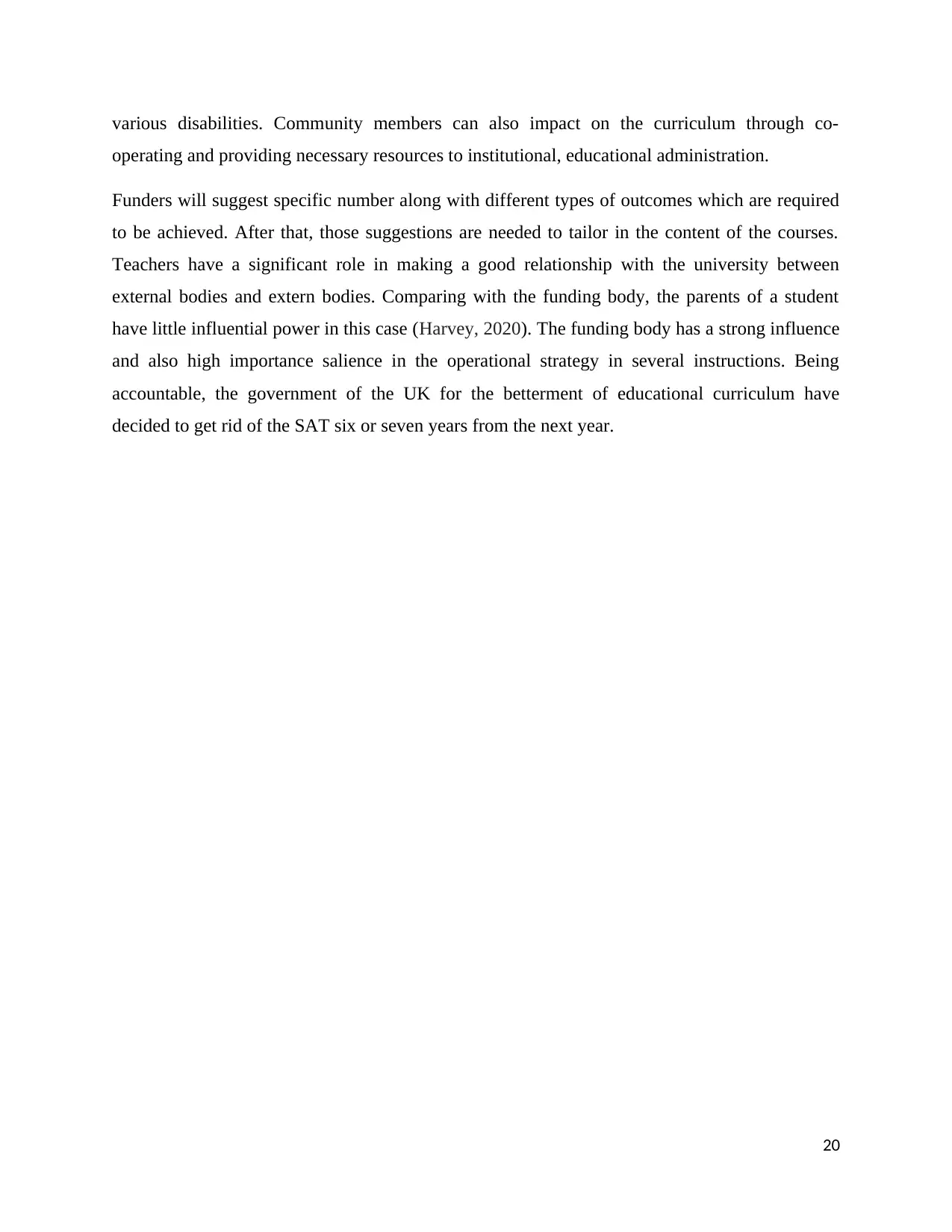
various disabilities. Community members can also impact on the curriculum through co-
operating and providing necessary resources to institutional, educational administration.
Funders will suggest specific number along with different types of outcomes which are required
to be achieved. After that, those suggestions are needed to tailor in the content of the courses.
Teachers have a significant role in making a good relationship with the university between
external bodies and extern bodies. Comparing with the funding body, the parents of a student
have little influential power in this case (Harvey, 2020). The funding body has a strong influence
and also high importance salience in the operational strategy in several instructions. Being
accountable, the government of the UK for the betterment of educational curriculum have
decided to get rid of the SAT six or seven years from the next year.
20
operating and providing necessary resources to institutional, educational administration.
Funders will suggest specific number along with different types of outcomes which are required
to be achieved. After that, those suggestions are needed to tailor in the content of the courses.
Teachers have a significant role in making a good relationship with the university between
external bodies and extern bodies. Comparing with the funding body, the parents of a student
have little influential power in this case (Harvey, 2020). The funding body has a strong influence
and also high importance salience in the operational strategy in several instructions. Being
accountable, the government of the UK for the betterment of educational curriculum have
decided to get rid of the SAT six or seven years from the next year.
20
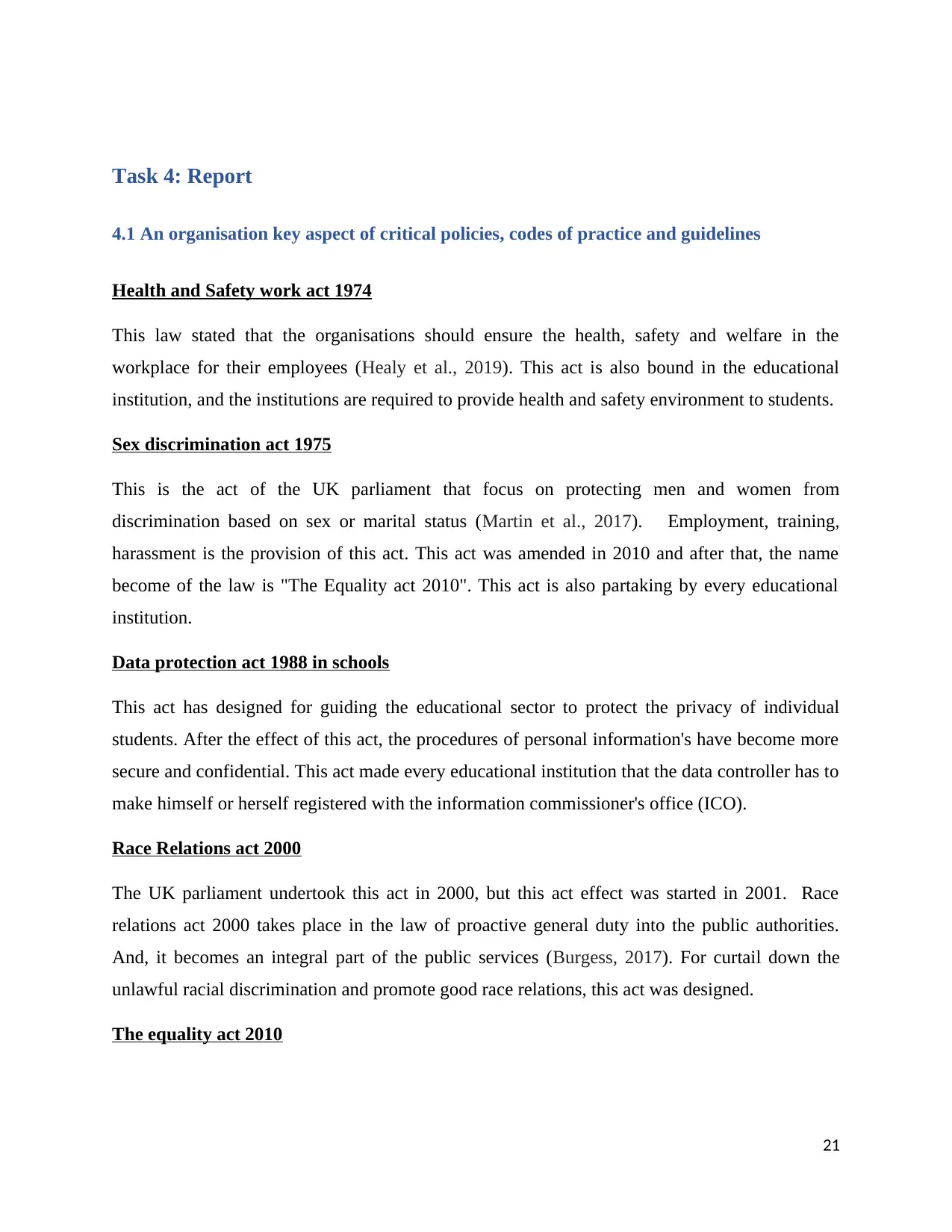
Task 4: Report
4.1 An organisation key aspect of critical policies, codes of practice and guidelines
Health and Safety work act 1974
This law stated that the organisations should ensure the health, safety and welfare in the
workplace for their employees (Healy et al., 2019). This act is also bound in the educational
institution, and the institutions are required to provide health and safety environment to students.
Sex discrimination act 1975
This is the act of the UK parliament that focus on protecting men and women from
discrimination based on sex or marital status (Martin et al., 2017). Employment, training,
harassment is the provision of this act. This act was amended in 2010 and after that, the name
become of the law is "The Equality act 2010". This act is also partaking by every educational
institution.
Data protection act 1988 in schools
This act has designed for guiding the educational sector to protect the privacy of individual
students. After the effect of this act, the procedures of personal information's have become more
secure and confidential. This act made every educational institution that the data controller has to
make himself or herself registered with the information commissioner's office (ICO).
Race Relations act 2000
The UK parliament undertook this act in 2000, but this act effect was started in 2001. Race
relations act 2000 takes place in the law of proactive general duty into the public authorities.
And, it becomes an integral part of the public services (Burgess, 2017). For curtail down the
unlawful racial discrimination and promote good race relations, this act was designed.
The equality act 2010
21
4.1 An organisation key aspect of critical policies, codes of practice and guidelines
Health and Safety work act 1974
This law stated that the organisations should ensure the health, safety and welfare in the
workplace for their employees (Healy et al., 2019). This act is also bound in the educational
institution, and the institutions are required to provide health and safety environment to students.
Sex discrimination act 1975
This is the act of the UK parliament that focus on protecting men and women from
discrimination based on sex or marital status (Martin et al., 2017). Employment, training,
harassment is the provision of this act. This act was amended in 2010 and after that, the name
become of the law is "The Equality act 2010". This act is also partaking by every educational
institution.
Data protection act 1988 in schools
This act has designed for guiding the educational sector to protect the privacy of individual
students. After the effect of this act, the procedures of personal information's have become more
secure and confidential. This act made every educational institution that the data controller has to
make himself or herself registered with the information commissioner's office (ICO).
Race Relations act 2000
The UK parliament undertook this act in 2000, but this act effect was started in 2001. Race
relations act 2000 takes place in the law of proactive general duty into the public authorities.
And, it becomes an integral part of the public services (Burgess, 2017). For curtail down the
unlawful racial discrimination and promote good race relations, this act was designed.
The equality act 2010
21
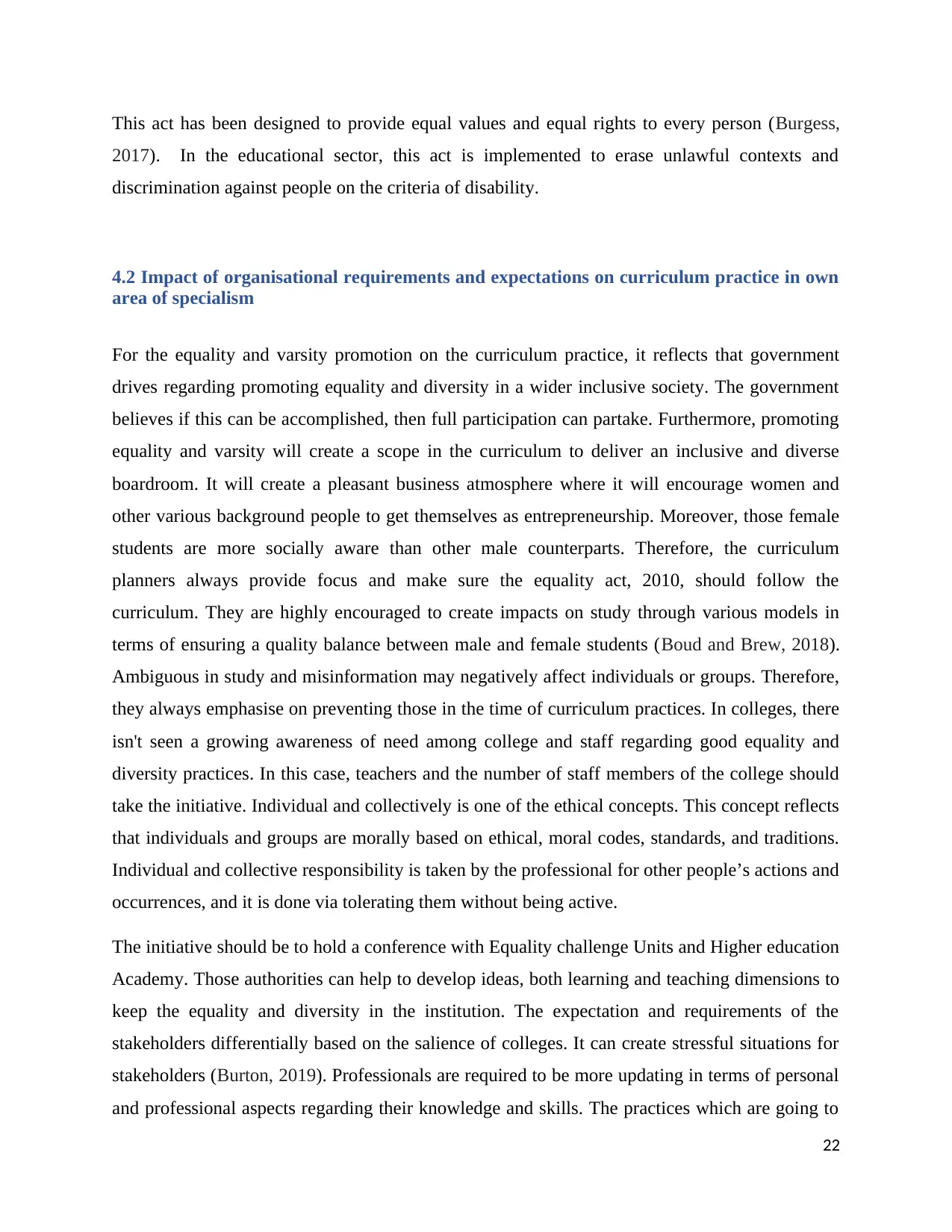
This act has been designed to provide equal values and equal rights to every person (Burgess,
2017). In the educational sector, this act is implemented to erase unlawful contexts and
discrimination against people on the criteria of disability.
4.2 Impact of organisational requirements and expectations on curriculum practice in own
area of specialism
For the equality and varsity promotion on the curriculum practice, it reflects that government
drives regarding promoting equality and diversity in a wider inclusive society. The government
believes if this can be accomplished, then full participation can partake. Furthermore, promoting
equality and varsity will create a scope in the curriculum to deliver an inclusive and diverse
boardroom. It will create a pleasant business atmosphere where it will encourage women and
other various background people to get themselves as entrepreneurship. Moreover, those female
students are more socially aware than other male counterparts. Therefore, the curriculum
planners always provide focus and make sure the equality act, 2010, should follow the
curriculum. They are highly encouraged to create impacts on study through various models in
terms of ensuring a quality balance between male and female students (Boud and Brew, 2018).
Ambiguous in study and misinformation may negatively affect individuals or groups. Therefore,
they always emphasise on preventing those in the time of curriculum practices. In colleges, there
isn't seen a growing awareness of need among college and staff regarding good equality and
diversity practices. In this case, teachers and the number of staff members of the college should
take the initiative. Individual and collectively is one of the ethical concepts. This concept reflects
that individuals and groups are morally based on ethical, moral codes, standards, and traditions.
Individual and collective responsibility is taken by the professional for other people’s actions and
occurrences, and it is done via tolerating them without being active.
The initiative should be to hold a conference with Equality challenge Units and Higher education
Academy. Those authorities can help to develop ideas, both learning and teaching dimensions to
keep the equality and diversity in the institution. The expectation and requirements of the
stakeholders differentially based on the salience of colleges. It can create stressful situations for
stakeholders (Burton, 2019). Professionals are required to be more updating in terms of personal
and professional aspects regarding their knowledge and skills. The practices which are going to
22
2017). In the educational sector, this act is implemented to erase unlawful contexts and
discrimination against people on the criteria of disability.
4.2 Impact of organisational requirements and expectations on curriculum practice in own
area of specialism
For the equality and varsity promotion on the curriculum practice, it reflects that government
drives regarding promoting equality and diversity in a wider inclusive society. The government
believes if this can be accomplished, then full participation can partake. Furthermore, promoting
equality and varsity will create a scope in the curriculum to deliver an inclusive and diverse
boardroom. It will create a pleasant business atmosphere where it will encourage women and
other various background people to get themselves as entrepreneurship. Moreover, those female
students are more socially aware than other male counterparts. Therefore, the curriculum
planners always provide focus and make sure the equality act, 2010, should follow the
curriculum. They are highly encouraged to create impacts on study through various models in
terms of ensuring a quality balance between male and female students (Boud and Brew, 2018).
Ambiguous in study and misinformation may negatively affect individuals or groups. Therefore,
they always emphasise on preventing those in the time of curriculum practices. In colleges, there
isn't seen a growing awareness of need among college and staff regarding good equality and
diversity practices. In this case, teachers and the number of staff members of the college should
take the initiative. Individual and collectively is one of the ethical concepts. This concept reflects
that individuals and groups are morally based on ethical, moral codes, standards, and traditions.
Individual and collective responsibility is taken by the professional for other people’s actions and
occurrences, and it is done via tolerating them without being active.
The initiative should be to hold a conference with Equality challenge Units and Higher education
Academy. Those authorities can help to develop ideas, both learning and teaching dimensions to
keep the equality and diversity in the institution. The expectation and requirements of the
stakeholders differentially based on the salience of colleges. It can create stressful situations for
stakeholders (Burton, 2019). Professionals are required to be more updating in terms of personal
and professional aspects regarding their knowledge and skills. The practices which are going to
22
Secure Best Marks with AI Grader
Need help grading? Try our AI Grader for instant feedback on your assignments.
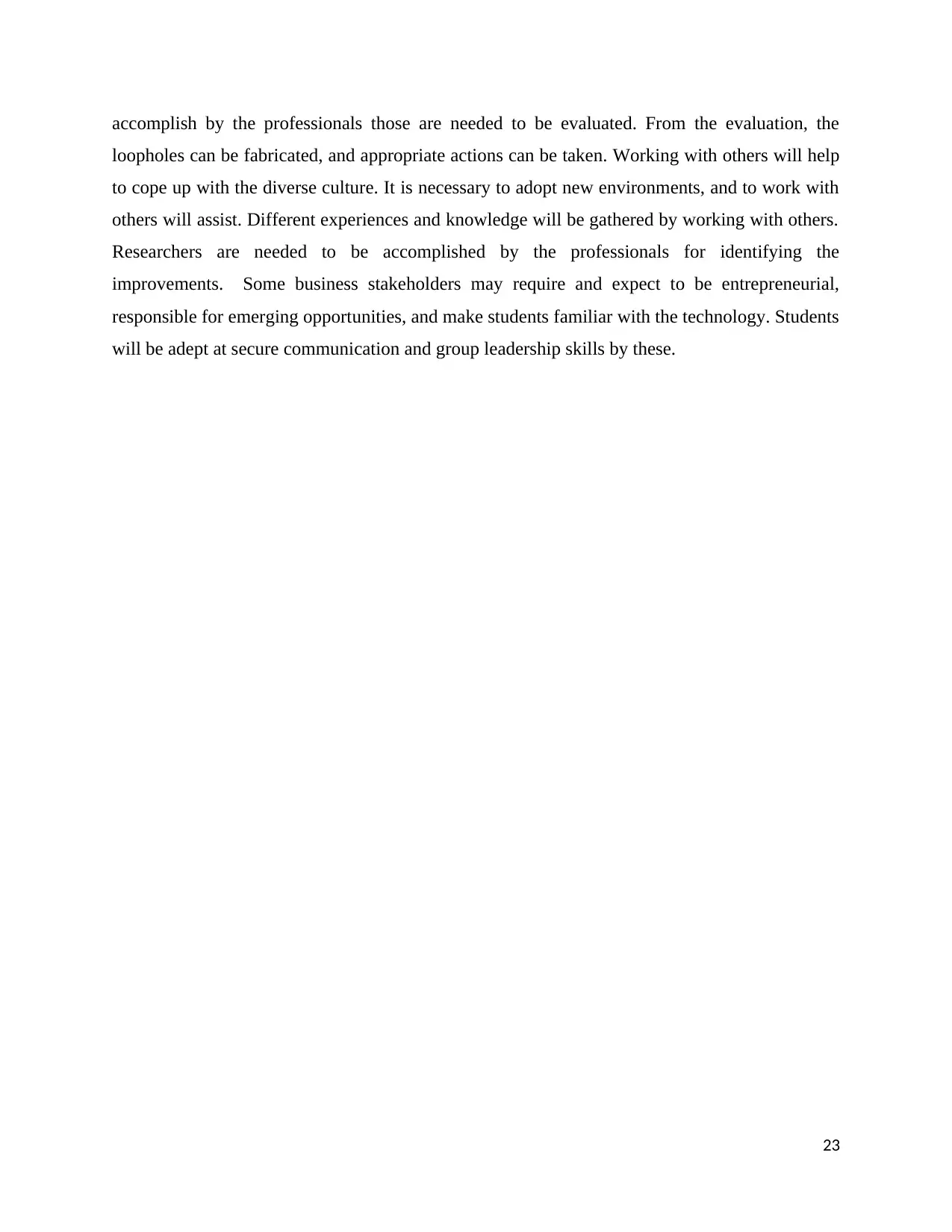
accomplish by the professionals those are needed to be evaluated. From the evaluation, the
loopholes can be fabricated, and appropriate actions can be taken. Working with others will help
to cope up with the diverse culture. It is necessary to adopt new environments, and to work with
others will assist. Different experiences and knowledge will be gathered by working with others.
Researchers are needed to be accomplished by the professionals for identifying the
improvements. Some business stakeholders may require and expect to be entrepreneurial,
responsible for emerging opportunities, and make students familiar with the technology. Students
will be adept at secure communication and group leadership skills by these.
23
loopholes can be fabricated, and appropriate actions can be taken. Working with others will help
to cope up with the diverse culture. It is necessary to adopt new environments, and to work with
others will assist. Different experiences and knowledge will be gathered by working with others.
Researchers are needed to be accomplished by the professionals for identifying the
improvements. Some business stakeholders may require and expect to be entrepreneurial,
responsible for emerging opportunities, and make students familiar with the technology. Students
will be adept at secure communication and group leadership skills by these.
23
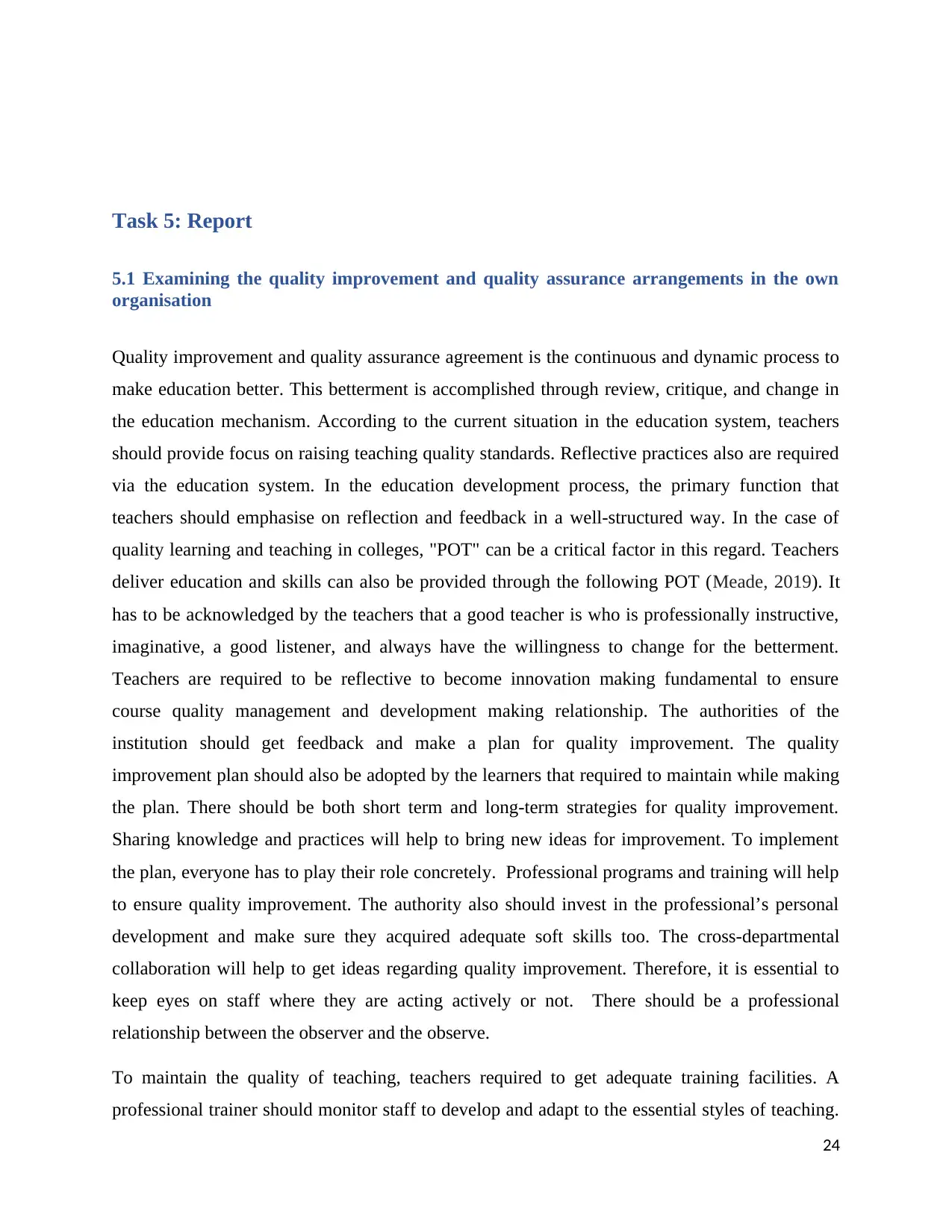
Task 5: Report
5.1 Examining the quality improvement and quality assurance arrangements in the own
organisation
Quality improvement and quality assurance agreement is the continuous and dynamic process to
make education better. This betterment is accomplished through review, critique, and change in
the education mechanism. According to the current situation in the education system, teachers
should provide focus on raising teaching quality standards. Reflective practices also are required
via the education system. In the education development process, the primary function that
teachers should emphasise on reflection and feedback in a well-structured way. In the case of
quality learning and teaching in colleges, "POT" can be a critical factor in this regard. Teachers
deliver education and skills can also be provided through the following POT (Meade, 2019). It
has to be acknowledged by the teachers that a good teacher is who is professionally instructive,
imaginative, a good listener, and always have the willingness to change for the betterment.
Teachers are required to be reflective to become innovation making fundamental to ensure
course quality management and development making relationship. The authorities of the
institution should get feedback and make a plan for quality improvement. The quality
improvement plan should also be adopted by the learners that required to maintain while making
the plan. There should be both short term and long-term strategies for quality improvement.
Sharing knowledge and practices will help to bring new ideas for improvement. To implement
the plan, everyone has to play their role concretely. Professional programs and training will help
to ensure quality improvement. The authority also should invest in the professional’s personal
development and make sure they acquired adequate soft skills too. The cross-departmental
collaboration will help to get ideas regarding quality improvement. Therefore, it is essential to
keep eyes on staff where they are acting actively or not. There should be a professional
relationship between the observer and the observe.
To maintain the quality of teaching, teachers required to get adequate training facilities. A
professional trainer should monitor staff to develop and adapt to the essential styles of teaching.
24
5.1 Examining the quality improvement and quality assurance arrangements in the own
organisation
Quality improvement and quality assurance agreement is the continuous and dynamic process to
make education better. This betterment is accomplished through review, critique, and change in
the education mechanism. According to the current situation in the education system, teachers
should provide focus on raising teaching quality standards. Reflective practices also are required
via the education system. In the education development process, the primary function that
teachers should emphasise on reflection and feedback in a well-structured way. In the case of
quality learning and teaching in colleges, "POT" can be a critical factor in this regard. Teachers
deliver education and skills can also be provided through the following POT (Meade, 2019). It
has to be acknowledged by the teachers that a good teacher is who is professionally instructive,
imaginative, a good listener, and always have the willingness to change for the betterment.
Teachers are required to be reflective to become innovation making fundamental to ensure
course quality management and development making relationship. The authorities of the
institution should get feedback and make a plan for quality improvement. The quality
improvement plan should also be adopted by the learners that required to maintain while making
the plan. There should be both short term and long-term strategies for quality improvement.
Sharing knowledge and practices will help to bring new ideas for improvement. To implement
the plan, everyone has to play their role concretely. Professional programs and training will help
to ensure quality improvement. The authority also should invest in the professional’s personal
development and make sure they acquired adequate soft skills too. The cross-departmental
collaboration will help to get ideas regarding quality improvement. Therefore, it is essential to
keep eyes on staff where they are acting actively or not. There should be a professional
relationship between the observer and the observe.
To maintain the quality of teaching, teachers required to get adequate training facilities. A
professional trainer should monitor staff to develop and adapt to the essential styles of teaching.
24
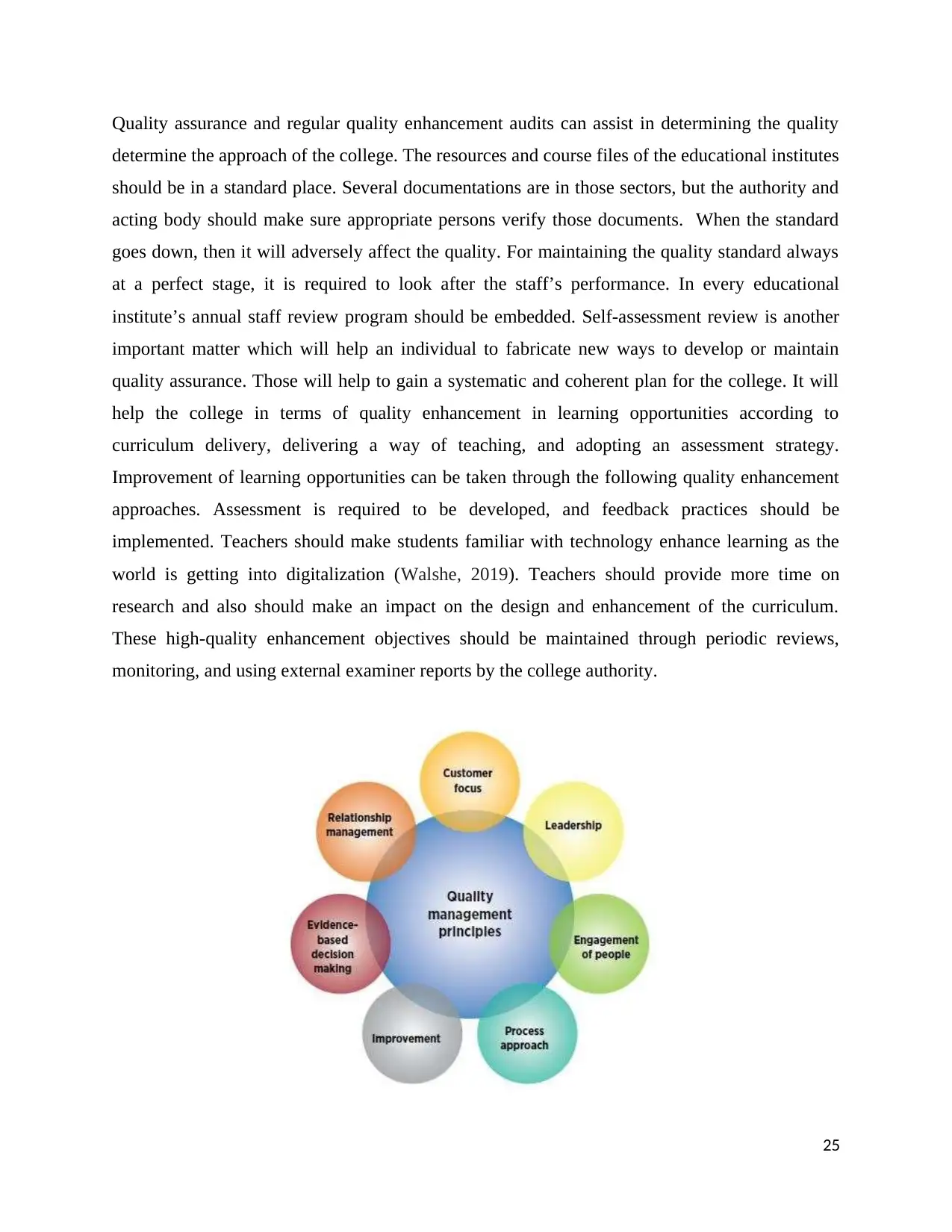
Quality assurance and regular quality enhancement audits can assist in determining the quality
determine the approach of the college. The resources and course files of the educational institutes
should be in a standard place. Several documentations are in those sectors, but the authority and
acting body should make sure appropriate persons verify those documents. When the standard
goes down, then it will adversely affect the quality. For maintaining the quality standard always
at a perfect stage, it is required to look after the staff’s performance. In every educational
institute’s annual staff review program should be embedded. Self-assessment review is another
important matter which will help an individual to fabricate new ways to develop or maintain
quality assurance. Those will help to gain a systematic and coherent plan for the college. It will
help the college in terms of quality enhancement in learning opportunities according to
curriculum delivery, delivering a way of teaching, and adopting an assessment strategy.
Improvement of learning opportunities can be taken through the following quality enhancement
approaches. Assessment is required to be developed, and feedback practices should be
implemented. Teachers should make students familiar with technology enhance learning as the
world is getting into digitalization (Walshe, 2019). Teachers should provide more time on
research and also should make an impact on the design and enhancement of the curriculum.
These high-quality enhancement objectives should be maintained through periodic reviews,
monitoring, and using external examiner reports by the college authority.
25
determine the approach of the college. The resources and course files of the educational institutes
should be in a standard place. Several documentations are in those sectors, but the authority and
acting body should make sure appropriate persons verify those documents. When the standard
goes down, then it will adversely affect the quality. For maintaining the quality standard always
at a perfect stage, it is required to look after the staff’s performance. In every educational
institute’s annual staff review program should be embedded. Self-assessment review is another
important matter which will help an individual to fabricate new ways to develop or maintain
quality assurance. Those will help to gain a systematic and coherent plan for the college. It will
help the college in terms of quality enhancement in learning opportunities according to
curriculum delivery, delivering a way of teaching, and adopting an assessment strategy.
Improvement of learning opportunities can be taken through the following quality enhancement
approaches. Assessment is required to be developed, and feedback practices should be
implemented. Teachers should make students familiar with technology enhance learning as the
world is getting into digitalization (Walshe, 2019). Teachers should provide more time on
research and also should make an impact on the design and enhancement of the curriculum.
These high-quality enhancement objectives should be maintained through periodic reviews,
monitoring, and using external examiner reports by the college authority.
25
Paraphrase This Document
Need a fresh take? Get an instant paraphrase of this document with our AI Paraphraser
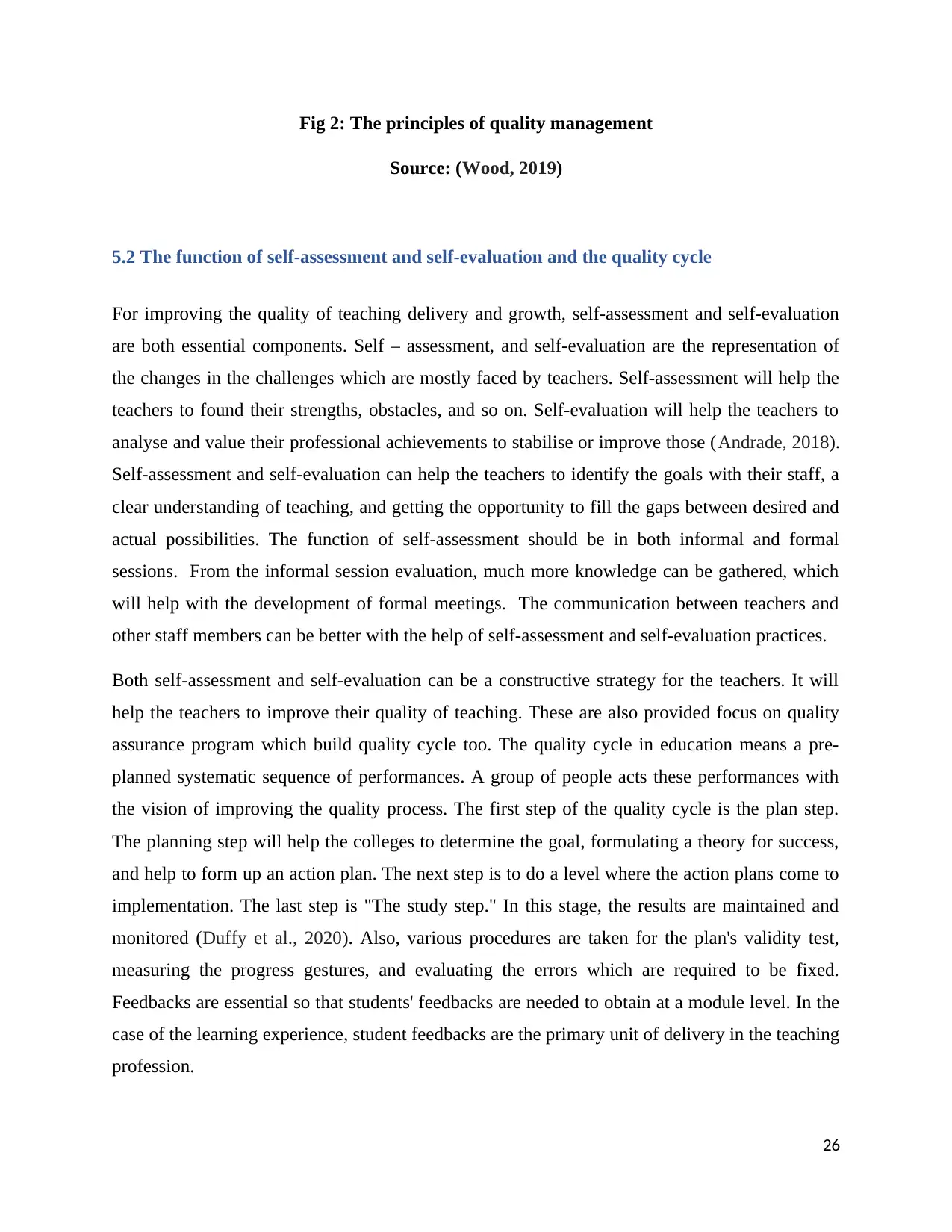
Fig 2: The principles of quality management
Source: (Wood, 2019)
5.2 The function of self-assessment and self-evaluation and the quality cycle
For improving the quality of teaching delivery and growth, self-assessment and self-evaluation
are both essential components. Self – assessment, and self-evaluation are the representation of
the changes in the challenges which are mostly faced by teachers. Self-assessment will help the
teachers to found their strengths, obstacles, and so on. Self-evaluation will help the teachers to
analyse and value their professional achievements to stabilise or improve those (Andrade, 2018).
Self-assessment and self-evaluation can help the teachers to identify the goals with their staff, a
clear understanding of teaching, and getting the opportunity to fill the gaps between desired and
actual possibilities. The function of self-assessment should be in both informal and formal
sessions. From the informal session evaluation, much more knowledge can be gathered, which
will help with the development of formal meetings. The communication between teachers and
other staff members can be better with the help of self-assessment and self-evaluation practices.
Both self-assessment and self-evaluation can be a constructive strategy for the teachers. It will
help the teachers to improve their quality of teaching. These are also provided focus on quality
assurance program which build quality cycle too. The quality cycle in education means a pre-
planned systematic sequence of performances. A group of people acts these performances with
the vision of improving the quality process. The first step of the quality cycle is the plan step.
The planning step will help the colleges to determine the goal, formulating a theory for success,
and help to form up an action plan. The next step is to do a level where the action plans come to
implementation. The last step is "The study step." In this stage, the results are maintained and
monitored (Duffy et al., 2020). Also, various procedures are taken for the plan's validity test,
measuring the progress gestures, and evaluating the errors which are required to be fixed.
Feedbacks are essential so that students' feedbacks are needed to obtain at a module level. In the
case of the learning experience, student feedbacks are the primary unit of delivery in the teaching
profession.
26
Source: (Wood, 2019)
5.2 The function of self-assessment and self-evaluation and the quality cycle
For improving the quality of teaching delivery and growth, self-assessment and self-evaluation
are both essential components. Self – assessment, and self-evaluation are the representation of
the changes in the challenges which are mostly faced by teachers. Self-assessment will help the
teachers to found their strengths, obstacles, and so on. Self-evaluation will help the teachers to
analyse and value their professional achievements to stabilise or improve those (Andrade, 2018).
Self-assessment and self-evaluation can help the teachers to identify the goals with their staff, a
clear understanding of teaching, and getting the opportunity to fill the gaps between desired and
actual possibilities. The function of self-assessment should be in both informal and formal
sessions. From the informal session evaluation, much more knowledge can be gathered, which
will help with the development of formal meetings. The communication between teachers and
other staff members can be better with the help of self-assessment and self-evaluation practices.
Both self-assessment and self-evaluation can be a constructive strategy for the teachers. It will
help the teachers to improve their quality of teaching. These are also provided focus on quality
assurance program which build quality cycle too. The quality cycle in education means a pre-
planned systematic sequence of performances. A group of people acts these performances with
the vision of improving the quality process. The first step of the quality cycle is the plan step.
The planning step will help the colleges to determine the goal, formulating a theory for success,
and help to form up an action plan. The next step is to do a level where the action plans come to
implementation. The last step is "The study step." In this stage, the results are maintained and
monitored (Duffy et al., 2020). Also, various procedures are taken for the plan's validity test,
measuring the progress gestures, and evaluating the errors which are required to be fixed.
Feedbacks are essential so that students' feedbacks are needed to obtain at a module level. In the
case of the learning experience, student feedbacks are the primary unit of delivery in the teaching
profession.
26
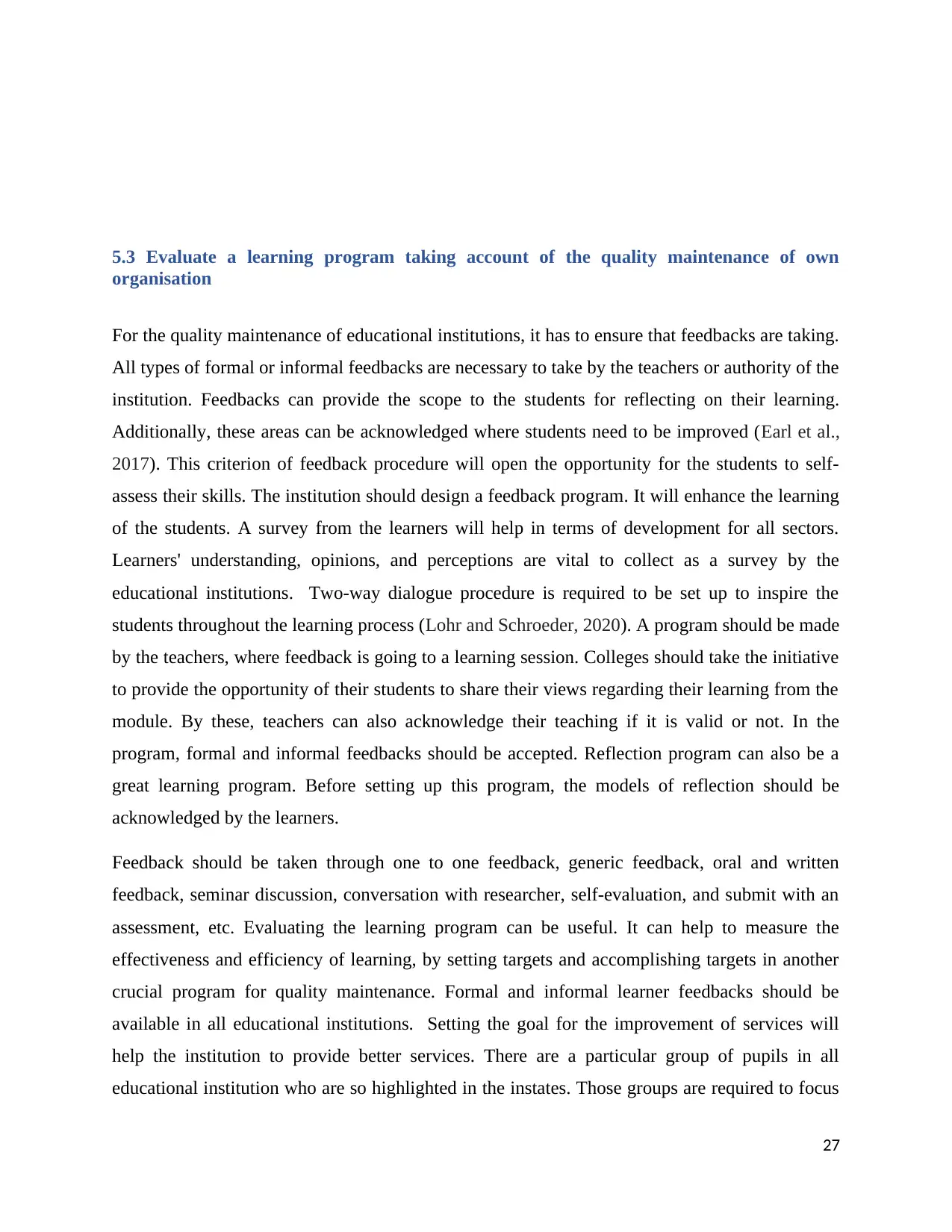
5.3 Evaluate a learning program taking account of the quality maintenance of own
organisation
For the quality maintenance of educational institutions, it has to ensure that feedbacks are taking.
All types of formal or informal feedbacks are necessary to take by the teachers or authority of the
institution. Feedbacks can provide the scope to the students for reflecting on their learning.
Additionally, these areas can be acknowledged where students need to be improved (Earl et al.,
2017). This criterion of feedback procedure will open the opportunity for the students to self-
assess their skills. The institution should design a feedback program. It will enhance the learning
of the students. A survey from the learners will help in terms of development for all sectors.
Learners' understanding, opinions, and perceptions are vital to collect as a survey by the
educational institutions. Two-way dialogue procedure is required to be set up to inspire the
students throughout the learning process (Lohr and Schroeder, 2020). A program should be made
by the teachers, where feedback is going to a learning session. Colleges should take the initiative
to provide the opportunity of their students to share their views regarding their learning from the
module. By these, teachers can also acknowledge their teaching if it is valid or not. In the
program, formal and informal feedbacks should be accepted. Reflection program can also be a
great learning program. Before setting up this program, the models of reflection should be
acknowledged by the learners.
Feedback should be taken through one to one feedback, generic feedback, oral and written
feedback, seminar discussion, conversation with researcher, self-evaluation, and submit with an
assessment, etc. Evaluating the learning program can be useful. It can help to measure the
effectiveness and efficiency of learning, by setting targets and accomplishing targets in another
crucial program for quality maintenance. Formal and informal learner feedbacks should be
available in all educational institutions. Setting the goal for the improvement of services will
help the institution to provide better services. There are a particular group of pupils in all
educational institution who are so highlighted in the instates. Those groups are required to focus
27
organisation
For the quality maintenance of educational institutions, it has to ensure that feedbacks are taking.
All types of formal or informal feedbacks are necessary to take by the teachers or authority of the
institution. Feedbacks can provide the scope to the students for reflecting on their learning.
Additionally, these areas can be acknowledged where students need to be improved (Earl et al.,
2017). This criterion of feedback procedure will open the opportunity for the students to self-
assess their skills. The institution should design a feedback program. It will enhance the learning
of the students. A survey from the learners will help in terms of development for all sectors.
Learners' understanding, opinions, and perceptions are vital to collect as a survey by the
educational institutions. Two-way dialogue procedure is required to be set up to inspire the
students throughout the learning process (Lohr and Schroeder, 2020). A program should be made
by the teachers, where feedback is going to a learning session. Colleges should take the initiative
to provide the opportunity of their students to share their views regarding their learning from the
module. By these, teachers can also acknowledge their teaching if it is valid or not. In the
program, formal and informal feedbacks should be accepted. Reflection program can also be a
great learning program. Before setting up this program, the models of reflection should be
acknowledged by the learners.
Feedback should be taken through one to one feedback, generic feedback, oral and written
feedback, seminar discussion, conversation with researcher, self-evaluation, and submit with an
assessment, etc. Evaluating the learning program can be useful. It can help to measure the
effectiveness and efficiency of learning, by setting targets and accomplishing targets in another
crucial program for quality maintenance. Formal and informal learner feedbacks should be
available in all educational institutions. Setting the goal for the improvement of services will
help the institution to provide better services. There are a particular group of pupils in all
educational institution who are so highlighted in the instates. Those groups are required to focus
27
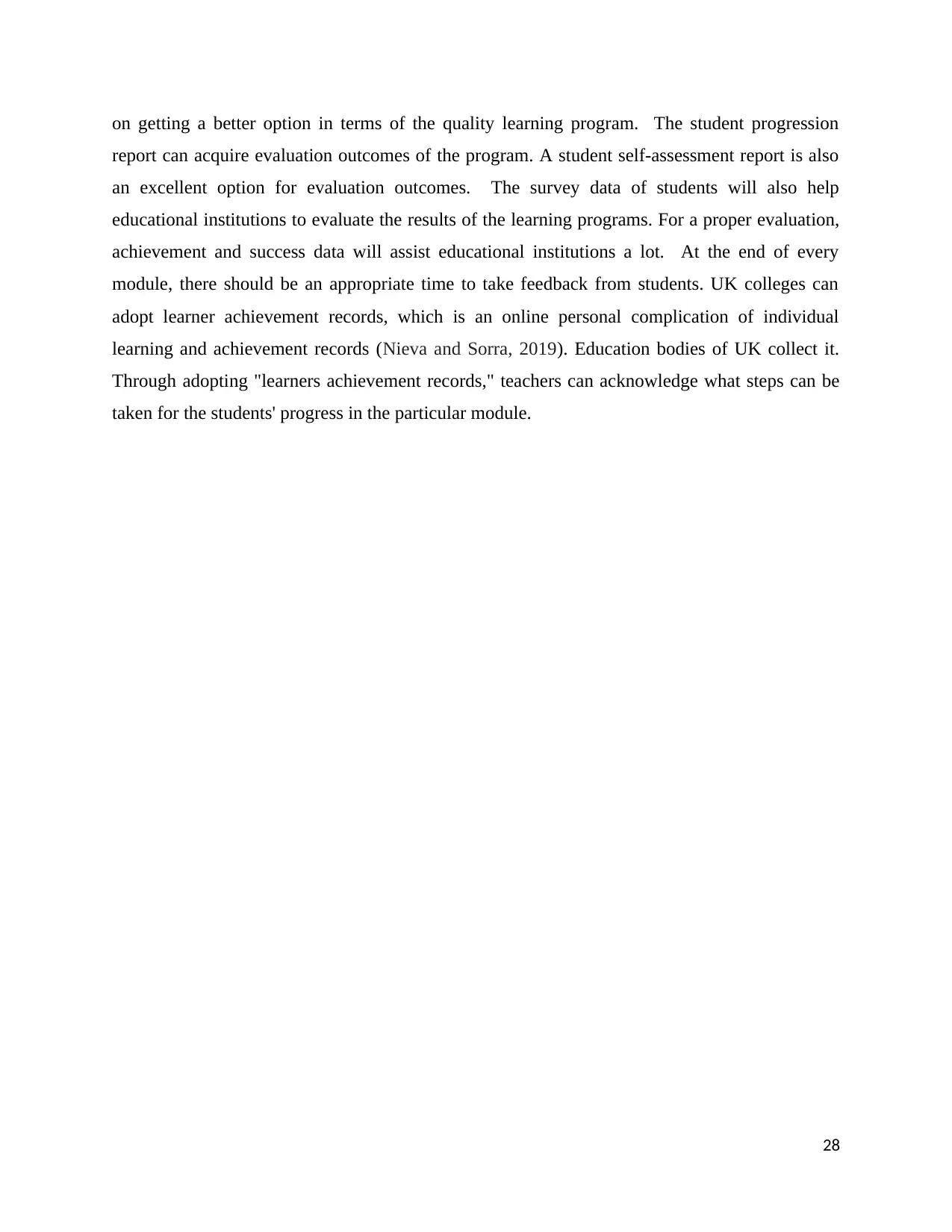
on getting a better option in terms of the quality learning program. The student progression
report can acquire evaluation outcomes of the program. A student self-assessment report is also
an excellent option for evaluation outcomes. The survey data of students will also help
educational institutions to evaluate the results of the learning programs. For a proper evaluation,
achievement and success data will assist educational institutions a lot. At the end of every
module, there should be an appropriate time to take feedback from students. UK colleges can
adopt learner achievement records, which is an online personal complication of individual
learning and achievement records (Nieva and Sorra, 2019). Education bodies of UK collect it.
Through adopting "learners achievement records," teachers can acknowledge what steps can be
taken for the students' progress in the particular module.
28
report can acquire evaluation outcomes of the program. A student self-assessment report is also
an excellent option for evaluation outcomes. The survey data of students will also help
educational institutions to evaluate the results of the learning programs. For a proper evaluation,
achievement and success data will assist educational institutions a lot. At the end of every
module, there should be an appropriate time to take feedback from students. UK colleges can
adopt learner achievement records, which is an online personal complication of individual
learning and achievement records (Nieva and Sorra, 2019). Education bodies of UK collect it.
Through adopting "learners achievement records," teachers can acknowledge what steps can be
taken for the students' progress in the particular module.
28
Secure Best Marks with AI Grader
Need help grading? Try our AI Grader for instant feedback on your assignments.
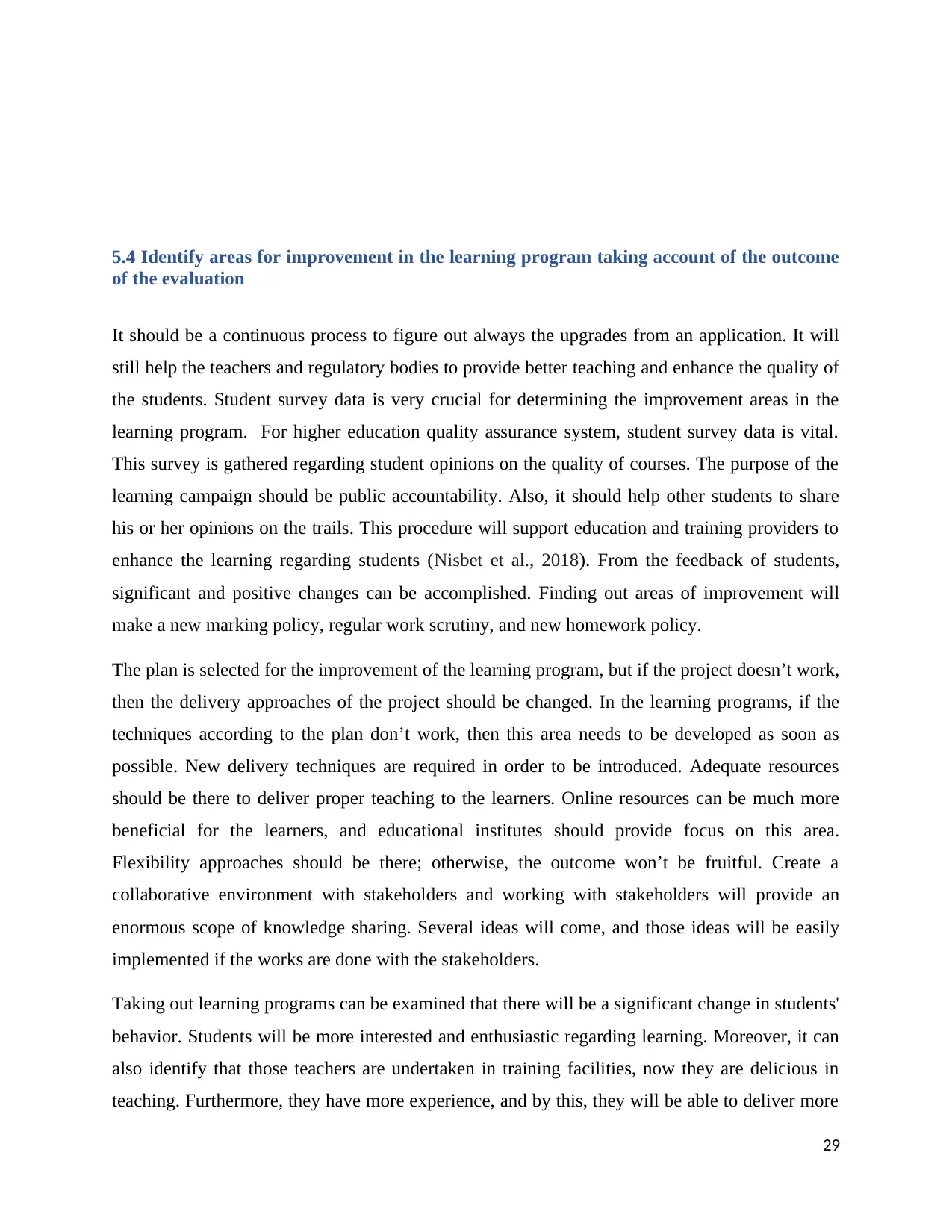
5.4 Identify areas for improvement in the learning program taking account of the outcome
of the evaluation
It should be a continuous process to figure out always the upgrades from an application. It will
still help the teachers and regulatory bodies to provide better teaching and enhance the quality of
the students. Student survey data is very crucial for determining the improvement areas in the
learning program. For higher education quality assurance system, student survey data is vital.
This survey is gathered regarding student opinions on the quality of courses. The purpose of the
learning campaign should be public accountability. Also, it should help other students to share
his or her opinions on the trails. This procedure will support education and training providers to
enhance the learning regarding students (Nisbet et al., 2018). From the feedback of students,
significant and positive changes can be accomplished. Finding out areas of improvement will
make a new marking policy, regular work scrutiny, and new homework policy.
The plan is selected for the improvement of the learning program, but if the project doesn’t work,
then the delivery approaches of the project should be changed. In the learning programs, if the
techniques according to the plan don’t work, then this area needs to be developed as soon as
possible. New delivery techniques are required in order to be introduced. Adequate resources
should be there to deliver proper teaching to the learners. Online resources can be much more
beneficial for the learners, and educational institutes should provide focus on this area.
Flexibility approaches should be there; otherwise, the outcome won’t be fruitful. Create a
collaborative environment with stakeholders and working with stakeholders will provide an
enormous scope of knowledge sharing. Several ideas will come, and those ideas will be easily
implemented if the works are done with the stakeholders.
Taking out learning programs can be examined that there will be a significant change in students'
behavior. Students will be more interested and enthusiastic regarding learning. Moreover, it can
also identify that those teachers are undertaken in training facilities, now they are delicious in
teaching. Furthermore, they have more experience, and by this, they will be able to deliver more
29
of the evaluation
It should be a continuous process to figure out always the upgrades from an application. It will
still help the teachers and regulatory bodies to provide better teaching and enhance the quality of
the students. Student survey data is very crucial for determining the improvement areas in the
learning program. For higher education quality assurance system, student survey data is vital.
This survey is gathered regarding student opinions on the quality of courses. The purpose of the
learning campaign should be public accountability. Also, it should help other students to share
his or her opinions on the trails. This procedure will support education and training providers to
enhance the learning regarding students (Nisbet et al., 2018). From the feedback of students,
significant and positive changes can be accomplished. Finding out areas of improvement will
make a new marking policy, regular work scrutiny, and new homework policy.
The plan is selected for the improvement of the learning program, but if the project doesn’t work,
then the delivery approaches of the project should be changed. In the learning programs, if the
techniques according to the plan don’t work, then this area needs to be developed as soon as
possible. New delivery techniques are required in order to be introduced. Adequate resources
should be there to deliver proper teaching to the learners. Online resources can be much more
beneficial for the learners, and educational institutes should provide focus on this area.
Flexibility approaches should be there; otherwise, the outcome won’t be fruitful. Create a
collaborative environment with stakeholders and working with stakeholders will provide an
enormous scope of knowledge sharing. Several ideas will come, and those ideas will be easily
implemented if the works are done with the stakeholders.
Taking out learning programs can be examined that there will be a significant change in students'
behavior. Students will be more interested and enthusiastic regarding learning. Moreover, it can
also identify that those teachers are undertaken in training facilities, now they are delicious in
teaching. Furthermore, they have more experience, and by this, they will be able to deliver more
29
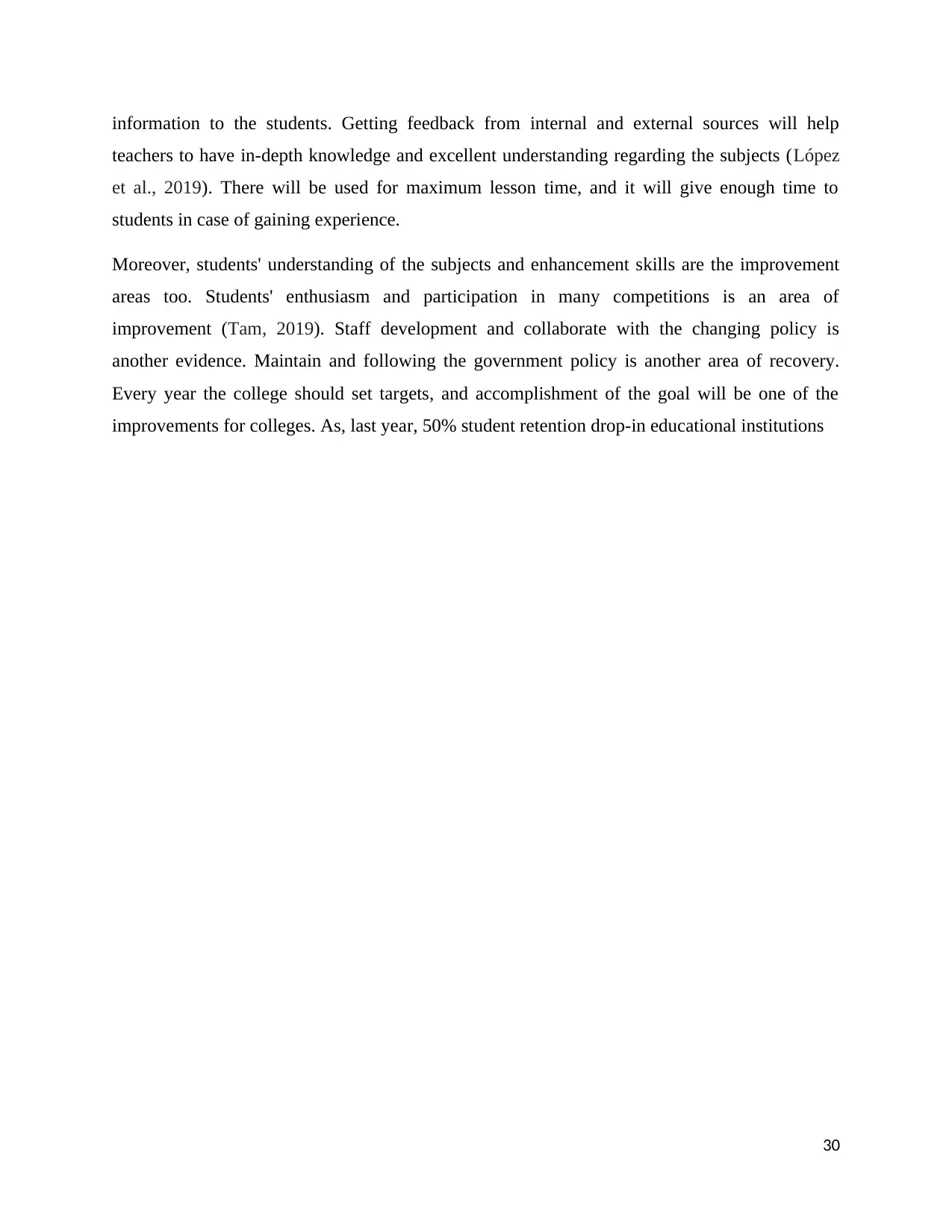
information to the students. Getting feedback from internal and external sources will help
teachers to have in-depth knowledge and excellent understanding regarding the subjects (López
et al., 2019). There will be used for maximum lesson time, and it will give enough time to
students in case of gaining experience.
Moreover, students' understanding of the subjects and enhancement skills are the improvement
areas too. Students' enthusiasm and participation in many competitions is an area of
improvement (Tam, 2019). Staff development and collaborate with the changing policy is
another evidence. Maintain and following the government policy is another area of recovery.
Every year the college should set targets, and accomplishment of the goal will be one of the
improvements for colleges. As, last year, 50% student retention drop-in educational institutions
30
teachers to have in-depth knowledge and excellent understanding regarding the subjects (López
et al., 2019). There will be used for maximum lesson time, and it will give enough time to
students in case of gaining experience.
Moreover, students' understanding of the subjects and enhancement skills are the improvement
areas too. Students' enthusiasm and participation in many competitions is an area of
improvement (Tam, 2019). Staff development and collaborate with the changing policy is
another evidence. Maintain and following the government policy is another area of recovery.
Every year the college should set targets, and accomplishment of the goal will be one of the
improvements for colleges. As, last year, 50% student retention drop-in educational institutions
30
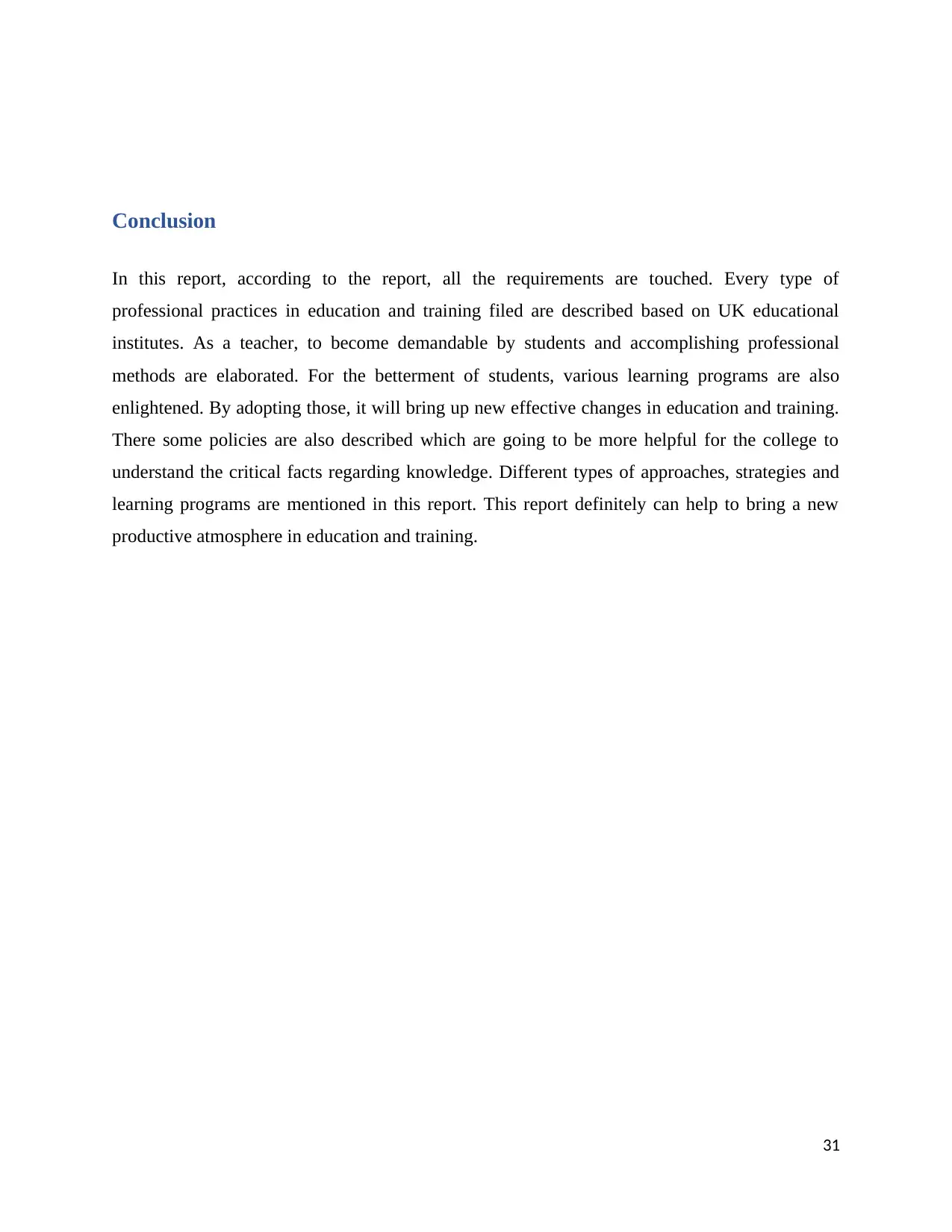
Conclusion
In this report, according to the report, all the requirements are touched. Every type of
professional practices in education and training filed are described based on UK educational
institutes. As a teacher, to become demandable by students and accomplishing professional
methods are elaborated. For the betterment of students, various learning programs are also
enlightened. By adopting those, it will bring up new effective changes in education and training.
There some policies are also described which are going to be more helpful for the college to
understand the critical facts regarding knowledge. Different types of approaches, strategies and
learning programs are mentioned in this report. This report definitely can help to bring a new
productive atmosphere in education and training.
31
In this report, according to the report, all the requirements are touched. Every type of
professional practices in education and training filed are described based on UK educational
institutes. As a teacher, to become demandable by students and accomplishing professional
methods are elaborated. For the betterment of students, various learning programs are also
enlightened. By adopting those, it will bring up new effective changes in education and training.
There some policies are also described which are going to be more helpful for the college to
understand the critical facts regarding knowledge. Different types of approaches, strategies and
learning programs are mentioned in this report. This report definitely can help to bring a new
productive atmosphere in education and training.
31
Paraphrase This Document
Need a fresh take? Get an instant paraphrase of this document with our AI Paraphraser
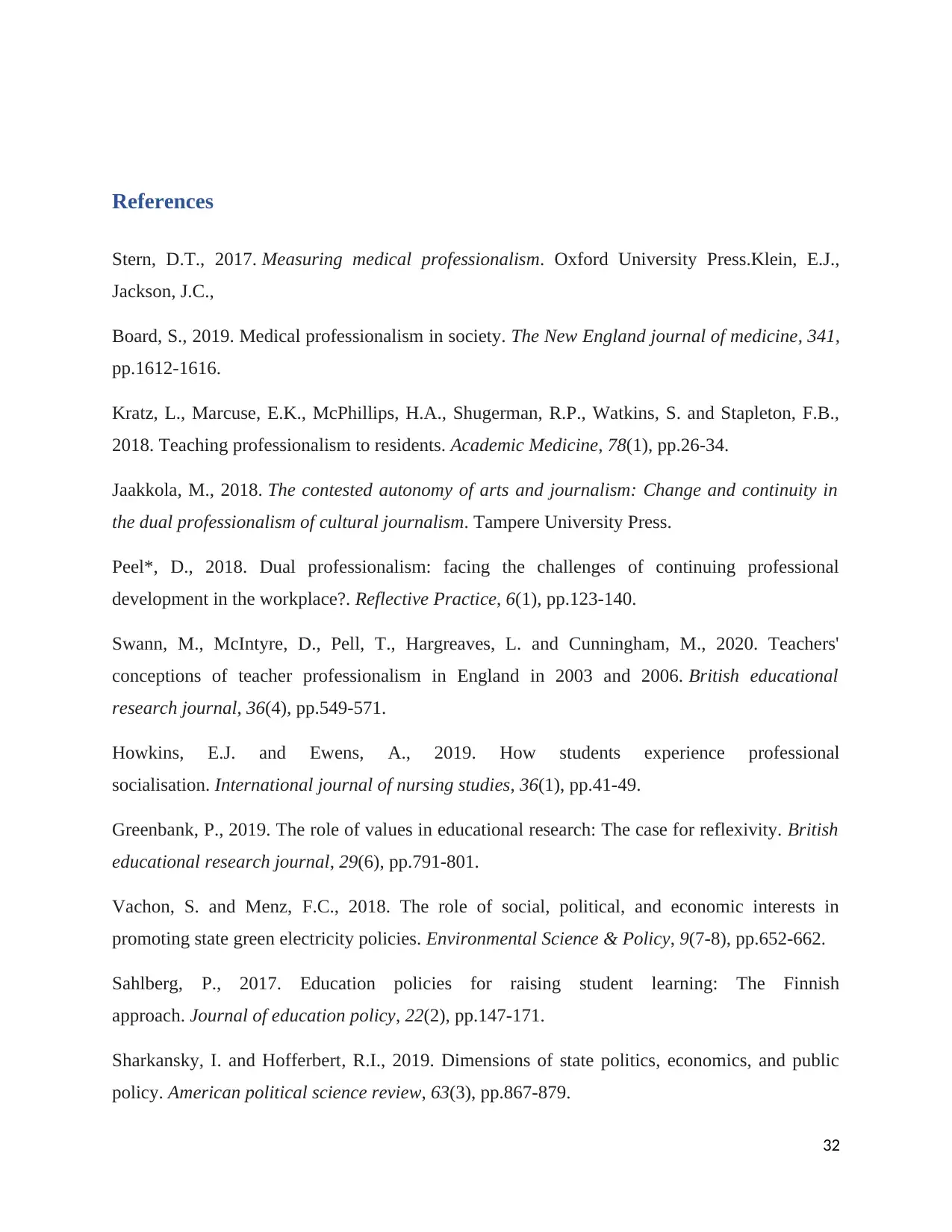
References
Stern, D.T., 2017. Measuring medical professionalism. Oxford University Press.Klein, E.J.,
Jackson, J.C.,
Board, S., 2019. Medical professionalism in society. The New England journal of medicine, 341,
pp.1612-1616.
Kratz, L., Marcuse, E.K., McPhillips, H.A., Shugerman, R.P., Watkins, S. and Stapleton, F.B.,
2018. Teaching professionalism to residents. Academic Medicine, 78(1), pp.26-34.
Jaakkola, M., 2018. The contested autonomy of arts and journalism: Change and continuity in
the dual professionalism of cultural journalism. Tampere University Press.
Peel*, D., 2018. Dual professionalism: facing the challenges of continuing professional
development in the workplace?. Reflective Practice, 6(1), pp.123-140.
Swann, M., McIntyre, D., Pell, T., Hargreaves, L. and Cunningham, M., 2020. Teachers'
conceptions of teacher professionalism in England in 2003 and 2006. British educational
research journal, 36(4), pp.549-571.
Howkins, E.J. and Ewens, A., 2019. How students experience professional
socialisation. International journal of nursing studies, 36(1), pp.41-49.
Greenbank, P., 2019. The role of values in educational research: The case for reflexivity. British
educational research journal, 29(6), pp.791-801.
Vachon, S. and Menz, F.C., 2018. The role of social, political, and economic interests in
promoting state green electricity policies. Environmental Science & Policy, 9(7-8), pp.652-662.
Sahlberg, P., 2017. Education policies for raising student learning: The Finnish
approach. Journal of education policy, 22(2), pp.147-171.
Sharkansky, I. and Hofferbert, R.I., 2019. Dimensions of state politics, economics, and public
policy. American political science review, 63(3), pp.867-879.
32
Stern, D.T., 2017. Measuring medical professionalism. Oxford University Press.Klein, E.J.,
Jackson, J.C.,
Board, S., 2019. Medical professionalism in society. The New England journal of medicine, 341,
pp.1612-1616.
Kratz, L., Marcuse, E.K., McPhillips, H.A., Shugerman, R.P., Watkins, S. and Stapleton, F.B.,
2018. Teaching professionalism to residents. Academic Medicine, 78(1), pp.26-34.
Jaakkola, M., 2018. The contested autonomy of arts and journalism: Change and continuity in
the dual professionalism of cultural journalism. Tampere University Press.
Peel*, D., 2018. Dual professionalism: facing the challenges of continuing professional
development in the workplace?. Reflective Practice, 6(1), pp.123-140.
Swann, M., McIntyre, D., Pell, T., Hargreaves, L. and Cunningham, M., 2020. Teachers'
conceptions of teacher professionalism in England in 2003 and 2006. British educational
research journal, 36(4), pp.549-571.
Howkins, E.J. and Ewens, A., 2019. How students experience professional
socialisation. International journal of nursing studies, 36(1), pp.41-49.
Greenbank, P., 2019. The role of values in educational research: The case for reflexivity. British
educational research journal, 29(6), pp.791-801.
Vachon, S. and Menz, F.C., 2018. The role of social, political, and economic interests in
promoting state green electricity policies. Environmental Science & Policy, 9(7-8), pp.652-662.
Sahlberg, P., 2017. Education policies for raising student learning: The Finnish
approach. Journal of education policy, 22(2), pp.147-171.
Sharkansky, I. and Hofferbert, R.I., 2019. Dimensions of state politics, economics, and public
policy. American political science review, 63(3), pp.867-879.
32
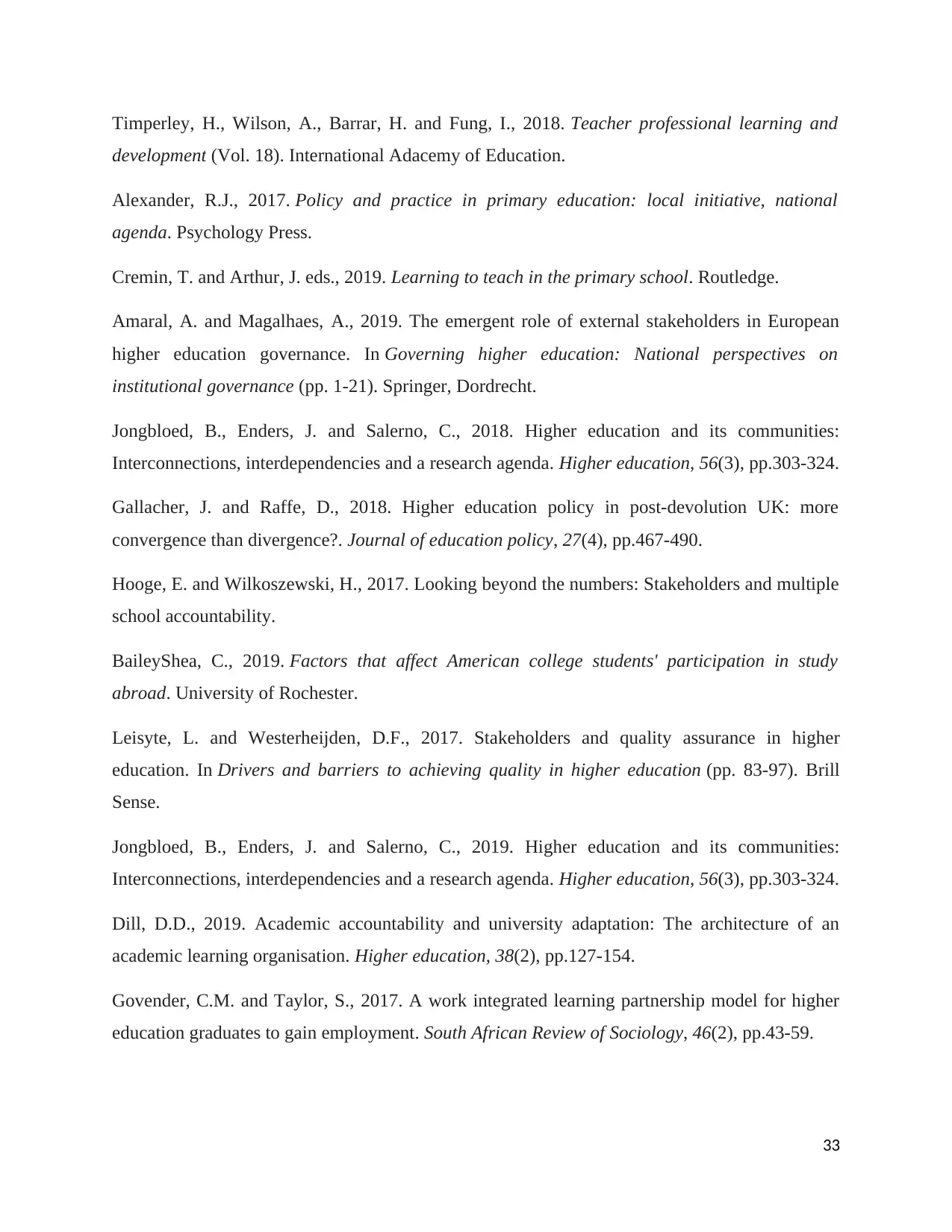
Timperley, H., Wilson, A., Barrar, H. and Fung, I., 2018. Teacher professional learning and
development (Vol. 18). International Adacemy of Education.
Alexander, R.J., 2017. Policy and practice in primary education: local initiative, national
agenda. Psychology Press.
Cremin, T. and Arthur, J. eds., 2019. Learning to teach in the primary school. Routledge.
Amaral, A. and Magalhaes, A., 2019. The emergent role of external stakeholders in European
higher education governance. In Governing higher education: National perspectives on
institutional governance (pp. 1-21). Springer, Dordrecht.
Jongbloed, B., Enders, J. and Salerno, C., 2018. Higher education and its communities:
Interconnections, interdependencies and a research agenda. Higher education, 56(3), pp.303-324.
Gallacher, J. and Raffe, D., 2018. Higher education policy in post-devolution UK: more
convergence than divergence?. Journal of education policy, 27(4), pp.467-490.
Hooge, E. and Wilkoszewski, H., 2017. Looking beyond the numbers: Stakeholders and multiple
school accountability.
BaileyShea, C., 2019. Factors that affect American college students' participation in study
abroad. University of Rochester.
Leisyte, L. and Westerheijden, D.F., 2017. Stakeholders and quality assurance in higher
education. In Drivers and barriers to achieving quality in higher education (pp. 83-97). Brill
Sense.
Jongbloed, B., Enders, J. and Salerno, C., 2019. Higher education and its communities:
Interconnections, interdependencies and a research agenda. Higher education, 56(3), pp.303-324.
Dill, D.D., 2019. Academic accountability and university adaptation: The architecture of an
academic learning organisation. Higher education, 38(2), pp.127-154.
Govender, C.M. and Taylor, S., 2017. A work integrated learning partnership model for higher
education graduates to gain employment. South African Review of Sociology, 46(2), pp.43-59.
33
development (Vol. 18). International Adacemy of Education.
Alexander, R.J., 2017. Policy and practice in primary education: local initiative, national
agenda. Psychology Press.
Cremin, T. and Arthur, J. eds., 2019. Learning to teach in the primary school. Routledge.
Amaral, A. and Magalhaes, A., 2019. The emergent role of external stakeholders in European
higher education governance. In Governing higher education: National perspectives on
institutional governance (pp. 1-21). Springer, Dordrecht.
Jongbloed, B., Enders, J. and Salerno, C., 2018. Higher education and its communities:
Interconnections, interdependencies and a research agenda. Higher education, 56(3), pp.303-324.
Gallacher, J. and Raffe, D., 2018. Higher education policy in post-devolution UK: more
convergence than divergence?. Journal of education policy, 27(4), pp.467-490.
Hooge, E. and Wilkoszewski, H., 2017. Looking beyond the numbers: Stakeholders and multiple
school accountability.
BaileyShea, C., 2019. Factors that affect American college students' participation in study
abroad. University of Rochester.
Leisyte, L. and Westerheijden, D.F., 2017. Stakeholders and quality assurance in higher
education. In Drivers and barriers to achieving quality in higher education (pp. 83-97). Brill
Sense.
Jongbloed, B., Enders, J. and Salerno, C., 2019. Higher education and its communities:
Interconnections, interdependencies and a research agenda. Higher education, 56(3), pp.303-324.
Dill, D.D., 2019. Academic accountability and university adaptation: The architecture of an
academic learning organisation. Higher education, 38(2), pp.127-154.
Govender, C.M. and Taylor, S., 2017. A work integrated learning partnership model for higher
education graduates to gain employment. South African Review of Sociology, 46(2), pp.43-59.
33
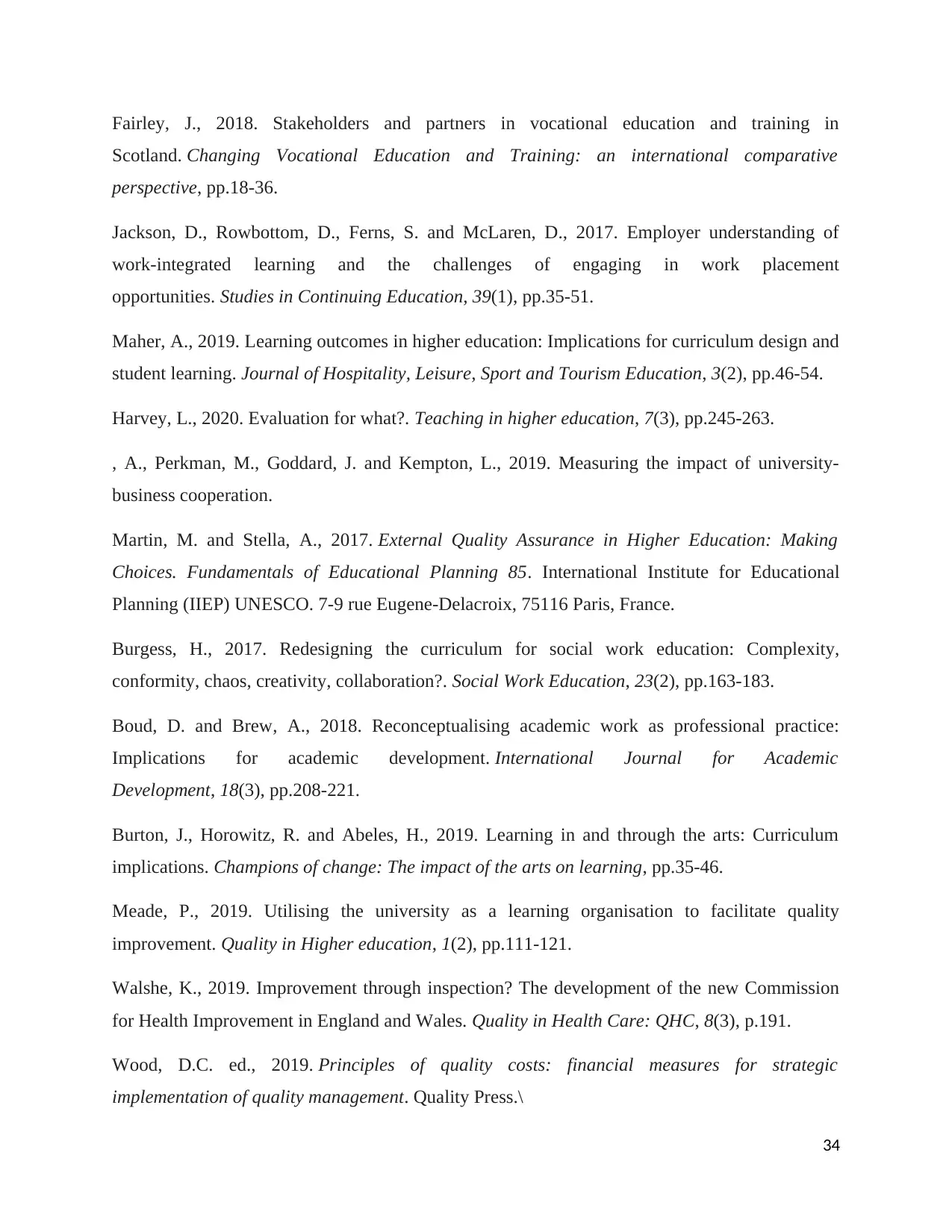
Fairley, J., 2018. Stakeholders and partners in vocational education and training in
Scotland. Changing Vocational Education and Training: an international comparative
perspective, pp.18-36.
Jackson, D., Rowbottom, D., Ferns, S. and McLaren, D., 2017. Employer understanding of
work-integrated learning and the challenges of engaging in work placement
opportunities. Studies in Continuing Education, 39(1), pp.35-51.
Maher, A., 2019. Learning outcomes in higher education: Implications for curriculum design and
student learning. Journal of Hospitality, Leisure, Sport and Tourism Education, 3(2), pp.46-54.
Harvey, L., 2020. Evaluation for what?. Teaching in higher education, 7(3), pp.245-263.
, A., Perkman, M., Goddard, J. and Kempton, L., 2019. Measuring the impact of university-
business cooperation.
Martin, M. and Stella, A., 2017. External Quality Assurance in Higher Education: Making
Choices. Fundamentals of Educational Planning 85. International Institute for Educational
Planning (IIEP) UNESCO. 7-9 rue Eugene-Delacroix, 75116 Paris, France.
Burgess, H., 2017. Redesigning the curriculum for social work education: Complexity,
conformity, chaos, creativity, collaboration?. Social Work Education, 23(2), pp.163-183.
Boud, D. and Brew, A., 2018. Reconceptualising academic work as professional practice:
Implications for academic development. International Journal for Academic
Development, 18(3), pp.208-221.
Burton, J., Horowitz, R. and Abeles, H., 2019. Learning in and through the arts: Curriculum
implications. Champions of change: The impact of the arts on learning, pp.35-46.
Meade, P., 2019. Utilising the university as a learning organisation to facilitate quality
improvement. Quality in Higher education, 1(2), pp.111-121.
Walshe, K., 2019. Improvement through inspection? The development of the new Commission
for Health Improvement in England and Wales. Quality in Health Care: QHC, 8(3), p.191.
Wood, D.C. ed., 2019. Principles of quality costs: financial measures for strategic
implementation of quality management. Quality Press.\
34
Scotland. Changing Vocational Education and Training: an international comparative
perspective, pp.18-36.
Jackson, D., Rowbottom, D., Ferns, S. and McLaren, D., 2017. Employer understanding of
work-integrated learning and the challenges of engaging in work placement
opportunities. Studies in Continuing Education, 39(1), pp.35-51.
Maher, A., 2019. Learning outcomes in higher education: Implications for curriculum design and
student learning. Journal of Hospitality, Leisure, Sport and Tourism Education, 3(2), pp.46-54.
Harvey, L., 2020. Evaluation for what?. Teaching in higher education, 7(3), pp.245-263.
, A., Perkman, M., Goddard, J. and Kempton, L., 2019. Measuring the impact of university-
business cooperation.
Martin, M. and Stella, A., 2017. External Quality Assurance in Higher Education: Making
Choices. Fundamentals of Educational Planning 85. International Institute for Educational
Planning (IIEP) UNESCO. 7-9 rue Eugene-Delacroix, 75116 Paris, France.
Burgess, H., 2017. Redesigning the curriculum for social work education: Complexity,
conformity, chaos, creativity, collaboration?. Social Work Education, 23(2), pp.163-183.
Boud, D. and Brew, A., 2018. Reconceptualising academic work as professional practice:
Implications for academic development. International Journal for Academic
Development, 18(3), pp.208-221.
Burton, J., Horowitz, R. and Abeles, H., 2019. Learning in and through the arts: Curriculum
implications. Champions of change: The impact of the arts on learning, pp.35-46.
Meade, P., 2019. Utilising the university as a learning organisation to facilitate quality
improvement. Quality in Higher education, 1(2), pp.111-121.
Walshe, K., 2019. Improvement through inspection? The development of the new Commission
for Health Improvement in England and Wales. Quality in Health Care: QHC, 8(3), p.191.
Wood, D.C. ed., 2019. Principles of quality costs: financial measures for strategic
implementation of quality management. Quality Press.\
34
Secure Best Marks with AI Grader
Need help grading? Try our AI Grader for instant feedback on your assignments.
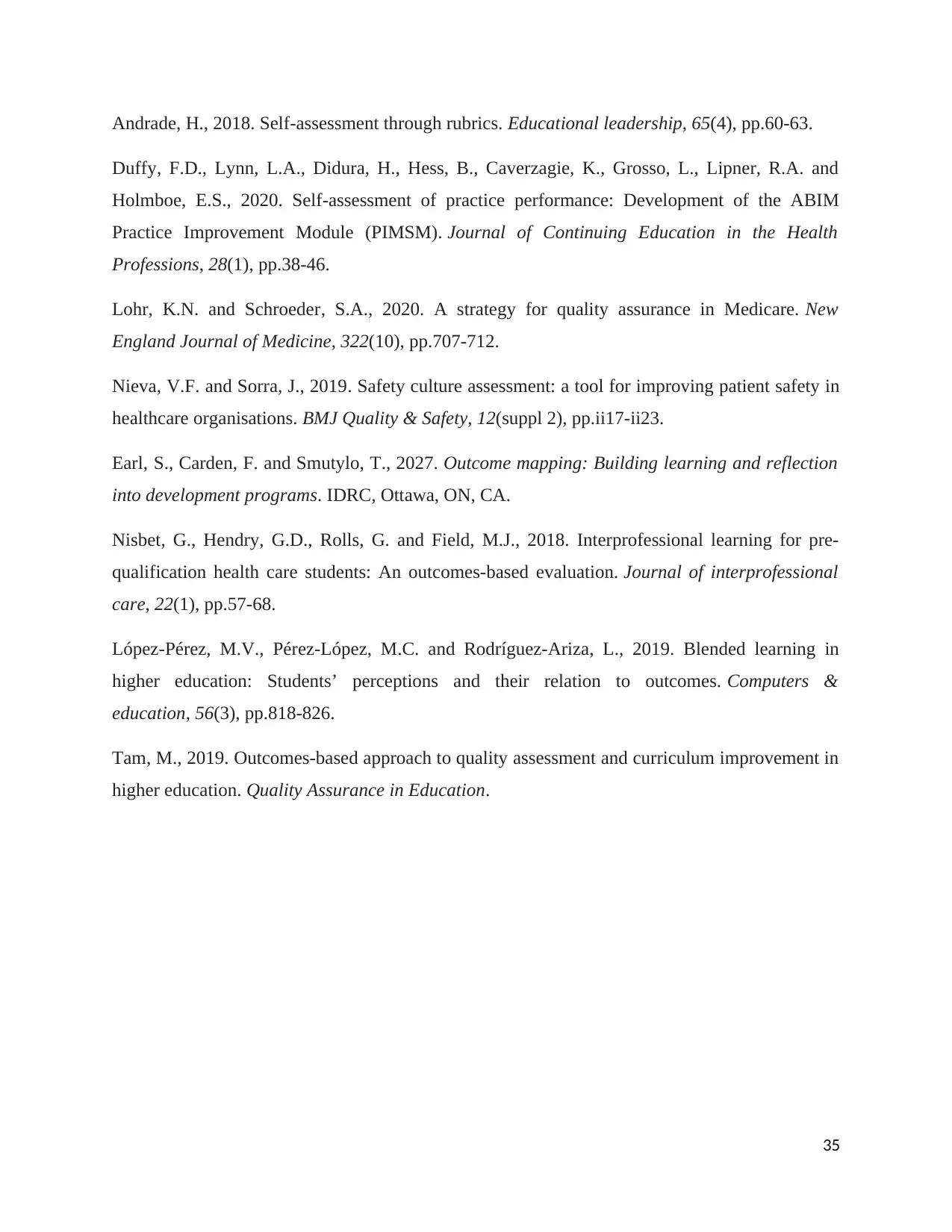
Andrade, H., 2018. Self-assessment through rubrics. Educational leadership, 65(4), pp.60-63.
Duffy, F.D., Lynn, L.A., Didura, H., Hess, B., Caverzagie, K., Grosso, L., Lipner, R.A. and
Holmboe, E.S., 2020. Self‐assessment of practice performance: Development of the ABIM
Practice Improvement Module (PIMSM). Journal of Continuing Education in the Health
Professions, 28(1), pp.38-46.
Lohr, K.N. and Schroeder, S.A., 2020. A strategy for quality assurance in Medicare. New
England Journal of Medicine, 322(10), pp.707-712.
Nieva, V.F. and Sorra, J., 2019. Safety culture assessment: a tool for improving patient safety in
healthcare organisations. BMJ Quality & Safety, 12(suppl 2), pp.ii17-ii23.
Earl, S., Carden, F. and Smutylo, T., 2027. Outcome mapping: Building learning and reflection
into development programs. IDRC, Ottawa, ON, CA.
Nisbet, G., Hendry, G.D., Rolls, G. and Field, M.J., 2018. Interprofessional learning for pre-
qualification health care students: An outcomes-based evaluation. Journal of interprofessional
care, 22(1), pp.57-68.
López-Pérez, M.V., Pérez-López, M.C. and Rodríguez-Ariza, L., 2019. Blended learning in
higher education: Students’ perceptions and their relation to outcomes. Computers &
education, 56(3), pp.818-826.
Tam, M., 2019. Outcomes-based approach to quality assessment and curriculum improvement in
higher education. Quality Assurance in Education.
35
Duffy, F.D., Lynn, L.A., Didura, H., Hess, B., Caverzagie, K., Grosso, L., Lipner, R.A. and
Holmboe, E.S., 2020. Self‐assessment of practice performance: Development of the ABIM
Practice Improvement Module (PIMSM). Journal of Continuing Education in the Health
Professions, 28(1), pp.38-46.
Lohr, K.N. and Schroeder, S.A., 2020. A strategy for quality assurance in Medicare. New
England Journal of Medicine, 322(10), pp.707-712.
Nieva, V.F. and Sorra, J., 2019. Safety culture assessment: a tool for improving patient safety in
healthcare organisations. BMJ Quality & Safety, 12(suppl 2), pp.ii17-ii23.
Earl, S., Carden, F. and Smutylo, T., 2027. Outcome mapping: Building learning and reflection
into development programs. IDRC, Ottawa, ON, CA.
Nisbet, G., Hendry, G.D., Rolls, G. and Field, M.J., 2018. Interprofessional learning for pre-
qualification health care students: An outcomes-based evaluation. Journal of interprofessional
care, 22(1), pp.57-68.
López-Pérez, M.V., Pérez-López, M.C. and Rodríguez-Ariza, L., 2019. Blended learning in
higher education: Students’ perceptions and their relation to outcomes. Computers &
education, 56(3), pp.818-826.
Tam, M., 2019. Outcomes-based approach to quality assessment and curriculum improvement in
higher education. Quality Assurance in Education.
35
1 out of 35
Related Documents
Your All-in-One AI-Powered Toolkit for Academic Success.
+13062052269
info@desklib.com
Available 24*7 on WhatsApp / Email
![[object Object]](/_next/static/media/star-bottom.7253800d.svg)
Unlock your academic potential
© 2024 | Zucol Services PVT LTD | All rights reserved.
